Release 2 (9.2)
Part Number A96591-01
Home |
Book List |
Contents |
Index |
 Master Index |
 Feedback |
| Oracle9i Application Developer's Guide - Large Objects (LOBs) Release 2 (9.2) Part Number A96591-01 |
|
In this chapter we discuss each operation on External LOBs (such as "Reading Data from a BFILE") in terms of a use case. Table 12-1, "Use Case Model: External LOBs (BFILEs)" lists all the use cases.
Each External LOB (BFILE) use case is described as follows:
Table 12-1, "Use Case Model: External LOBs (BFILEs)" indicates with + where examples are provided for specific use cases and in which programmatic environment (see Chapter 3, "LOB Support in Different Programmatic Environments" for a complete discussion and references to related manuals).
Programmatic environment abbreviations used in the following table, are as follows:
| Use Case and Page | P | O | B | C | V | J |
|---|---|---|---|---|---|---|
|
S |
S |
S |
S |
S |
S |
|
|
S |
S |
S |
S |
S |
S |
|
|
S |
S |
S |
S |
S |
S |
|
|
S |
+ |
+ |
+ |
+ |
+ |
|
|
S |
S |
S |
S |
S |
S |
|
|
+ |
+ |
+ |
+ |
+ |
+ |
|
|
S |
S |
S |
S |
S |
S |
|
|
+ |
+ |
+ |
+ |
+ |
+ |
|
|
+ |
- |
- |
- |
- |
- |
|
|
+ |
- |
- |
- |
- |
- |
|
|
- |
- |
- |
- |
- |
- |
|
|
+ |
+ |
- |
- |
- |
+ |
|
|
+ |
+ |
+ |
+ |
+ |
+ |
|
|
- |
- |
- |
- |
- |
- |
|
|
+ |
+ |
- |
- |
- |
+ |
|
|
+ |
+ |
+ |
+ |
+ |
+ |
|
|
+ |
+ |
+ |
+ |
+ |
+ |
|
|
+ |
+ |
+ |
+ |
+ |
+ |
|
|
+ |
- |
+ |
+ |
+ |
+ |
|
|
+ |
- |
+ |
+ |
+ |
+ |
|
|
+ |
- |
+ |
+ |
- |
+ |
|
|
+ |
+ |
+ |
+ |
+ |
+ |
|
|
+ |
+ |
+ |
+ |
+ |
+ |
|
|
+ |
+ |
+ |
+ |
- |
+ |
|
|
- |
+ |
- |
+ |
- |
- |
|
|
Determining If One LOB Locator for a BFILE Is Equal to Another |
- |
+ |
- |
+ |
- |
+ |
|
+ |
+ |
+ |
+ |
+ |
+ |
|
|
S |
S |
S |
S |
S |
S |
|
|
S |
S |
S |
S |
S |
S |
|
|
+ |
+ |
+ |
+ |
+ |
+ |
|
|
+ |
+ |
- |
- |
+ |
+ |
|
|
+ |
+ |
+ |
+ |
+ |
+ |
|
|
+ |
+ |
+ |
+ |
+ |
+ |
|
|
S |
S |
S |
S |
S |
S |
To access external LOBs (BFILEs) use one of the following interfaces:
| See Also:
Chapter 3, "LOB Support in Different Programmatic Environments" for information about the six interfaces used to access external LOBs (BFILEs) and their available functions. |
The DIRECTORY object facilitates administering access and usage of BFILEs in an Oracle Server (see CREATE DIRECTORY in Oracle9i SQL Reference). A DIRECTORY specifies a logical alias name for a physical directory on the server's file system under which the file to be accessed is located. You can access a file in the server's file system only if granted the required access privilege on DIRECTORY object.
DIRECTORY object also provides the flexibility to manage the locations of the files, instead of forcing you to hardcode the absolute path names of physical files in your applications. A DIRECTORY alias is used in conjunction with the BFILENAME() function, in SQL and PL/SQL, or the OCILobFileSetName(), in OCI for initializing a BFILE locator.
To associate an operating system (OS) file to a BFILE, first create a DIRECTORY object which is an alias for the full path name to the operating system file.
To associate existing operating system files with relevant database records of a particular table use Oracle SQL DML (Data Manipulation Language). For example:
INSERT to initialize a BFILE column to point to an existing file in the server's file systemUPDATE to change the reference target of the BFILEBFILE to NULL and then update it later to refer to an operating system file using the BFILENAME() function.OCILobFileSetName() to initialize a BFILE locator variable that is then used in the VALUES clause of an INSERT statement.The following statements associate the files Image1.gif and image2.gif with records having key_value of 21 and 22 respectively. 'IMG' is a DIRECTORY object that represents the physical directory under which Image1.gif and image2.gif are stored.
|
Note: You may need to set up data structures similar to the following for certain examples to work: CREATE TABLE Lob_table ( Key_value NUMBER NOT NULL, F_lob BFILE) |
INSERT INTO Lob_table VALUES (21, BFILENAME('IMG', 'Image1.gif')); INSERT INTO Lob_table VALUES (22, BFILENAME('IMG', 'image2.gif'));
The following UPDATE statement changes the target file to image3.gif for the row with key_value 22.
UPDATE Lob_table SET f_lob = BFILENAME('IMG', 'image3.gif') WHERE Key_value = 22;
BFILENAME() is a built-in function that is used to initialize the BFILE column to point to the external file.
Once physical files are associated with records using SQL DML, subsequent read operations on the BFILE can be performed using PL/SQL DBMS_LOB package and OCI. However, these files are read-only when accessed through BFILES, and so they cannot be updated or deleted through BFILES.
As a consequence of the reference-based semantics for BFILEs, it is possible to have multiple BFILE columns in the same record or different records referring to the same file. For example, the following UPDATE statements set the BFILE column of the row with key_value 21 in lob_table to point to the same file as the row with key_value 22.
UPDATE lob_table SET f_lob = (SELECT f_lob FROM lob_table WHERE key_value = 22) WHERE key_value = 21;
Think of BFILENAME() in terms of initialization -- it can initialize the value for the following:
This has the following advantages:
BFILE is temporary, and scoped just within the module on which you are working, you can utilize the BFILE related APIs on the variable without ever having to associate this with a column in the database.BFILE column in a server side table, initialize this column value, and then retrieve this column value using a SELECT, you save a round-trip to the server.For more information, refer to the example given for DBMS_LOB.LOADFROMFILE (see "Loading a LOB with BFILE Data").
The OCI counterpart for BFILENAME() is OCILobFileSetName(), which can be used in a similar fashion.
The naming convention for DIRECTORY objects is the same as that for tables and indexes. That is, normal identifiers are interpreted in uppercase, but delimited identifiers are interpreted as is. For example, the following statement:
CREATE DIRECTORY scott_dir AS '/usr/home/scott';
creates a directory object whose name is 'SCOTT_DIR' (in uppercase). But if a delimited identifier is used for the DIRECTORY name, as shown in the following statement
CREATE DIRECTORY "Mary_Dir" AS '/usr/home/mary';
the directory object's name is 'Mary_Dir'. Use 'SCOTT_DIR' and 'Mary_Dir' when calling BFILENAME(). For example:
BFILENAME('SCOTT_DIR', 'afile') BFILENAME('Mary_Dir', 'afile')
On Windows NT, for example, the directory names are case-insensitive. Therefore the following two statements refer to the same directory:
CREATE DIRECTORY "big_cap_dir" AS "g:\data\source"; CREATE DIRECTORY "small_cap_dir" AS "G:\DATA\SOURCE";
This section introduces the BFILE security model and associated SQL statements. The main SQL statements associated with BFILE security are:
CREATE and REPLACE or ALTER a DIRECTORY objectGRANT and REVOKE the READ system and object privileges on DIRECTORY objectsThe DIRECTORY object is a system owned object. For more information on system owned objects, see Oracle9i SQL Reference. Oracle9i supports two new system privileges, which are granted only to DBA:
CREATE ANY DIRECTORY -- for creating or altering the directory object creationDROP ANY DIRECTORY -- for deleting the directory objectREAD permission on the DIRECTORY object allows you to read files located under that directory. The creator of the DIRECTORY object automatically earns the READ privilege.
If you have been granted the READ permission with GRANT option, you may in turn grant this privilege to other users/roles and add them to your privilege domains.
|
Note: The |
The physical directory that it represents may or may not have the corresponding operating system privileges (read in this case) for the Oracle Server process.
It is the DBA's responsibility to ensure the following:
The privilege just implies that as far as the Oracle Server is concerned, you may read from files in the directory. These privileges are checked and enforced by the PL/SQL DBMS_LOB package and OCI APIs at the time of the actual file operations.
Refer to the Oracle9i SQL Reference for information about the following SQL DDL statements that create, replace, and drop directory objects:
Refer to the Oracle9i SQL Reference for information about the following SQL DML statements that provide security for BFILEs:
GRANT (system privilege)GRANT (object privilege)REVOKE (system privilege)REVOKE (object privilege)AUDIT (new statements)AUDIT (schema objects)Catalog views are provided for DIRECTORY objects to enable users to view object names and corresponding paths and privileges. Supported views are:
ALL_DIRECTORIES (OWNER, DIRECTORY_NAME, DIRECTORY_PATH)
This view describes all directories accessible to the user.
DBA_DIRECTORIES(OWNER, DIRECTORY_NAME, DIRECTORY_PATH)
This view describes all directories specified for the entire database.
The main goal of the DIRECTORY feature is to enable a simple, flexible, non-intrusive, yet secure mechanism for the DBA to manage access to large files in the server file system. But to realize this goal, it is very important that the DBA follow these guidelines when using DIRECTORY objects:
DIRECTORY should not be mapped to physical directories that contain Oracle data files, control files, log files, and other system files. Tampering with these files (accidental or otherwise) could corrupt the database or the server operating system.CREATE ANY DIRECTORY (granted to the DBA initially) should be used carefully and not granted to other users indiscriminately. In most cases, only the database administrator should have these privileges.WITH GRANT OPTION clause when granting privileges to users.DIRECTORY objects should not be arbitrarily dropped or replaced when the database is in operation. If this were to happen, operations from all sessions on all files associated with this directory object will fail. Further, if a DROP or REPLACE command is executed before these files could be successfully closed, the references to these files will be lost in the programs, and system resources associated with these files will not be released until the session(s) is shut down.
The only recourse left to PL/SQL users, for example, will be to either execute a program block that calls DBMS_LOB.FILECLOSEALL() and restart their file operations, or exit their sessions altogether. Hence, it is imperative that you use these commands with prudence, and preferably during maintenance downtimes.
DIRECTORY object using the REVOKE statement causes all subsequent operations on dependent files from the user's session to fail. Either you must re-acquire the privileges to close the file, or execute a FILECLOSEALL() in the session and restart the file operations.In general, using DIRECTORY objects for managing file access is an extension of system administration work at the operating system level. With some planning, files can be logically organized into suitable directories that have READ privileges for the Oracle process.
DIRECTORY objects can be created with READ privileges that map to these physical directories, and specific database users granted access to these directories.
Oracle9i does not support session migration for BFILEs in Shared Server (Multi-Threaded Server -- MTS) mode. This implies that operations on open BFILEs can persist beyond the end of a call to a shared server.
In shared server sessions, BFILE operations will be bound to one shared server, they cannot migrate from one server to another. This restriction will be removed in a forthcoming release.
For BFILEs, the value is stored in a server-side operating system file; in other words, external to the database. The BFILE locator that refers to that file is stored in the row.
If a BFILE locator variable that is used in a DBMS_LOB.FILEOPEN() (for example L1) is assigned to another locator variable, (for example L2), both L1 and L2 point to the same file. This means that two rows in a table with a BFILE column can refer to the same file or to two distinct files -- a fact that the canny developer might turn to advantage, but which could well be a pitfall for the unwary.
A BFILE locator variable behaves like any other automatic variable. With respect to file operations, it behaves like a file descriptor available as part of the standard I/O library of most conventional programming languages. This implies that once you define and initialize a BFILE locator, and open the file pointed to by this locator, all subsequent operations until the closure of this file must be done from within the same program block using this locator or local copies of this locator.
BFILE locator variable can be used, just as any scalar, as a parameter to other procedures, member methods, or external function callouts. However, it is recommended that you open and close a file from the same program block at the same nesting level.BFILE, you must set the BFILE value before flushing the object to the database, thereby inserting a new row. In other words, you must call OCILobFileSetName() after OCIObjectNew() and before OCIObjectFlush().INSERT or UPDATE a BFILE without indicating a directory alias and filename.
This rule also applies to users using an OCI bind variable for a BFILE in an insert/update statement. The OCI bind variable must be initialized with a directory alias and filename before issuing the insert or update statement.
Before using SQL to insert or update a row with a BFILE, the user must initialize the BFILE to one of the following:
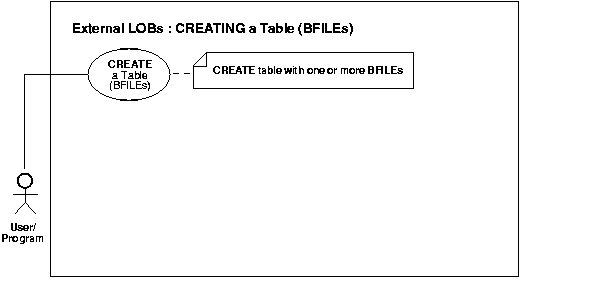
This procedure describes how to create a table containing one or more BFILE columns.
SQL Data Definition Language (DDL) is used to define BFILE columns in a table and BFILE attributes in an object type.
Use the following syntax references:
The heart of our hypothetical application is the table Print_media. The varied types that make up the columns of this table make it possible to collect together the many different kinds of elements used in printed media.
The following example is provided in SQL and applies to all programmatic environments:
You may need to set up the following data structures for certain examples in this chapter to work:
/* Setup script for creating Print_media, Online_media and associated structures */ Rem The HR and OE Schema need to be created before you create the PM Schema Rem For a detailed listing of the pm_drop.sql and pm_main.sql scripts see Rem the manual, Oracle9i Sample Schemas. DROP USER pm CASCADE; DROP DIRECTORY ADPHOTO_DIR; DROP DIRECTORY ADCOMPOSITE_DIR; DROP DIRECTORY ADGRAPHIC_DIR; DROP INDEX onlinemedia CASCADE CONSTRAINTS; DROP INDEX printmedia CASCADE CONSTRAINTS; DROP TABLE online_media CASCADE CONSTRAINTS; DROP TABLE print_media CASCADE CONSTRAINTS; DROP TYPE textdoc_typ; DROP TYPE textdoc_tab; DROP TYPE adheader_typ; DROP TABLE adheader_typ; CREATE USER pm; GRANT CONNECT, RESOURCE to pm; CREATE DIRECTORY ADPHOTO_DIR AS '/tmp/'; CREATE DIRECTORY ADCOMPOSITE_DIR AS '/tmp/'; CREATE DIRECTORY ADGRAPHIC_DIR AS '/tmp/'; CREATE DIRECTORY media_dir AS '/tmp/'; GRANT READ ON DIRECTORY ADPHOTO_DIR to pm; GRANT READ ON DIRECTORY ADCOMPOSITE_DIR to pm; GRANT READ ON DIRECTORY ADGRAPHIC_DIR to pm; GRANT READ ON DIRECTORY media_dir to pm; CONNECT pm/pm (or &pass); COMMIT; CREATE TABLE a_table (blob_col BLOB); CREATE TYPE adheader_typ AS OBJECT ( header_name VARCHAR2(256), creation_date DATE, header_text VARCHAR(1024), logo BLOB ); CREATE TYPE textdoc_typ AS OBJECT ( document_typ VARCHAR2(32), formatted_doc BLOB); CREATE TYPE Textdoc_ntab AS TABLE of textdoc_typ; CREATE TABLE Adheader_tab of adheader_typ ( header_name VARCHAR2(256) CONSTRAINT hname CHECK (hname IS NOT NULL), creation_date DATE DEFAULT NULL, logo DEFAULT EMPTY_BLOB() ); CREATE TABLE online_media ( product_id NUMBER(6), product_photo ORDSYS.ORDImage, product_photo_signature ORDSYS.ORDImageSignature, product_thumbnail ORDSYS.ORDImage, product_video ORDSYS.ORDVideo, product_audio ORDSYS.ORDAudio, product_text CLOB, product_testimonials ORDSYS.ORDDoc); CREATE UNIQUE INDEX onlinemedia_pk ON online_media (product_id); ALTER TABLE online_media ADD (CONSTRAINT onlinemedia_pk PRIMARY KEY (product_id), CONSTRAINT loc_c_id_fk FOREIGN KEY (product_id) REFERENCES oe.product_information(product_id) ); CREATE TABLE print_media (product_id NUMBER(6), ad_id NUMBER(6), ad_composite BLOB, ad_sourcetext CLOB, ad_finaltext CLOB, ad_fktextn NCLOB, ad_testdocs_ntab textdoc_tab, ad_photo BLOB, ad_graphic BFILE, ad_header adheader_typ, press_release LONG) NESTED TABLE ad_textdocs_ntab STORE AS textdocs_nestedtab; CREATE UNIQUE INDEX printmedia_pk ON print_media (product_id, ad_id); ALTER TABLE print_media ADD (CONSTRAINT printmedia_pk PRIMARY KEY (product_id, ad_id), CONSTRAINT printmedia_fk FOREIGN KEY (product_id) REFERENCES oe.product_information(product_id) );
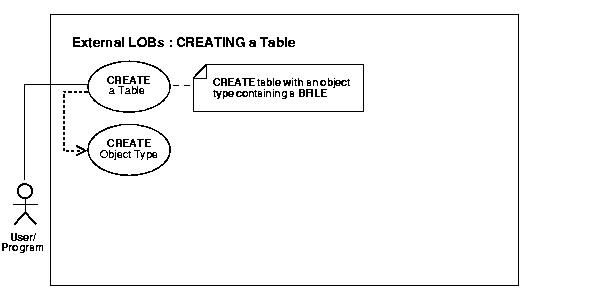
This procedure describes how to create a table of an object type with a BFILE attribute.
As shown in the diagram, you must create the object type that contains the BFILE attributes before you can proceed to create a table that makes use of that object type. SQL Data Definition Language (DDL) is used to define BFILE columns in a table and BFILE attributes in an object type.
Use the following syntax references:
Note that NCLOBs cannot be attributes of an object type.
Our example application contains examples of two different ways in which object types can contain BFILEs:
Multimedia_tab contains a column Voiced_ref that references row objects in the table VoiceOver_tab which is based on the type Voiced_typ. This type contains two kinds of LOBs -- a CLOB to store the script that's read by the actor, and a BFILE to hold the audio recording.Multimedia_tab contains column Map_obj that contains column objects of the type Map_typ. This type utilizes the BFILE datatype for storing aerial pictures of the region.The following example is provided in SQL and applies to all programmatic environments:
/* Create type Voiced_typ as a basis for tables that can contain recordings of voice-over readings using SQL DDL: */ CREATE TYPE Voiced_typ AS OBJECT ( Originator VARCHAR2(30), Script CLOB, Actor VARCHAR2(30), Take NUMBER, Recording BFILE ); /* Create table Voiceover_tab Using SQL DDL: */ CREATE TABLE Voiceover_tab OF Voiced_typ ( Script DEFAULT EMPTY_CLOB(), CONSTRAINT Take CHECK (Take IS NOT NULL), Recording DEFAULT NULL ); /* Create Type Map_typ using SQL DDL as a basis for the table that will contain the column object: */ CREATE TYPE Map_typ AS OBJECT ( Region VARCHAR2(30), NW NUMBER, NE NUMBER, SW NUMBER, SE NUMBER, Drawing BLOB, Aerial BFILE ); /* Create support table MapLib_tab as an archive of maps using SQL DDL: */ CREATE TABLE Map_tab of MapLib_typ;
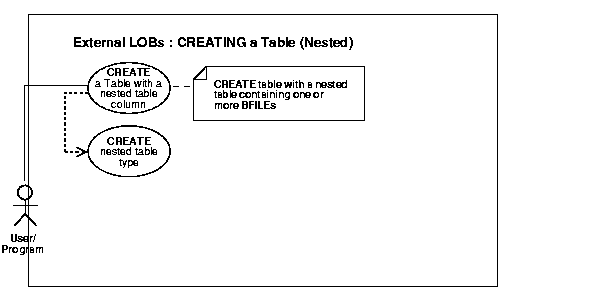
This procedure describes how to create a table with nested table containing a BFILE.
As shown in the use case diagram, you must create the object type that contains BFILE attributes before you create a nested table that uses that object type. SQL Data Definition Language (DDL) is used to define BFILE columns in a table and BFILE attributes in an object type.
Use the following syntax references:
In our example, Print_media table contains a nested table ad_textdoc_ntab that includes type textdoc_typ. This type makes use of two LOB datatypes -- a BFILE for graphic images of products, and a BLOB for formatted documents.
We have already described how to create a table with BFILE columns (see "Creating a Table Containing One or More BFILE Columns"), so here we only describe the SQL syntax for creating the underlying object type.
The following example is provided in SQL and applies to all programmatic environments:
Because you use SQL DDL directly to create a table, the DBMS_LOB package is not relevant.
CREATE TYPE textdoc_typ AS OBJECT ( document_typ VARCHAR2(32), formatted_doc BLOB); CREATE TYPE Textdoc_ntab AS TABLE of textdoc_typ; /* Embedding the nested table is accomplished when the structure of the containing table is defined. Using the PM sample schema, this is done by adding the following clause to the end of the CREATE Print_media statement: */ NESTED TABLE ad_textdocs_ntab STORE AS textdocs_nestedtab;
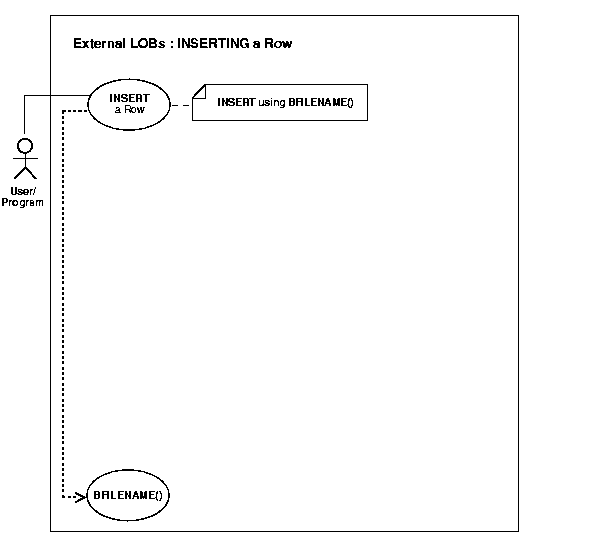
This procedure describes how to insert a row using BFILENAME().
Call BFILENAME() function as part of an INSERT to initialize a BFILE column or attribute for a particular row, by associating it with a physical file in the server's file system.
Although DIRECTORY object, represented by the directory_alias parameter to BFILENAME(), need not already be defined before BFILENAME() is called by a SQL or PL/SQL program, the DIRECTORY object and operating system file must exist by the time you actually use the BFILE locator. For example, when used as a parameter to one of the following operations:
OCILobFileOpen()DBMS_LOB.FILEOPEN()OCILobOpen()DBMS_LOB.OPEN()
You can use BFILENAME() in the following ways to initialize a BFILE column:
You can use BFILENAME() to initialize a BFILE locator variable in one of the programmatic interface programs, and use that locator for file operations. However, if the corresponding directory alias or filename does not exist then PL/SQL DBMS_LOB or other relevant routines that use this variable, will generate errors.
The directory_alias parameter in the BFILENAME() function must be specified taking case-sensitivity of the directory name into consideration.
See Chapter 3, "LOB Support in Different Programmatic Environments" for a list of available functions in each programmatic environment. See the following syntax references for each programmatic environment:
The following examples illustrate how to insert a row using BFILENAME().
Examples are provided in the following six programmatic environments:
/* Inserting a row using BFILENAME(). [Example script: 3945.sql] Note that this is the same INSERT statement as applied to internal persistent LOBs but with the BFILENAME() function added to initialize the BFILE columns: */ INSERT INTO Print_media VALUES (3106, 13001, EMPTY_BLOB(), EMPTY_CLOB(), EMPTY_CLOB(), EMPTY_CLOB(), NULL, EMPTY_BLOB(), BFILENAME('AD_GRAPHIC_DIR', '3106_keyboard'), NULL, "Your press release text goes here");
/* Inserting a row using BFILENAME. [Example script: 3946.c] */ void insertUsingBfilename(svchp, stmthp, errhp) OCISvcCtx *svchp; OCIStmt *stmthp; OCIError *errhp; { text *insstmt = (text *) "INSERT INTO Print_media VALUES (3060, 11001, EMPTY_BLOB(), \ EMPTY_CLOB(), EMPTY_CLOB(), EMPTY_CLOB(), \ (SELECT REF(ad) FROM Textdoc_ntab ad WHERE document_typ = `PDF`), \ EMPTY_BLOB(), BFILENAME ('ADGRAPHIC_DIR','monitor_3060_11001'), \ (SELECT REF(adhead) FROM Adheader_typ Adhead \ WHERE creation_date = `1-20-2001'), \ "PRESS RELEASE \ Date of Press Release: January 11, 2001 \ Contact Information: Shelley and Co., Oracle Corporation, 500 Oracle Parkway, \ Redwood City, CA 94065 \" Disclaimer: This product, product name, and information is fictitious and has \ been composed to illustrate the functionality of Oracle products. \ Any similarity to existing products or product names is coincidental. \ TIGER2 3060 Monitor ..... an Exceptional Visual Experience! \ Oracle announces its return to manufacturing hardware and computer peripherals! \ The first model to have completed rigorous usability and stress tests is the \ TIGER2 +3060 17-Inch CRT MONITOR with its cousin the TIGER2 3060a 17-inch \ Flatscreen." \ )"; /* Prepare the SQL statement */ checkerr (errhp, OCIStmtPrepare(stmthp, errhp, insstmt, (ub4) strlen((char *) insstmt), (ub4) OCI_NTV_SYNTAX, (ub4)OCI_DEFAULT)); /* Execute the SQL statement */ checkerr (errhp, OCIStmtExecute(svchp, stmthp, errhp, (ub4) 1, (ub4) 0, (CONST OCISnapshot*) 0, (OCISnapshot*) 0, (ub4) OCI_DEFAULT)); }
* Inserting a row using BFILENAME() [Example script: 3947.pco] IDENTIFICATION DIVISION. PROGRAM-ID. BFILE-INSERT. ENVIRONMENT DIVISION. DATA DIVISION. WORKING-STORAGE SECTION. 01 USERID PIC X(11) VALUES "SAMP/SAMP". 01 ORASLNRD PIC 9(4). EXEC SQL INCLUDE SQLCA END-EXEC. EXEC ORACLE OPTION (ORACA=YES) END-EXEC. EXEC SQL INCLUDE ORACA END-EXEC. PROCEDURE DIVISION. BFILE-INSERT. EXEC SQL WHENEVER SQLERROR DO PERFORM SQL-ERROR END-EXEC. EXEC SQL CONNECT :USERID END-EXEC. EXEC SQL INSERT INTO PRINT_MEDIA (PRODUCT_ID, AD_GRAPHIC) VALUES (1, BFILENAME('ADGRAPHIC_DIR', 'KEYBOARD_310_13001')) END-EXEC. EXEC SQL ROLLBACK WORK RELEASE END-EXEC. STOP RUN. SQL-ERROR. EXEC SQL WHENEVER SQLERROR CONTINUE END-EXEC. MOVE ORASLNR TO ORASLNRD. DISPLAY " ". DISPLAY "ORACLE ERROR DETECTED ON LINE ", ORASLNRD, ":". DISPLAY " ". DISPLAY SQLERRMC. EXEC SQL ROLLBACK WORK RELEASE END-EXEC. STOP RUN.
/* Inserting a row using BFILENAME(). [Example script: 3948.pc] */ #include <oci.h> #include <stdio.h> #include <sqlca.h> void Sample_Error() { EXEC SQL WHENEVER SQLERROR CONTINUE; printf("%.*s\n", sqlca.sqlerrm.sqlerrml, sqlca.sqlerrm.sqlerrmc); EXEC SQL ROLLBACK WORK RELEASE; exit(1); } void BFILENAMEInsert_proc() { EXEC SQL WHENEVER SQLERROR DO Sample_Error(); EXEC SQL WHENEVER NOT FOUND CONTINUE; /* Delete any existing row: */ EXEC SQL DELETE FROM Print_media WHERE product_id = 2056 AND ad_id = 12001; /* Insert a new row using the BFILENAME() function for BFILEs: */ EXEC SQL INSERT INTO Print_media VALUES (2056, 12001, EMPTY_BLOB(), EMPTY_CLOB(), EMPTY_CLOB(), EMPTY_CLOB(), ad_textdocs(textdoc_typ(PDF, EMPTY_BLOB())), EMPTY_BLOB(), BFILENAME('ADGRAPHIC_DIR', 'mousepad_2056_12001'), NULL, `You Can't Beat this Mousepad for Ergonomic Value!!') ; printf("Inserted %d row\n", sqlca.sqlerrd[2]); } void main() { char *samp = "samp/samp"; EXEC SQL CONNECT :samp; BFILENAMEInsert_proc(); EXEC SQL ROLLBACK WORK RELEASE; }
'Inserting a row using BFILENAME(). [Example script: 3949.txt] Dim OraDyn as OraDynaset, OraAdGraphic as OraBFile Set OraDyn = OraDb.CreateDynaset("select * from Print_media", ORADYN_DEFAULT) Set OraAdGraphic = OraDyn.Fields("ad_graphic").Value OraDyn.AddNew OraDyn.Fields("product_id").value = 3060 OraDyn.Fields("ad_sourcetext").value = Empty 'This is equivalent to EMPTY_CLOB() in SQL OraDyn.Fields("fltextn").value = Empty 'Initialize BFile Data: OraAdGraphic.DirectoryName = "ADGRAPHIC_DIR" OraAdGraphic.FileName = "monitor_graphic_3060_11001" OraDyn.Fields("ad_composite").Value = Empty OraDyn.Fields("ad_photo").Value = Empty OraDyn.Update 'Add the row to the table
// Inserting a row using BFILENAME(). [Example script: 3951.java] import java.io.InputStream; import java.io.OutputStream; // Core JDBC classes: import java.sql.DriverManager; import java.sql.Connection; import java.sql.Statement; import java.sql.PreparedStatement; import java.sql.ResultSet; import java.sql.SQLException; // Oracle Specific JDBC classes: import oracle.sql.*; import oracle.jdbc.driver.*; public class Ex4_21 { public static void main (String args []) throws Exception { // Load the Oracle JDBC driver: DriverManager.registerDriver(new oracle.jdbc.driver.OracleDriver()); // Connect to the database: Connection conn = DriverManager.getConnection ("jdbc:oracle:oci8:@", "samp", "samp"); conn.setAutoCommit (false); // Create a Statement: Statement stmt = conn.createStatement (); try { stmt.execute("INSERT INTO Print_media " +"VALUES (3060, 11001, EMPTY_BLOB(), EMPTY_CLOB(), " +" EMPTY_CLOB(), EMPTY_CLOB()," +"(SELECT REF(ad) FROM Textdoc_ntab ad" +" WHERE document_typ = `PDF`)," +"EMPTY_BLOB(), BFILENAME ('AD_GRAPHIC','monitor_3060'), " +"(SELECT REF(adhead) FROM Adheader_typ Adhead" +" WHERE creation_date = `1-20-2001'), " +"PRESS RELEASE \" +"Date of Press Release: January 11, 2001 \" +"Contact Information: Any name,Oracle Corporation, 500 Oracle Parkway," +"Redwood City, CA 94065 \" +"Disclaimer: This product, product name, and information is fictitious and has" been" +"composed to illustrate the functionality of Oracle products. \" +"Any similarity to existing products or product names is coincidental. \" +"TIGER2 3060 Monitor ..... an Exceptional Visual Experience! \" +"Oracle announces its return to manufacturing hardware and computer peripherals! \" +"The first model to have completed rigorous usability and stress tests is the" +"TIGER2 +3060 17-Inch CRT MONITOR with its cousin the TIGER2 3060a 17-inch" +"Flatscreen. \" +"Its initial offering is for $150 and its suggested retail value is $299. \" ); // Commit the transaction: conn.commit(); stmt.close(); conn.close(); } catch (SQLException e) { e.printStackTrace(); } } }
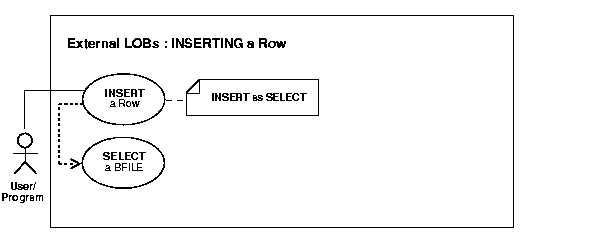
This procedure describes how to INSERT a row containing a BFILE by selecting a BFILE from another table.
With regard to LOBs, one of the advantages of utilizing an object-relational approach is that you can define a type as a common template for related tables. For instance, it makes sense that both the tables that store archival material and the working tables that use those libraries share a common structure. See the following "Scenario".
|
Note: Before you insert, you must initialize the |
See the following syntax reference:
The following code fragment is based on the fact that a library table VoiceoverLib_tab is of the same type (Voiced_typ) as Voiceover_tab referenced by column Voiced_ref of Multimedia_tab table.
It inserts values from the library table into Multimedia_tab by means of a SELECT.
The example is provided in SQL and applies to all programmatic environments:
INSERT INTO Voiceover_tab (SELECT * from VoiceoverLib_tab WHERE Take = 12345);
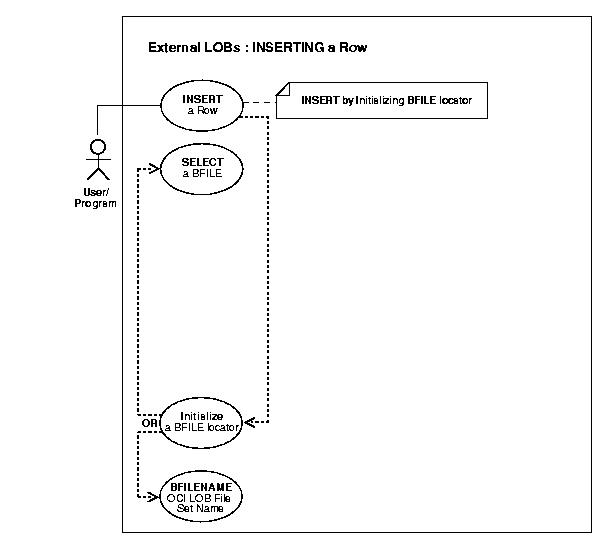
This procedure describes how to INSERT a row containing a BFILE by initializing a BFILE locator.
|
Note: You must initialize the |
|
Note: Before you insert, you must initialize the |
See Chapter 3, "LOB Support in Different Programmatic Environments" for a list of available functions in each programmatic environment. See the following syntax references for each programmatic environment:
In these examples we insert an ad_graphic from an operating system source file (ADGRAPHIC_DIR).
Examples in the following programmatic environments are provided:
/* Inserting row containing a BFILE by initializing a BFILE locator [Example script: 3953.sql] */ DECLARE /* Initialize the BFILE locator: */ Lob_loc BFILE := BFILENAME('ADGRAPHIC_DIR', 'keyboard_graphic_3106_13001'); BEGIN INSERT INTO Print_media (product_id, ad_id, ad_graphic) VALUES (3106, 13001, Lob_loc); COMMIT; END;
/* Inserting a row by initializing a BFILE Locator. [Example script: 3954.c] */ void insertUsingBfileLocator(envhp, svchp, stmthp, errhp) OCIEnv *envhp; OCISvcCtx *svchp; OCIStmt *stmthp; OCIError *errhp; { text *insstmt = (text *) "INSERT INTO Print_media (product_id, ad_graphic) \ VALUES (2056, :Lob_loc)"; OCIBind *bndhp; OCILobLocator *Lob_loc; OraText *Dir = (OraText *)"ADGRAPHIC_DIR", *Name = (OraText *)"mousepad_2056_ 12001"; /* Prepare the SQL statement: */ checkerr (errhp, OCIStmtPrepare(stmthp, errhp, insstmt, (ub4) strlen((char *) insstmt), (ub4) OCI_NTV_SYNTAX, (ub4)OCI_DEFAULT)); /* Allocate Locator resources: */ (void) OCIDescriptorAlloc((dvoid *) envhp, (dvoid **) &Lob_loc, (ub4)OCI_DTYPE_FILE, (size_t) 0, (dvoid **) 0); checkerr (errhp, OCILobFileSetName(envhp, errhp, &Lob_loc, Dir, (ub2)strlen((char *)Dir), Name,(ub2)strlen((char *)Name))); checkerr (errhp, OCIBindByPos(stmthp, &bndhp, errhp, (ub4) 1, (dvoid *) &Lob_loc, (sb4) 0, SQLT_BFILE, (dvoid *) 0, (ub2 *)0, (ub2 *)0, (ub4) 0, (ub4 *) 0, (ub4) OCI_DEFAULT)); /* Execute the SQL statement: */ checkerr (errhp, OCIStmtExecute(svchp, stmthp, errhp, (ub4) 1, (ub4) 0, (CONST OCISnapshot*) 0, (OCISnapshot*) 0, (ub4) OCI_DEFAULT)); /* Free LOB resources: */ OCIDescriptorFree((dvoid *) Lob_loc, (ub4) OCI_DTYPE_FILE); }
COBOL (Pro*COBOL): Inserting a Row Containing a BFILE by Initializing a BFILE Locator
* Inserting a row containing a BFILE by initializing a BFILE * [Example script: 3955.pco] IDENTIFICATION DIVISION. PROGRAM-ID. BFILE-INSERT-INIT. ENVIRONMENT DIVISION. DATA DIVISION. WORKING-STORAGE SECTION. 01 USERID PIC X(11) VALUES "SAMP/SAMP". 01 TEMP-BLOB SQL-BLOB. 01 SRC-BFILE SQL-BFILE. 01 DIR-ALIAS PIC X(30) VARYING. 01 FNAME PIC X(20) VARYING. 01 DIR-IND PIC S9(4) COMP. 01 FNAME-IND PIC S9(4) COMP. 01 AMT PIC S9(9) COMP. 01 ORASLNRD PIC 9(4). EXEC SQL INCLUDE SQLCA END-EXEC. EXEC ORACLE OPTION (ORACA=YES) END-EXEC. EXEC SQL INCLUDE ORACA END-EXEC. PROCEDURE DIVISION. BFILE-INSERT-INIT. EXEC SQL WHENEVER SQLERROR DO PERFORM SQL-ERROR END-EXEC. EXEC SQL CONNECT :USERID END-EXEC. * Allocate and initialize the BFILE locator: EXEC SQL ALLOCATE :SRC-BFILE END-EXEC. * Set up the directory and file information: MOVE "ADGRAPHIC_DIR" TO DIR-ALIAS-ARR. MOVE 9 TO DIR-ALIAS-LEN. MOVE "keyboard_graphic_3106_13001" TO FNAME-ARR. MOVE 16 TO FNAME-LEN. * Set the directory alias and filename in locator: EXEC SQL LOB FILE SET :SRC-BFILE DIRECTORY = :DIR-ALIAS, FILENAME = :FNAME END-EXEC. EXEC SQL INSERT INTO PRINT_MEDIA (PRODUCT_ID, AD_GRAPHIC) VALUES (3106, :SRC-BFILE)END-EXEC. EXEC SQL ROLLBACK WORK END-EXEC. EXEC SQL FREE :SRC-BFILE END-EXEC. STOP RUN. SQL-ERROR. EXEC SQL WHENEVER SQLERROR CONTINUE END-EXEC. MOVE ORASLNR TO ORASLNRD. DISPLAY " ". DISPLAY "ORACLE ERROR DETECTED ON LINE ", ORASLNRD, ":". DISPLAY " ". DISPLAY SQLERRMC. EXEC SQL ROLLBACK WORK RELEASE END-EXEC. STOP RUN.
/* Inserting a row containing a BFILE by initializing a BFILE */ /* [Example script: 3958.pc] */ #include <oci.h> #include <stdio.h> #include <sqlca.h> void Sample_Error() { EXEC SQL WHENEVER SQLERROR CONTINUE; printf("%.*s\n", sqlca.sqlerrm.sqlerrml, sqlca.sqlerrm.sqlerrmc); EXEC SQL ROLLBACK WORK RELEASE; exit(1); } void insertBFILELocator_proc() { OCIBFileLocator *Lob_loc; char *Dir = "ADGRAPHIC_DIR", *Name = "mousepad_graphic_2056_12001"; EXEC SQL WHENEVER SQLERROR DO Sample_Error(); /* Allocate the input Locator: */ EXEC SQL ALLOCATE :Lob_loc; /* Set the Directory and Filename in the Allocated (Initialized) Locator: */ EXEC SQL LOB FILE SET :Lob_loc DIRECTORY = :Dir, FILENAME = :Name; EXEC SQL INSERT INTO Print_media (Product_ID, ad_graphic) VALUES (2056, :Lob_ loc); /* Release resources held by the Locator: */ EXEC SQL FREE :Lob_loc; } void main() { char *samp = "samp/samp"; EXEC SQL CONNECT :samp; insertBFILELocator_proc(); EXEC SQL ROLLBACK WORK RELEASE; } }
Visual Basic (OO4O): Inserting a Row Containing a BFILE by Initializing a BFILE Locator
' Inserting a row containing a BFILE by initializing a BFILE. ' [Example script: 3959.txt] Dim OraDyn as OraDynaset, OraPhoto as OraBFile, OraMusic as OraBFile Set OraDyn = OraDb.CreateDynaset("select * from Print_media", ORADYN_DEFAULT) Set OraMusic = OraDyn.Fields("ad_graphic").Value 'Edit the first row and initiliaze the "ad_graphic" column: OraDyn.Edit OraPhoto.DirectoryName = "ADGRAPHIC_DIR" OraPhoto.Filename = "mousepad_graphic_2056_12001" OraDyn.Update
// Inserting a row containing a BFILE by initializing a BFILE. // [Example script: 3960.java] // Java IO classes: import java.io.InputStream; import java.io.OutputStream; // Core JDBC classes: import java.sql.DriverManager; import java.sql.Connection; import java.sql.Statement; import java.sql.PreparedStatement; import java.sql.ResultSet; import java.sql.SQLException; // Oracle Specific JDBC classes: import oracle.sql.*; import oracle.jdbc.driver.*; public class Ex4_26 { public static void main (String args []) throws Exception { // Load the Oracle JDBC driver: DriverManager.registerDriver(new oracle.jdbc.driver.OracleDriver()); // Connect to the database: Connection conn = DriverManager.getConnection ("jdbc:oracle:oci8:@", "samp", "samp"); conn.setAutoCommit (false); // Create a Statement: Statement stmt = conn.createStatement (); try { BFILE src_lob = null; ResultSet rset = null; OracleCallableStatement cstmt = null; rset = stmt.executeQuery ( "SELECT BFILENAME('ADGRAPHIC_DIR','monitor_graphic_3060_11001') FROM DUAL"); if (rset.next()) { src_lob = ((OracleResultSet)rset).getBFILE (1); } // Prepare a CallableStatement to OPEN the LOB for READWRITE: cstmt = (OracleCallableStatement) conn.prepareCall ( "INSERT INTO Print_media (product_id, ad_graphic) VALUES (3060, ?)"); cstmt.setBFILE(1, src_lob); cstmt.execute(); //Close the statements and commit the transaction: stmt.close(); cstmt.close(); conn.commit(); conn.close(); } catch (SQLException e) { e.printStackTrace(); } } }
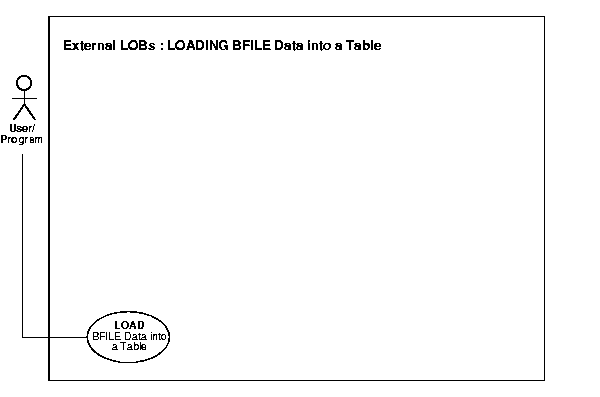
This procedure describes how to load initial data into a BFILE and the BFILE data into a table.
The BFILE datatype stores unstructured binary data in operating-system files outside the database.
A BFILE column or attribute stores a file locator that points to a server-side external file containing the data.
|
Note: A particular file to be loaded as a |
The SQL*Loader assumes that the necessary DIRECTORY objects (a logical alias name for a physical directory on the server's file system) have already been created.
| See Also:
Oracle9i Application Developer's Guide - Fundamentals for more information on BFILES. |
A control file field corresponding to a BFILE column consists of column name followed by the BFILE directive.
The BFILE directive takes as arguments a DIRECTORY object name followed by a BFILE name. Both of these can be provided as string constants, or they can be dynamically sourced through some other field.
Use the following syntax references:
The following two examples illustrate the loading of BFILES. In the first example only the file name is specified dynamically. In the second example, the BFILE and the DIRECTORY object are specified dynamically.
The following examples load data into BFILES:
LOAD DATA INFILE sample9.dat INTO TABLE Print_media FIELDS TERMINATED BY ',' (product_id INTEGER EXTERNAL(6), FileName FILLER CHAR(30), ad_graphic BFILE(CONSTANT "modem_graphic_2268_21001", FileName))
007, modem_2268.jpg, 008, monitor_3060.jpg, 009, keyboard_2056.jpg,
LOAD DATA INFILE sample10.dat INTO TABLE Print_media FIELDS TERMINATED BY ',' ( product_id INTEGER EXTERNAL(6), ad_graphic BFILE (DirName, FileName), FileName FILLER CHAR(30), DirName FILLER CHAR(30) )
007,monitor_3060.jpg,ADGRAPHIC_PHOTO, 008,modem_2268.jpg,ADGRAPHIC_PHOTO, 009,keyboard_2056.jpg,ADGRAPHIC_DIR,
|
Note:
|
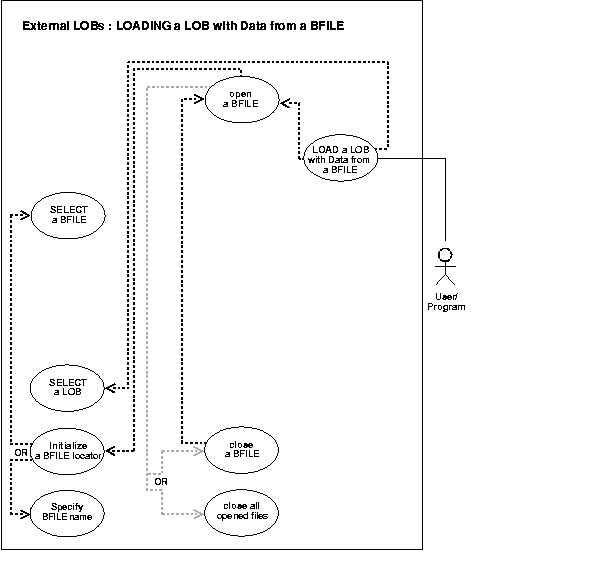
See Also:
|
This procedure describes how to load a LOB with BFILE data.
|
Note: The |
In using OCI, or any of the programmatic environments that access OCI functionality, character set conversions are implicitly performed when translating from one character set to another.
When you use the DBMS_LOB.LOADFROMFILE procedure to populate a CLOB or NCLOB, you are populating the LOB with binary data from the BFILE. No implicit translation is performed from binary data to a character set. For this reason, you should use the LOADCLOBFROMFILE procedure when loading text (see Loading a CLOB with BFILE Data).
| See Also:
Oracle9i Database Globalization Support Guide for character set conversion issues. |
amount parameter to be larger than the size of the BFILE.amount parameter to be larger than the length of the BFILE.See Chapter 3, "LOB Support in Different Programmatic Environments" for a list of available functions in each programmatic environment. Use the following syntax references for each programmatic environment:
These example procedures assume there is a directory object (ADGRAPHIC_DIR) that contains the LOB data to be loaded into the destination LOB.
Examples are provided in the following programmatic environments:
/* Loading a LOB with BFILE data. Procedure loadLOBFromBFILE_proc is not part of DBMS_LOB package: */ CREATE OR REPLACE PROCEDURE loadLOBFromBFILE_proc IS Dest_loc BLOB; Src_loc BFILE := BFILENAME('ADGRAPHIC_DIR', 'keyboard_graphic_3106_13001'); Amount INTEGER := 4000; BEGIN SELECT ad_graphic INTO Dest_loc FROM Print_media WHERE product_id = 3060 AND ad_id = 13001 FOR UPDATE; /* Opening the LOB is mandatory: */ DBMS_LOB.OPEN(Src_loc, DBMS_LOB.LOB_READONLY); /* Opening the LOB is optional: */ DBMS_LOB.OPEN(Dest_loc, DBMS_LOB.LOB_READWRITE); DBMS_LOB.LOADFROMFILE(Dest_loc, Src_loc, Amount); /* Closing the LOB is mandatory if you have opened it: */ DBMS_LOB.CLOSE(Dest_loc); DBMS_LOB.CLOSE(Src_loc); COMMIT; END;
/* Loading a LOB with BFILE data. Select the lob/bfile from the Print_media table */ void selectLob(Lob_loc, errhp, svchp, stmthp) OCILobLocator *Lob_loc; OCIError *errhp; OCISvcCtx *svchp; OCIStmt *stmthp; { char selstmt[150]; OCIDefine *dfnhp, *dfnhp2; strcpy(selstmt, (char *) "SELECT ad_photo FROM Print_media \ WHERE product_id=3106 AND ad_id = 13001 FOR UPDATE"); /* Prepare the SQL select statement */ checkerr (errhp, OCIStmtPrepare(stmthp, errhp, selstmt, (ub4) strlen((char *) selstmt), (ub4) OCI_NTV_SYNTAX, (ub4)OCI_DEFAULT)); /* Define the column being selected */ checkerr (errhp, OCIDefineByPos(stmthp, &dfnhp, errhp, 1, (dvoid *)&Lob_loc, 0 , SQLT_BLOB, (dvoid *)0, (ub2 *)0, (ub2 *)0, OCI_DEFAULT) || OCIDefineByPos(stmthp, &dfnhp2, errhp, 2, (dvoid *)&Lob_loc, 0 , SQLT_BLOB, (dvoid *)0, (ub2 *)0, (ub2 *)0, OCI_DEFAULT)); /* Execute the SQL select statement */ checkerr (errhp, OCIStmtExecute(svchp, stmthp, errhp, (ub4) 1, (ub4) 0, (CONST OCISnapshot*) 0, (OCISnapshot*) 0, (ub4) OCI_DEFAULT)); } void loadLobFromBfile(envhp, errhp, svchp, stmthp) OCIEnv *envhp; OCIError *errhp; OCISvcCtx *svchp; OCIStmt *stmthp; { OCILobLocator *dest_loc; OCILobLocator *src_loc; /* Allocate locators */ (void) OCIDescriptorAlloc((dvoid *) envhp, (dvoid **) &dest_loc, (ub4)OCI_DTYPE_FILE, (size_t) 0, (dvoid **) 0); (void) OCIDescriptorAlloc((dvoid *) envhp, (dvoid **) &src_loc, (ub4)OCI_DTYPE_FILE, (size_t) 0, (dvoid **) 0); checkerr(errhp, OCILobFileSetName(envhp, errhp, &src_loc, (text *) "ADPHOTO_DIR", (ub2) strlen("ADPHOTO_DIR"), (text *) "keyboard_photo_3106_13001", (ub2) strlen(keyboard_photo_3106_13001"))); selectLob(dest_loc, errhp, svchp, stmthp); checkerr(errhp, OCILobFileOpen(svchp, errhp, src_loc, (ub1)OCI_FILE_READONLY)); checkerr(errhp, OCILobOpen(svchp, errhp, dest_loc, (ub1)OCI_LOB_READWRITE)); checkerr (errhp, OCILobLoadFromFile(svchp, errhp, dest_loc, src_loc, (ub4)4000, (ub4)1, (ub4)1)); checkerr(errhp, OCILobClose(svchp, errhp, dest_loc)); checkerr(errhp, OCILobFileClose(svchp, errhp, src_loc)); }
* Loading a LOB with BFILE data. IDENTIFICATION DIVISION. PROGRAM-ID. LOAD-BFILE. ENVIRONMENT DIVISION. DATA DIVISION. WORKING-STORAGE SECTION. 01 USERID PIC X(11) VALUES "SAMP/SAMP". 01 DEST-BLOB SQL-BLOB. 01 SRC-BFILE SQL-BFILE. 01 DIR-ALIAS PIC X(30) VARYING. 01 FNAME PIC X(20) VARYING. 01 DIR-IND PIC S9(4) COMP. 01 FNAME-IND PIC S9(4) COMP. 01 AMT PIC S9(9) COMP. 01 ORASLNRD PIC 9(4). EXEC SQL INCLUDE SQLCA END-EXEC. EXEC ORACLE OPTION (ORACA=YES) END-EXEC. EXEC SQL INCLUDE ORACA END-EXEC. PROCEDURE DIVISION. LOAD-BFILE. * Allocate and initialize the LOB locators: EXEC SQL ALLOCATE :DEST-BLOB END-EXEC. EXEC SQL ALLOCATE :SRC-BFILE END-EXEC. * Set up the directory and file information: MOVE "ADPHOTO_DIR" TO DIR-ALIAS-ARR. MOVE 9 TO DIR-ALIAS-LEN. MOVE "keyboard_photo_3106_13001" TO FNAME-ARR. MOVE 16 TO FNAME-LEN. * Populate the BFILE: EXEC SQL WHENEVER NOT FOUND GOTO END-OF-BFILE END-EXEC. EXEC SQL SELECT AD_GRAPHIC INTO :SRC-BFILE FROM PRINT_MEDIA WHERE PRODUCT_ID = 3106 AND AD_ID = 13001 END-EXEC. * Open the source BFILE READ ONLY. * Open the destination BLOB READ/WRITE: EXEC SQL LOB OPEN :SRC-BFILE READ ONLY END-EXEC. EXEC SQL LOB OPEN :DEST-BLOB READ WRITE END-EXEC. * Load BFILE data into the BLOB: EXEC SQL LOB LOAD :AMT FROM FILE :SRC-BFILE INTO :DEST-BLOB END-EXEC. * Close the LOBs: EXEC SQL LOB CLOSE :SRC-BFILE END-EXEC. EXEC SQL LOB CLOSE :DEST-BLOB END-EXEC. * And free the LOB locators: END-OF-BFILE. EXEC SQL WHENEVER NOT FOUND CONTINUE END-EXEC. EXEC SQL FREE :DEST-BLOB END-EXEC. EXEC SQL FREE :SRC-BFILE END-EXEC. EXEC SQL ROLLBACK WORK RELEASE END-EXEC. STOP RUN. SQL-ERROR. EXEC SQL WHENEVER SQLERROR CONTINUE END-EXEC. MOVE ORASLNR TO ORASLNRD. DISPLAY " ". DISPLAY "ORACLE ERROR DETECTED ON LINE ", ORASLNRD, ":". DISPLAY " ". DISPLAY SQLERRMC. EXEC SQL ROLLBACK WORK RELEASE END-EXEC. STOP RUN.
/* Loading a LOB with BFILE data. */ #include <oci.h> #include <stdio.h> #include <sqlca.h> void Sample_Error() { EXEC SQL WHENEVER SQLERROR CONTINUE; printf("%.*s\n", sqlca.sqlerrm.sqlerrml, sqlca.sqlerrm.sqlerrmc); EXEC SQL ROLLBACK WORK RELEASE; exit(1); } void loadLOBFromBFILE_proc() { OCIBlobLocator *Dest_loc; OCIBFileLocator *Src_loc; char *Dir = "ADGRAPHIC_DIR", *Name = "mousepad_graphic_2056_12001"; int Amount = 4096; EXEC SQL WHENEVER SQLERROR DO Sample_Error(); /* Initialize the BFILE Locator: */ EXEC SQL ALLOCATE :Src_loc; EXEC SQL LOB FILE SET :Src_loc DIRECTORY = :Dir, FILENAME = :Name; /* Initialize the BLOB Locator: */ EXEC SQL ALLOCATE :Dest_loc; EXEC SQL SELECT ad_photo INTO :Dest_loc FROM Print_media WHERE Product_ID = 2056 AND AD_ID = 12001 FOR UPDATE; /* Opening the BFILE is Mandatory: */ EXEC SQL LOB OPEN :Src_loc READ ONLY; /* Opening the BLOB is Optional: */ EXEC SQL LOB OPEN :Dest_loc READ WRITE; EXEC SQL LOB LOAD :Amount FROM FILE :Src_loc INTO :Dest_loc; /* Closing LOBs and BFILEs is Mandatory if they have been OPENed: */ EXEC SQL LOB CLOSE :Dest_loc; EXEC SQL LOB CLOSE :Src_loc; /* Release resources held by the Locators: */ EXEC SQL FREE :Dest_loc; EXEC SQL FREE :Src_loc; } void main() { char *samp = "samp/samp"; EXEC SQL CONNECT :samp; loadLOBFromBFILE_proc(); EXEC SQL ROLLBACK WORK RELEASE; }
'Loading a LOB with BFILE data Dim OraDyn as OraDynaset, OraDyn2 as OraDynaset, OraAdGraphic as OraBFile Dim OraAdPhoto as OraBlob chunksize = 32767 Set OraDyn = OraDb.CreateDynaset("select * from Print_media", ORADYN_DEFAULT) Set OraAdGraphic = OraDyn.Fields("ad_graphic").Value Set OraAdPhoto = OraDyn.Fields("ad_photo").Value OraDyn.Edit 'Load LOB with data from BFILE: OraAdPhoto.CopyFromBFile (OraAdGraphic) OraDyn.Update
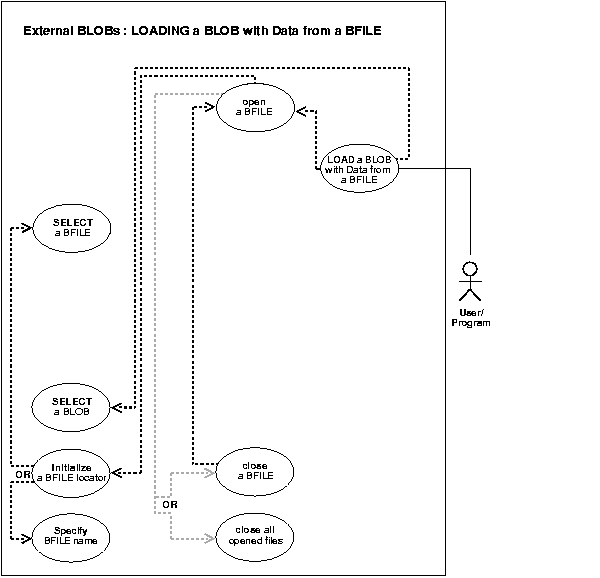
See Also:
|
This procedure describes how to load a BLOB with binary data from a BFILE. This achieves the same outcome as LOADFROMFILE as well as returning the new offsets to the user.
Use LOADBLOBFROMFILE for loading of binary data and LOADCLOBFROMFILE for text loading. Note that since this functionality does not support BFILE on the client side, the loading takes place on the server side only. The LOADCLOBFROMFILE API allows you to specify the character set id of the BFILE ensuring that the character set is properly converted from the BFILE data character set to the destination CLOB/NCLOB character set.
See Chapter 3, "LOB Support in Different Programmatic Environments" for a list of available functions in each programmatic environment. Use the following syntax references for each programmatic environment:
The example procedures in this section use the Print_media table of the Product Media sample schema and assume that there is an operating system source directory that contains the binary LOB data to be loaded into the target BLOB.
The example, "PL/SQL (DBMS_LOB Package): Loading an Internal Persistent BLOB with BFILE Data", illustrates LOADBLOBFROMFILE usage in the PL/SQL programmatic environment. (Other programmatic environments are not supported.)
The following example illustrates:
LOADBLOBFROMFILE to load the entire file without getting its length first.DECLARE src_loc BFILE := bfilename('ADVERT_DIR','display_ad_frame') ; dst_loc BLOB; src_offset NUMBER := 1; dst_offset NUMBER := 1; src_osin NUMBER; dst_osin NUMBER; bytes_rd NUMBER; bytes_wt NUMBER; BEGIN SELECT ad_composite INTO dst_loc FROM Print_media WHERE product_id=3106 and ad_id=13001 FOR UPDATE; /* Opening the source BFILE is mandatory */ dbms_lob.fileopen(src_loc, dbms_lob.file_readonly); /* Opening the LOB is optional */ dbms_lob.OPEN(dst_loc, dbms_lob.lob_readwrite); /* Save the input source/destination offsets */ src_osin := src_offset; dst_osin := dst_offset; /* Use LOBMAXSIZE to indicate loading the entire BFILE */ dbms_lob.LOADBLOBFROMFILE(dst_loc,src_loc,dbms_lob.lobmaxsize,src_offset,dst_ offset) ; /* Closing the LOB is mandatory if you have opened it */ dbms_lob.close(dst_loc); dbms_lob.filecloseall(); COMMIT; /* Use the src_offset returned to calculate the actual amount read from the BFILE */ bytes_rd := src_offset - src_osin; dbms_output.put_line(' Number of bytes read from the BFILE ' || bytes_rd ) ; /* Use the dst_offset returned to calculate the actual amount written to the BLOB */ bytes_wt := dst_offset - dst_osin; dbms_output.put_line(' Number of bytes written to the BLOB ' || bytes_wt ) ; /* If there is no exception the number of bytes read should equal to the number of bytes written */ END ;
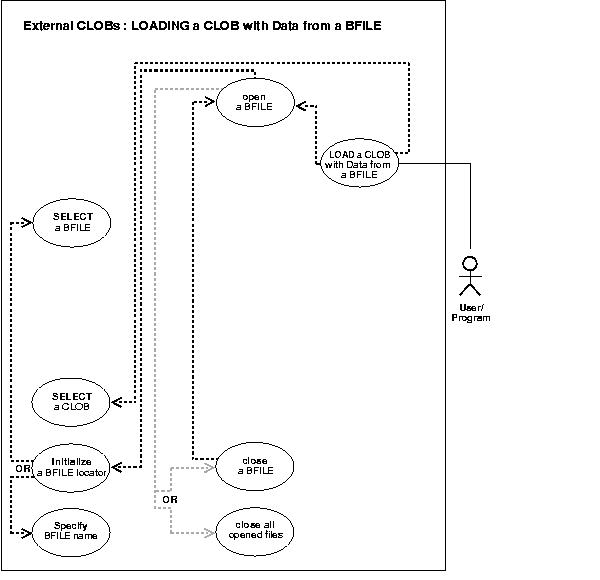
See Also:
|
This procedure describes how to load an internal persistent CLOB or NCLOB with character data from a BFILE.
Use LOADBLOBFROMFILE for loading of binary data and LOADCLOBFROMFILE for loading of text as the latter method lets you specify the character set id of the BFILE. Note that since this functionality does not support BFILE on the client side, the loading takes place on the server side only. The LOADCLOBFROMFILE API allows you to specify the character set id of the BFILE ensuring that the character set is properly converted from the BFILE data character set to the destination CLOB/NCLOB character set.
See Chapter 3, "LOB Support in Different Programmatic Environments" for a list of available functions in each programmatic environment. Use the following syntax references for each programmatic environment:
The example procedures in this section use the Print_media table of the Product Media sample schema and assume that there is an operating system source directory that contains the character LOB data to be loaded into the target CLOB or NCLOB.
The example, "PL/SQL (DBMS_LOB Package): Loading a CLOB/NCLOB with BFILE Data", illustrates LOADCLOBFROMFILE usage in the PL/SQL programmatic environment. (Other programmatic environments are not supported.)
The following example illustrates:
0).getlength for the BFILE.This example assumes that ad_source is a BFILE in UTF8 character set format and the database charset is UTF8.
DECLARE src_loc bfile := bfilename('ADVERT_DIR','ad_source_1000') ; dst_loc clob ; amt number := dbms_lob.lobmaxsize; src_offset number := 1 ; dst_offset number := 1 ; lang_ctx number := dbms_lob.default_lang_ctx; warning number; BEGIN select ad_sourcetext into dst_loc from Print_media where product_id = 3000 and ad_id = 1000 for update ; dbms_lob.fileopen(src_loc, dbms_lob.file_readonly); /* The default_csid can be used when the BFILE encoding is in the same charset * as the destination CLOB/NCLOB charset */ dbms_lob.LOADCLOBFROMFILE(dst_loc,src_loc, amt, dst_offset, src_offset, dbms_lob.default_csid, lang_ctx,warning) ; commit; dbms_output.put_line(' Amount specified ' || amt ) ; dbms_output.put_line(' Number of bytes read from source: ' || (src_offset-1)); dbms_output.put_line(' Number of characters written to destination: ' || (dst_offset-1) ); if (warning = dbms_lob.warn_inconvertible_char) then dbms_output.put_line('Warning: Inconvertible character'); end if; dbms_lob.filecloseall() ; END ;
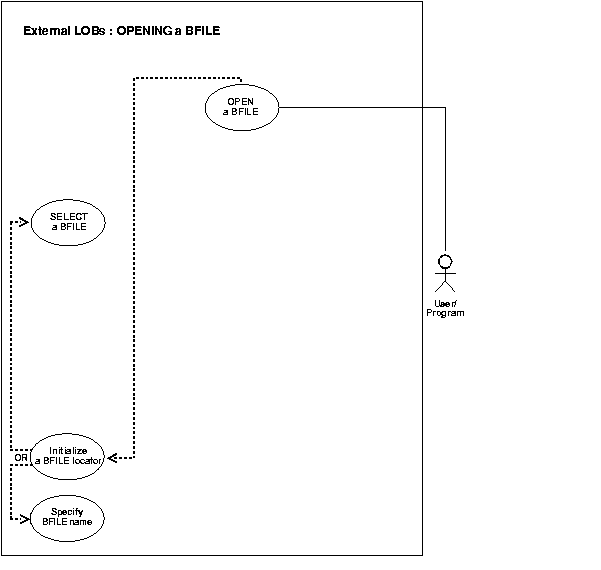
See Also:
|
Opening a BFILE using FILEOPEN is still supported; however, using OPEN is recommended for extensibility in future releases.
A limited number of BFILEs can be open simultaneously in each session. The maximum number is specified by using the initialization parameter SESSION_MAX_OPEN_FILES.
SESSION_MAX_OPEN_FILES defines an upper limit on the number of simultaneously open files in a session. The default value for this parameter is 10. That is, a maximum of 10 files can be opened simultaneously in each session if the default value is utilized. The database administrator can change the value of this parameter in the init.ora file. For example:
SESSION_MAX_OPEN_FILES=20
If the number of unclosed files exceeds the SESSION_MAX_OPEN_FILES value then you will not be able to open any more files in the session.
To close all open files, use the FILECLOSEALL call.
It is good practice to close files after use to keep the SESSION_MAX_OPEN_FILES value small. Choosing a larger value would entail a higher memory usage.
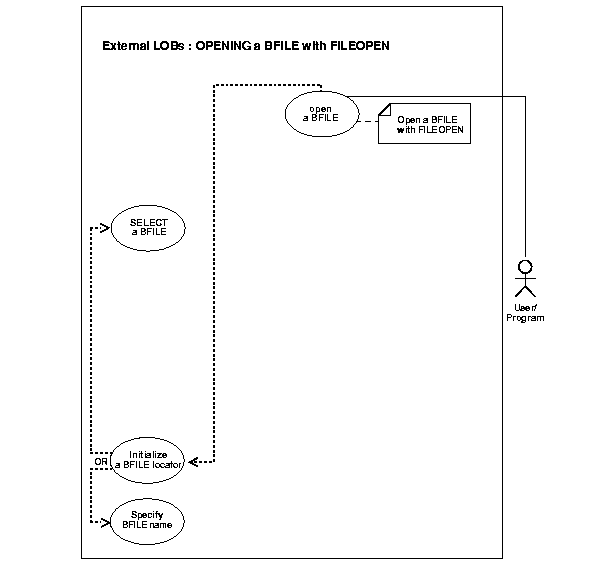
See Also:
|
This procedure describes how to open a BFILE using FILEOPEN.
While you can continue to use the older FILEOPEN form, we strongly recommend that you switch to using OPEN, because this facilitates future extensibility.
See Chapter 3, "LOB Support in Different Programmatic Environments" for a list of available functions in each programmatic environment. Use the following syntax references for each programmatic environment:
These examples open keyboard_photo3060 in operating system file ADPHOTO_DIR.
Examples are provided in the following four programmatic environments:
/* Opening a BFILE with FILEOPEN [Example script: 3973.sql] */ /* Procedure openBFILE_procOne is not part of DBMS_LOB package: */ CREATE OR REPLACE PROCEDURE openBFILE_procOne IS File_loc BFILE := BFILENAME('ADPHOTO_DIR', 'keyboard_photo3060'); BEGIN /* Open the BFILE: */ DBMS_LOB.FILEOPEN (File_loc, DBMS_LOB.FILE_READONLY); /* ... Do some processing. */ DBMS_LOB.FILECLOSE(File_loc); END;
/* Opening a BFILE with FILEOPEN */ void BfileOpen(envhp, errhp, svchp, stmthp) OCIEnv *envhp; OCIError *errhp; OCISvcCtx *svchp; OCIStmt *stmthp; { OCILobLocator *bfile_loc; /* Allocate the locator descriptor */ (void) OCIDescriptorAlloc((dvoid *) envhp, (dvoid **) &bfile_loc, (ub4) OCI_DTYPE_FILE, (size_t) 0, (dvoid **) 0); /* Set the bfile locator information */ checkerr(errhp, (OCILobFileSetName(envhp, errhp, &bfile_loc, (OraText *)"ADGRAPHIC_DIR", (ub2)strlen("ADGRAPHIC_DIR"), (OraText *)"keyboard_graphic_3106_ 13001", (ub2)strlen("keyboard_graphic_3106_ 13001")))); checkerr(errhp, OCILobFileOpen(svchp, errhp, bfile_loc, (ub1)OCI_FILE_READONLY)); /* ... Do some processing. */ checkerr(errhp, OCILobFileClose(svchp, errhp, bfile_loc)); /* Free the locator descriptor */ OCIDescriptorFree((dvoid *)bfile_loc, (ub4)OCI_DTYPE_FILE); }
|
Note: At the present time, OO4O only offers |
// Opening a BFILE with FILEOPEN import java.io.OutputStream; // Core JDBC classes: import java.sql.DriverManager; import java.sql.Connection; import java.sql.Statement; import java.sql.PreparedStatement; import java.sql.ResultSet; import java.sql.SQLException; // Oracle Specific JDBC classes: import oracle.sql.*; import oracle.jdbc.driver.*; public class Ex4_38 { public static void main (String args []) throws Exception { // Load the Oracle JDBC driver: DriverManager.registerDriver(new oracle.jdbc.driver.OracleDriver()); // Connect to the database: Connection conn = DriverManager.getConnection ("jdbc:oracle:oci8:@", "samp", "samp"); conn.setAutoCommit (false); // Create a Statement: Statement stmt = conn.createStatement (); try { BFILE src_lob = null; ResultSet rset = null; rset = stmt.executeQuery ( "SELECT BFILENAME('AD_GRAPHIC', 'monitor_3060') FROM DUAL"); if (rset.next()) { src_lob = ((OracleResultSet)rset).getBFILE (1); src_lob.openFile(); System.out.println("The file is now open"); } // Close the BFILE, statement and connection: src_lob.closeFile(); stmt.close(); conn.commit(); conn.close(); } catch (SQLException e) { e.printStackTrace(); } } }
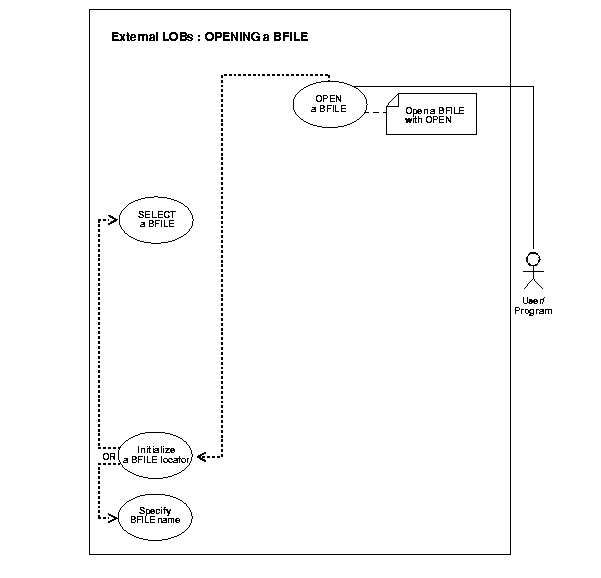
See Also:
|
This procedure describes how to open a BFILE with OPEN.
Not applicable.
See Chapter 3, "LOB Support in Different Programmatic Environments" for a list of available functions in each programmatic environment. Use the following syntax references for each programmatic environment:
These examples open an image in operating system file ADPHOTO_DIR.
Examples are provided in the following six programmatic environments:
/* Opening a BFILE with OPEN. */ /* Procedure openBFILE_procTwo is not part of DBMS_LOB package: */ CREATE OR REPLACE PROCEDURE openBFILE_procTwo IS File_loc BFILE := BFILENAME('ADPHOTO_DIR', 'keyboard_photo_3060_11001'); BEGIN /* Open the BFILE: */ DBMS_LOB.OPEN (File_loc, DBMS_LOB.LOB_READONLY); /* ... Do some processing: */ DBMS_LOB.CLOSE(File_loc); END;
/* Opening a BFILE with OPEN. */ void BfileFileOpen(envhp, errhp, svchp, stmthp) OCIEnv *envhp; OCIError *errhp; OCISvcCtx *svchp; OCIStmt *stmthp; { OCILobLocator *bfile_loc; /* Allocate the locator descriptor */ (void) OCIDescriptorAlloc((dvoid *) envhp, (dvoid **) &bfile_loc, (ub4) OCI_DTYPE_FILE, (size_t) 0, (dvoid **) 0); /* Set the Bfile Locator Information */ checkerr(errhp, (OCILobFileSetName(envhp, errhp, &bfile_loc, (OraText *)"ADGRAPHIC_DIR", (ub2)strlen("ADGRAPHIC_ DIR"), (OraText *)"keyboard_graphic_3106_13001", (ub2)strlen("keyboard_graphic_3106_13001")))); checkerr(errhp, OCILobOpen(svchp, errhp, bfile_loc, (ub1)OCI_FILE_READONLY)); /* ... Do some processing. */ checkerr(errhp, OCILobClose(svchp, errhp, bfile_loc)); /* Free the locator descriptor */ OCIDescriptorFree((dvoid *)bfile_loc, (ub4)OCI_DTYPE_FILE); }
* Opening a BFILE with OPEN. [Example script: 3978.pco] IDENTIFICATION DIVISION. PROGRAM-ID. OPEN-BFILE. ENVIRONMENT DIVISION. DATA DIVISION. WORKING-STORAGE SECTION. 01 USERID PIC X(11) VALUES "SAMP/SAMP". 01 SRC-BFILE SQL-BFILE. 01 DIR-ALIAS PIC X(30) VARYING. 01 FNAME PIC X(20) VARYING. 01 ORASLNRD PIC 9(4). EXEC SQL INCLUDE SQLCA END-EXEC. EXEC ORACLE OPTION (ORACA=YES) END-EXEC. EXEC SQL INCLUDE ORACA END-EXEC. PROCEDURE DIVISION. OPEN-BFILE. EXEC SQL WHENEVER SQLERROR DO PERFORM SQL-ERROR END-EXEC. EXEC SQL CONNECT :USERID END-EXEC. * Allocate and initialize the BFILE locator: EXEC SQL ALLOCATE :SRC-BFILE END-EXEC. * Set up the directory and file information: MOVE "ADPHOTO_DIR" TO DIR-ALIAS-ARR. MOVE 9 TO DIR-ALIAS-LEN. MOVE "keyboard_photo_3106_13001" TO FNAME-ARR. MOVE 16 TO FNAME-LEN. * Assign directory alias and file name to BFILE: EXEC SQL LOB FILE SET :SRC-BFILE DIRECTORY = :DIR-ALIAS, FILENAME = :FNAME END-EXEC. * Open the BFILE read only: EXEC SQL LOB OPEN :SRC-BFILE READ ONLY END-EXEC. * Close the LOB: EXEC SQL LOB CLOSE :SRC-BFILE END-EXEC. * And free the LOB locator: EXEC SQL FREE :SRC-BFILE END-EXEC. EXEC SQL ROLLBACK WORK RELEASE END-EXEC. STOP RUN. SQL-ERROR. EXEC SQL WHENEVER SQLERROR CONTINUE END-EXEC. MOVE ORASLNR TO ORASLNRD. DISPLAY " ". DISPLAY "ORACLE ERROR DETECTED ON LINE ", ORASLNRD, ":". DISPLAY " ". DISPLAY SQLERRMC. EXEC SQL ROLLBACK WORK RELEASE END-EXEC. STOP RUN.
/* Opening a BFILE using OPEN. [Example script: 3979.pc] In Pro*C/C++ there is only one form of OPEN used for OPENing BFILEs. There is no FILE OPEN, only a simple OPEN statement: */ #include <oci.h> #include <stdio.h> #include <sqlca.h> void Sample_Error() { EXEC SQL WHENEVER SQLERROR CONTINUE; printf("%.*s\n", sqlca.sqlerrm.sqlerrml, sqlca.sqlerrm.sqlerrmc); EXEC SQL ROLLBACK WORK RELEASE; exit(1); } void openBFILE_proc() { OCIBFileLocator *Lob_loc; char *Dir = "GRAPHIC_DIR", *Name = "mousepad_2056"; EXEC SQL WHENEVER SQLERROR DO Sample_Error(); /* Initialize the Locator: */ EXEC SQL ALLOCATE :Lob_loc; EXEC SQL LOB FILE SET :Lob_loc DIRECTORY = :Dir, FILENAME = :Name; /* Open the BFILE: */ EXEC SQL LOB OPEN :Lob_loc READ ONLY; /* ... Do some processing: */ EXEC SQL LOB CLOSE :Lob_loc; EXEC SQL FREE :Lob_loc; } void main() { char *samp = "samp/samp"; EXEC SQL CONNECT :samp; openBFILE_proc(); EXEC SQL ROLLBACK WORK RELEASE; }
'Opening a BFILE using OPEN. [Example script: 3981.txt] Dim OraDyn as OraDynaset, OraAdGraphic as OraBFile Set OraDyn = OraDb.CreateDynaset("select * from Print_media",ORADYN_DEFAULT) Set OraAdGraphic = OraDyn.Fields("ad_graphic").Value 'Go to the last row and open the Bfile for reading: OraDyn.MoveLast OraAdGraphic.Open 'Open Bfile for reading 'Do some processing: OraAdGraphic.Close
// Opening a BFILE with OPEN. [Example script: 3982.java] import java.io.InputStream; import java.io.OutputStream; // Core JDBC classes: import java.sql.DriverManager; import java.sql.Connection; import java.sql.Statement; import java.sql.PreparedStatement; import java.sql.ResultSet; import java.sql.SQLException; // Oracle Specific JDBC classes: import oracle.sql.*; import oracle.jdbc.driver.*; public class Ex4_41 { public static void main (String args []) throws Exception { // Load the Oracle JDBC driver: DriverManager.registerDriver(new oracle.jdbc.driver.OracleDriver()); // Connect to the database: Connection conn = DriverManager.getConnection ("jdbc:oracle:oci8:@", "samp", "samp"); conn.setAutoCommit (false); // Create a Statement: Statement stmt = conn.createStatement (); try { BFILE src_lob = null; ResultSet rset = null; rset = stmt.executeQuery ( "SELECT BFILENAME('ADGRAPHIC_DIR', 'monitor_graphic_3060_11001') FROM DUAL"); if (rset.next()) { src_lob = ((OracleResultSet)rset).getBFILE (1); OracleCallableStatement cstmt = (OracleCallableStatement) conn.prepareCall ("begin dbms_lob.open (?,dbms_lob.lob_readonly); end;"); cstmt.registerOutParameter(1,OracleTypes.BFILE); cstmt.setBFILE (1, src_lob); cstmt.execute(); src_lob = cstmt.getBFILE(1); System.out.println ("the file is now open"); } // Close the BFILE, statement and connection: src_lob.closeFile(); stmt.close(); conn.commit(); conn.close(); } catch (SQLException e) { e.printStackTrace(); } } }
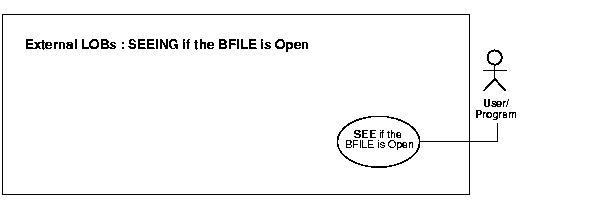
See Also:
|
As you can see by comparing the code, these alternative methods are very similar. While you can continue to use the older FILEISOPEN form, we strongly recommend that you switch to using ISOPEN, because this facilitates future extensibility.
A limited number of BFILEs can be open simultaneously in each session. The maximum number is specified by using the SESSION_MAX_OPEN_FILES initialization parameter.
SESSION_MAX_OPEN_FILES defines an upper limit on the number of simultaneously open files in a session. The default value for this parameter is 10. That is, a maximum of 10 files can be opened simultaneously in each session if the default value is utilized. The database administrator can change the value of this parameter in the init.ora file. For example:
SESSION_MAX_OPEN_FILES=20
If the number of unclosed files exceeds the SESSION_MAX_OPEN_FILES value then you will not be able to open any more files in the session. To close all open files, use the FILECLOSEALL call.
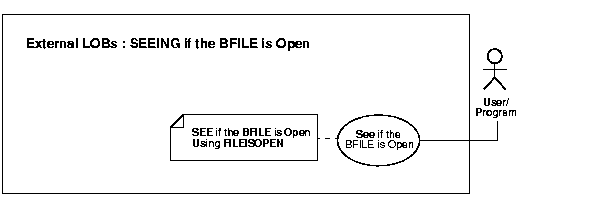
See Also:
|
This procedure describes how to see if a BFILE is OPEN with FILEISOPEN.
While you can continue to use the older FILEISOPEN form, we strongly recommend that you switch to using ISOPEN, because this facilitates future extensibility.
See Chapter 3, "LOB Support in Different Programmatic Environments" for a list of available functions in each programmatic environment. Use the following syntax references for each programmatic environment:
These examples query whether a BFILE associated with ad_graphic is open.
Examples are provided in the following programmatic environments:
/* Checking if the BFILE is OPEN with FILEISOPEN. [Example script: 3984.sql] Procedure seeIfOpenBFILE_procOne is not part of DBMS_LOB package: */ CREATE OR REPLACE PROCEDURE seeIfOpenBFILE_procOne IS File_loc BFILE; RetVal INTEGER; BEGIN /* Select the LOB, initializing the BFILE locator: */ SELECT ad_graphic INTO File_loc FROM Print_media WHERE product_ID = 3060 AND ad_id = 11001; RetVal := DBMS_LOB.FILEISOPEN(File_loc); IF (RetVal = 1) THEN DBMS_OUTPUT.PUT_LINE('File is open'); ELSE DBMS_OUTPUT.PUT_LINE('File is not open'); END IF; EXCEPTION WHEN OTHERS THEN DBMS_OUTPUT.PUT_LINE('Operation failed'); END;
/* Checking if the BFILE is open with FILEISOPEN. [Example script: 3985.c] */ /* Select the lob/bfile from the Print_media table */ void selectLob(Lob_loc, errhp, svchp, stmthp) OCILobLocator *Lob_loc; OCIError *errhp; OCISvcCtx *svchp; OCIStmt *stmthp; { OCIDefine *dfnhp, *dfnhp2; text *selstmt = (text *) "SELECT ad_graphic FROM Print_media WHERE product_id=3106 AND ad_id = 13001"; /* Prepare the SQL select statement */ checkerr (errhp, OCIStmtPrepare(stmthp, errhp, selstmt, (ub4) strlen((char *) selstmt), (ub4) OCI_NTV_SYNTAX, (ub4)OCI_DEFAULT)); /* Call define for the bfile column */ checkerr (errhp, OCIDefineByPos(stmthp, &dfnhp, errhp, 1, (dvoid *)&Lob_loc, 0 , SQLT_BFILE, (dvoid *)0, (ub2 *)0, (ub2 *)0, OCI_DEFAULT) || OCIDefineByPos(stmthp, &dfnhp2, errhp, 2, (dvoid *)&Lob_loc, 0 , SQLT_BFILE, (dvoid *)0, (ub2 *)0, (ub2 *)0, OCI_DEFAULT)); /* Execute the SQL select statement */ checkerr (errhp, OCIStmtExecute(svchp, stmthp, errhp, (ub4) 1, (ub4) 0, (CONST OCISnapshot*) 0, (OCISnapshot*) 0, (ub4) OCI_DEFAULT)); } void BfileFileIsOpen(envhp, errhp, svchp, stmthp) OCIEnv *envhp; OCIError *errhp; OCISvcCtx *svchp; OCIStmt *stmthp; { OCILobLocator *bfile_loc; boolean flag; /* Allocate the locator descriptor */ (void) OCIDescriptorAlloc((dvoid *) envhp, (dvoid **) &bfile_loc, (ub4) OCI_DTYPE_FILE, (size_t) 0, (dvoid **) 0); /* Select the bfile */ selectLob(bfile_loc, errhp, svchp, stmthp); checkerr(errhp, OCILobFileOpen(svchp, errhp, bfile_loc, (ub1)OCI_FILE_READONLY)); checkerr(errhp, OCILobFileIsOpen(svchp, errhp, bfile_loc, &flag)); if (flag == TRUE) { printf("File is open\n"); } else { printf("File is not open\n"); } checkerr(errhp, OCILobFileClose(svchp, errhp, bfile_loc)); /* Free the locator descriptor */ OCIDescriptorFree((dvoid *)bfile_loc, (ub4)OCI_DTYPE_FILE); }
|
Note: At the present time, OO4O only offers ISOPEN to test whether or not a BFILE is open (see "Visual Basic (OO4O): Checking If the BFILE is Open with FILEISOPEN"). |
// Checking if the BFEIL is open with FILEISOPEN.[Example script:3986.java] import java.io.InputStream; import java.io.OutputStream; // Core JDBC classes: import java.sql.DriverManager; import java.sql.Connection; import java.sql.Statement; import java.sql.PreparedStatement; import java.sql.ResultSet; import java.sql.SQLException; // Oracle Specific JDBC classes: import oracle.sql.*; import oracle.jdbc.driver.*; public class Ex4_45 { public static void main (String args []) throws Exception { // Load the Oracle JDBC driver: DriverManager.registerDriver(new oracle.jdbc.driver.OracleDriver()); // Connect to the database: Connection conn = DriverManager.getConnection ("jdbc:oracle:oci8:@", "samp", "samp"); conn.setAutoCommit (false); // Create a Statement: Statement stmt = conn.createStatement (); try { BFILE src_lob = null; ResultSet rset = null; boolean result = false; rset = stmt.executeQuery ( "SELECT BFILENAME('ADGRAPHIC_DIR', 'monitor_graphic_3060_11001') FROM DUAL"); if (rset.next()) { src_lob = ((OracleResultSet)rset).getBFILE (1); } result = src_lob.isFileOpen(); System.out.println( "result of fileIsOpen() before opening file : " + result); if (!result) src_lob.openFile(); result = src_lob.isFileOpen(); System.out.println( "result of fileIsOpen() after opening file : " + result); // Close the BFILE, statement and connection: src_lob.closeFile(); stmt.close(); conn.commit(); conn.close(); } catch (SQLException e) { e.printStackTrace(); } } }
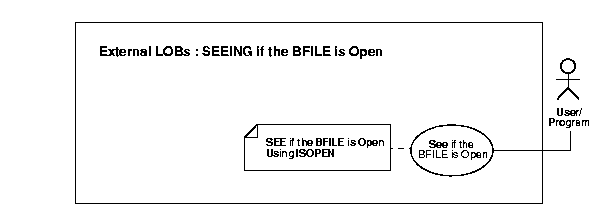
See Also:
|
This procedure describes how to see if a BFILE is open using ISOPEN.
Not applicable.
See Chapter 3, "LOB Support in Different Programmatic Environments" for a list of available functions in each programmatic environment. Use the following syntax references for each programmatic environment:
These examples query whether the a BFILE is open that is associated with ad_graphic.
Examples are provided in the following six programmatic environments:
/* Checking if the BFILE is open with ISOPEN. [Example script: 3987.sql] */ /* Procedure seeIfOpenBFILE_procTwo is not part of DBMS_LOB package: */ CREATE OR REPLACE PROCEDURE seeIfOpenBFILE_procTwo IS File_loc BFILE; RetVal INTEGER; BEGIN /* Select the LOB, initializing the BFILE locator: */ SELECT ad_graphic INTO File_loc FROM Print_media WHERE product_ID = 3060 AND ad_id = 11001; RetVal := DBMS_LOB.ISOPEN(File_loc); IF (RetVal = 1) THEN DBMS_OUTPUT.PUT_LINE('File is open'); ELSE DBMS_OUTPUT.PUT_LINE('File is not open'); END IF; EXCEPTION WHEN OTHERS THEN DBMS_OUTPUT.PUT_LINE('Operation failed'); END;
/* Checking if the BFILE is Open with ISOPEN. Example script:3988.c] */ /* Select the lob/bfile from the Print_media table */ void selectLob(Lob_loc, errhp, svchp, stmthp) OCILobLocator *Lob_loc; OCIError *errhp; OCISvcCtx *svchp; OCIStmt *stmthp; { OCIDefine *dfnhp, *dfnhp2; text *selstmt = (text *) "SELECT ad_graphic FROM Print_media WHERE product_id=3106 AND ad_id = 13001"; /* Prepare the SQL select statement */ checkerr (errhp, OCIStmtPrepare(stmthp, errhp, selstmt, (ub4) strlen((char *) selstmt), (ub4) OCI_NTV_SYNTAX, (ub4)OCI_DEFAULT)); /* Call define for the bfile column */ checkerr (errhp, OCIDefineByPos(stmthp, &dfnhp, errhp, 1, (dvoid *)&Lob_loc, 0 , SQLT_BFILE, (dvoid *)0, (ub2 *)0, (ub2 *)0, OCI_DEFAULT) || OCIDefineByPos(stmthp, &dfnhp2, errhp, 2, (dvoid *)&Lob_loc, 0 , SQLT_BFILE, (dvoid *)0, (ub2 *)0, (ub2 *)0, OCI_DEFAULT)); /* Execute the SQL select statement */ checkerr (errhp, OCIStmtExecute(svchp, stmthp, errhp, (ub4) 1, (ub4) 0, (CONST OCISnapshot*) 0, (OCISnapshot*) 0, (ub4) OCI_DEFAULT)); } void BfileIsOpen(envhp, errhp, svchp, stmthp) OCIEnv *envhp; OCIError *errhp; OCISvcCtx *svchp; OCIStmt *stmthp; { OCILobLocator *bfile_loc; boolean flag; /* Allocate the locator descriptor */ (void) OCIDescriptorAlloc((dvoid *) envhp, (dvoid **) &bfile_loc, (ub4) OCI_DTYPE_FILE, (size_t) 0, (dvoid **) 0); /* Select the bfile */ selectLob(bfile_loc, errhp, svchp, stmthp); checkerr(errhp, OCILobOpen(svchp, errhp, bfile_loc, (ub1)OCI_FILE_READONLY)); checkerr(errhp, OCILobIsOpen(svchp, errhp, bfile_loc, &flag)); if (flag == TRUE) { printf("File is open\n"); } else { printf("File is not open\n"); } checkerr(errhp, OCILobFileClose(svchp, errhp, bfile_loc)); /* Free the locator descriptor */ OCIDescriptorFree((dvoid *)bfile_loc, (ub4)OCI_DTYPE_FILE); }
* Checking if BFILE is open with ISOPEN. [Example script: 3989.pco] IDENTIFICATION DIVISION. PROGRAM-ID. OPEN-BFILE. ENVIRONMENT DIVISION. DATA DIVISION. WORKING-STORAGE SECTION. 01 USERID PIC X(11) VALUES "SAMP/SAMP". 01 SRC-BFILE SQL-BFILE. 01 DIR-ALIAS PIC X(30) VARYING. 01 FNAME PIC X(20) VARYING. 01 ORASLNRD PIC 9(4). EXEC SQL INCLUDE SQLCA END-EXEC. EXEC ORACLE OPTION (ORACA=YES) END-EXEC. EXEC SQL INCLUDE ORACA END-EXEC. PROCEDURE DIVISION. OPEN-BFILE. EXEC SQL WHENEVER SQLERROR DO PERFORM SQL-ERROR END-EXEC. EXEC SQL CONNECT :USERID END-EXEC. * Allocate and initialize the BFILE locator: EXEC SQL ALLOCATE :SRC-BFILE END-EXEC. * Set up the directory and file information: MOVE "ADPHOTO_DIR" TO DIR-ALIAS-ARR. MOVE 9 TO DIR-ALIAS-LEN. MOVE "keyboard_photo_3060_11001" TO FNAME-ARR. MOVE 16 TO FNAME-LEN. * Assign directory alias and file name to BFILE: EXEC SQL LOB FILE SET :SRC-BFILE DIRECTORY = :DIR-ALIAS, FILENAME = :FNAME END-EXEC. * Open the BFILE read only: EXEC SQL LOB OPEN :SRC-BFILE READ ONLY END-EXEC. * Close the LOB: EXEC SQL LOB CLOSE :SRC-BFILE END-EXEC. * And free the LOB locator: EXEC SQL FREE :SRC-BFILE END-EXEC. EXEC SQL ROLLBACK WORK RELEASE END-EXEC. STOP RUN. SQL-ERROR. EXEC SQL WHENEVER SQLERROR CONTINUE END-EXEC. MOVE ORASLNR TO ORASLNRD. DISPLAY " ". DISPLAY "ORACLE ERROR DETECTED ON LINE ", ORASLNRD, ":". DISPLAY " ". DISPLAY SQLERRMC. EXEC SQL ROLLBACK WORK RELEASE END-EXEC. STOP RUN.
/* Checking if the BFILE is open with ISOPEN. [Example script: 3990.pc] In Pro*C/C++, there is only one form of ISOPEN to determine whether or not a BFILE is OPEN. There is no FILEISOPEN, only a simple ISOPEN. This is an attribute used in the DESCRIBE statement: */ #include <oci.h> #include <stdio.h> #include <sqlca.h> void Sample_Error() { EXEC SQL WHENEVER SQLERROR CONTINUE; printf("%.*s\n", sqlca.sqlerrm.sqlerrml, sqlca.sqlerrm.sqlerrmc); EXEC SQL ROLLBACK WORK RELEASE; exit(1); } void seeIfOpenBFILE_proc() { OCIBFileLocator *Lob_loc; int isOpen; EXEC SQL WHENEVER SQLERROR DO Sample_Error(); EXEC SQL ALLOCATE :Lob_loc; /* Select the BFILE into the locator: */ EXEC SQL SELECT ad_graphic INTO :Lob_loc FROM Print_media WHERE product_id = 2056 AND ad_id = 12001; /* Determine if the BFILE is OPEN or not: */ EXEC SQL LOB DESCRIBE :Lob_loc GET ISOPEN into :isOpen; if (isOpen) printf("BFILE is open\n"); else printf("BFILE is not open\n"); /* Note that in this example, the BFILE is not open: */ EXEC SQL FREE :Lob_loc; } void main() { char *samp = "samp/samp"; EXEC SQL CONNECT :samp; seeIfOpenBFILE_proc(); EXEC SQL ROLLBACK WORK RELEASE; }
' Checking if the BFILE is open with ISOPEN. [Example script: 3992.txt] Dim OraDyn as OraDynaset, OraAdGraphic as OraBFile, amount_read%, chunksize%, chunk chunksize = 32767 Set OraDyn = OraDb.CreateDynaset("select * from Print_media", ORADYN_DEFAULT) Set OraAdGraphic = OraDyn.Fields("ad_graphic").Value If OraAdGraphic.IsOpen then 'Process, if the file is already open: Else 'Process, if the file is not open, and return an error: End If
// Checking if the BFILE is open with ISOPEN. [Example script: 3993.java] import java.io.InputStream; import java.io.OutputStream; // Core JDBC classes: import java.sql.DriverManager; import java.sql.Connection; import java.sql.Statement; import java.sql.PreparedStatement; import java.sql.ResultSet; import java.sql.SQLException; // Oracle Specific JDBC classes: import oracle.sql.*; import oracle.jdbc.driver.*; public class Ex4_48 { public static void main (String args []) throws Exception { // Load the Oracle JDBC driver: DriverManager.registerDriver(new oracle.jdbc.driver.OracleDriver()); // Connect to the database: Connection conn = DriverManager.getConnection ("jdbc:oracle:oci8:@", "samp", "samp"); conn.setAutoCommit (false); // Create a Statement: Statement stmt = conn.createStatement (); try { BFILE src_lob = null; ResultSet rset = null; Boolean result = null; rset = stmt.executeQuery ( "SELECT BFILENAME('ADGRAPHIC_DIR', 'monitor_graphic_3060_11001') FROM DUAL"); if (rset.next()) { src_lob = ((OracleResultSet)rset).getBFILE (1); } result = new Boolean(src_lob.isFileOpen()); System.out.println( "result of fileIsOpen() before opening file : " + result.toString()); src_lob.openFile(); result = new Boolean(src_lob.isFileOpen()); System.out.println( "result of fileIsOpen() after opening file : " + result.toString()); // Close the BFILE, statement and connection: src_lob.closeFile(); int i = cstmt.getInt(1); System.out.println("The result is: " + Integer.toString(i)); OracleCallableStatement cstmt2 = (OracleCallableStatement) conn.prepareCall ( "BEGIN DBMS_LOB.OPEN(?,DBMS_LOB.LOB_READONLY); END;"); cstmt2.setBFILE(1, bfile); cstmt2.execute(); System.out.println("The BFILE has been opened with a call to " +"DBMS_LOB.OPEN()"); // Use the existing cstmt handle to re-query the status of the locator: cstmt.setBFILE(2, bfile); cstmt.execute(); i = cstmt.getInt(1); System.out.println("This result is: " + Integer.toString(i)); stmt.close(); conn.commit(); conn.close(); } catch (SQLException e) { e.printStackTrace(); } } }
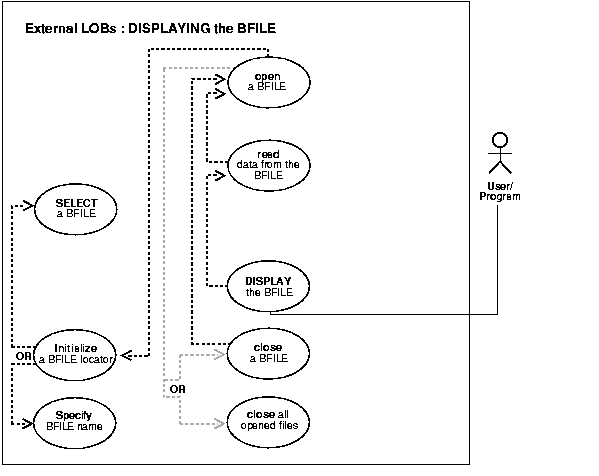
| See Also:
Table 12-1, "Use Case Model: External LOBs (BFILEs)", for all basic operations of Internal Temporary LOBs |
This procedure describes how to display BFILE data.
Not applicable.
See Chapter 3, "LOB Support in Different Programmatic Environments" for a list of available functions in each programmatic environment. Use the following syntax references for each programmatic environment:
These examples open and display BFILE data.
Examples are provided in six programmatic environments:
/* Displaying BFILE data. [Example script: 3994.sql] */ /* Procedure displayBFILE_proc is not part of DBMS_LOB package: */ CREATE OR REPLACE PROCEDURE displayBFILE_proc IS File_loc BFILE; Buffer RAW(1024); Amount BINARY_INTEGER := 1024; Position INTEGER := 1; BEGIN /* Select the LOB: */ SELECT ad_graphic INTO File_loc FROM print_media WHERE Product_ID = 3060 AND ad_id = 11001; /* Opening the BFILE: */ DBMS_LOB.OPEN (File_loc, DBMS_LOB.LOB_READONLY); LOOP DBMS_LOB.READ (File_loc, Amount, Position, Buffer); /* Display the buffer contents: */ DBMS_OUTPUT.PUT_LINE(utl_raw.cast_to_varchar2(Buffer)); Position := Position + Amount; END LOOP; /* Closing the BFILE: */ DBMS_LOB.CLOSE (File_loc); EXCEPTION WHEN NO_DATA_FOUND THEN DBMS_OUTPUT.PUT_LINE('End of data'); END;
/* Displaying BFILE data. [Example script: 3995.c] */ /* Select the lob/bfile from the Print_media table */ void selectLob(Lob_loc, errhp, svchp, stmthp) OCILobLocator *Lob_loc; OCIError *errhp; OCISvcCtx *svchp; OCIStmt *stmthp; { OCIDefine *dfnhp, *dfnhp2; text *selstmt = (text *) "SELECT ad_graphic FROM Print_media WHERE product_id=3106 AND ad_id = 13001"; /* Prepare the SQL select statement */ checkerr (errhp, OCIStmtPrepare(stmthp, errhp, selstmt, (ub4) strlen((char *) selstmt), (ub4) OCI_NTV_SYNTAX, (ub4)OCI_DEFAULT)); /* Call define for the bfile column */ checkerr (errhp, OCIDefineByPos(stmthp, &dfnhp, errhp, 1, (dvoid *)&Lob_loc, 0 , SQLT_BFILE, (dvoid *)0, (ub2 *)0, (ub2 *)0, OCI_DEFAULT) || OCIDefineByPos(stmthp, &dfnhp2, errhp, 2, (dvoid *)&Lob_loc, 0 , SQLT_BFILE, (dvoid *)0, (ub2 *)0, (ub2 *)0, OCI_DEFAULT)); /* Execute the SQL select statement */ checkerr (errhp, OCIStmtExecute(svchp, stmthp, errhp, (ub4) 1, (ub4) 0, (CONST OCISnapshot*) 0, (OCISnapshot*) 0, (ub4) OCI_DEFAULT)); } #define MAXBUFLEN 32767 void BfileDisplay(envhp, errhp, svchp, stmthp) OCIEnv *envhp; OCIError *errhp; OCISvcCtx *svchp; OCIStmt *stmthp; { /* Assume all handles passed as input to this routine have been allocated and initialized */ OCILobLocator *bfile_loc; ub1 bufp[MAXBUFLEN]; ub4 buflen, amt, offset; boolean done; ub4 retval; /* Allocate the locator descriptor */ (void) OCIDescriptorAlloc((dvoid *) envhp, (dvoid **) &bfile_loc, (ub4) OCI_DTYPE_FILE, (size_t) 0, (dvoid **) 0); /* Select the bfile */ selectLob(bfile_loc, errhp, svchp, stmthp); checkerr(errhp, OCILobFileOpen(svchp, errhp, bfile_loc, OCI_FILE_READONLY)); /* This example will READ the entire contents of a BFILE piecewise into a buffer using a standard polling method, processing each buffer piece after every READ operation until the entire BFILE has been read. */ /* Setting amt = 0 will read till the end of LOB*/ amt = 0; buflen = sizeof(bufp); /* Process the data in pieces */ offset = 1; memset(bufp, '\0', MAXBUFLEN); done = FALSE; while (!done) { retval = OCILobRead(svchp, errhp, bfile_loc, &amt, offset, (dvoid *) bufp, buflen, (dvoid *)0, (sb4 (*)(dvoid *, dvoid *, ub4, ub1)) 0, (ub2) 0, (ub1) SQLCS_IMPLICIT); switch (retval) { case OCI_SUCCESS: /* Only one piece or last piece*/ /* process the data in bufp. amt will give the amount of data just read in bufp. This is in bytes for BLOBs and in characters for fixed width CLOBS and in bytes for variable width CLOBs*/ done = TRUE; break; case OCI_ERROR: /* report_error(); this function is not shown here */ done = TRUE; break; case OCI_NEED_DATA: /* There are 2 or more pieces */ /* process the data in bufp. amt will give the amount of data just read in bufp. This is in bytes for BFILEs and i characters for fixed width CLOBS and in bytes for variable width CLOBs */ break; default: (void) printf("Unexpected ERROR: OCILobRead() LOB.\n"); done = TRUE; break; } /* switch */ } /* while */ /* Closing the BFILE is mandatory if you have opened it */ checkerr (errhp, OCILobFileClose(svchp, errhp, bfile_loc)); /* Free the locator descriptor */ OCIDescriptorFree((dvoid *)bfile_loc, (ub4)OCI_DTYPE_FILE); }
* Displaying BFILE data. [Example script: 3996.pco] IDENTIFICATION DIVISION. PROGRAM-ID. DISPLAY-BFILE. ENVIRONMENT DIVISION. DATA DIVISION. WORKING-STORAGE SECTION. 01 USERID PIC X(9) VALUES "SAMP/SAMP". EXEC SQL BEGIN DECLARE SECTION END-EXEC. 01 DEST-BLOB SQL-BLOB. 01 SRC-BFILE SQL-BFILE. 01 BUFFER PIC X(5) VARYING. 01 OFFSET PIC S9(9) COMP VALUE 1. 01 AMT PIC S9(9) COMP. 01 ORASLNRD PIC 9(4). EXEC SQL END DECLARE SECTION END-EXEC. 01 D-AMT PIC 99,999,99. EXEC SQL VAR BUFFER IS LONG RAW (100) END-EXEC. EXEC SQL INCLUDE SQLCA END-EXEC. EXEC ORACLE OPTION (ORACA=YES) END-EXEC. EXEC SQL INCLUDE ORACA END-EXEC. PROCEDURE DIVISION. DISPLAY-BFILE-DATA. * Connect to ORACLE EXEC SQL WHENEVER SQLERROR DO PERFORM SQL-ERROR END-EXEC. EXEC SQL CONNECT :USERID END-EXEC. * Allocate and initialize the BFILE locator EXEC SQL ALLOCATE :SRC-BFILE END-EXEC. * Select the BFILE EXEC SQL SELECT AD_GRAPHIC INTO :SRC-BFILE FROM PRINT_MEDIA WHERE PRODUCT_ID = 3106 AND AD_ID = 13001 END-EXEC. * Open the BFILE EXEC SQL LOB OPEN :SRC-BFILE READ ONLY END-EXEC. * Set the amount = 0 will initiate the polling method MOVE 0 TO AMT; EXEC SQL LOB READ :AMT FROM :SRC-BFILE INTO :BUFFER END-EXEC. * DISPLAY "BFILE DATA". * MOVE AMT TO D-AMT. * DISPLAY "First READ (", D-AMT, "): " BUFFER. * Do READ-LOOP until the whole BFILE is read. EXEC SQL WHENEVER NOT FOUND GO TO END-LOOP END-EXEC. READ-LOOP. EXEC SQL LOB READ :AMT FROM :SRC-BFILE INTO :BUFFER END-EXEC. * MOVE AMT TO D-AMT. * DISPLAY "Next READ (", D-AMT, "): " BUFFER. GO TO READ-LOOP. END-LOOP. EXEC SQL WHENEVER NOT FOUND CONTINUE END-EXEC. * Close the LOB EXEC SQL LOB CLOSE :SRC-BFILE END-EXEC. * And free the LOB locator EXEC SQL FREE :SRC-BFILE END-EXEC. EXEC SQL ROLLBACK RELEASE END-EXEC. STOP RUN. SQL-ERROR. EXEC SQL WHENEVER SQLERROR CONTINUE END-EXEC. MOVE ORASLNR TO ORASLNRD. DISPLAY " ". DISPLAY "ORACLE ERROR DETECTED ON LINE ", ORASLNRD, ":". DISPLAY " ". DISPLAY SQLERRMC. EXEC SQL ROLLBACK WORK RELEASE END-EXEC. STOP RUN.
/* Displaying BFILE data. [Example script: 3997.pc] This example reads the entire contents of a BFILE piecewise into a buffer using a streaming mechanism via standard polling, displaying each buffer piece after every READ operation until the entire BFILE has been read: */ #include <oci.h> #include <stdio.h> #include <sqlca.h> void Sample_Error() { EXEC SQL WHENEVER SQLERROR CONTINUE; printf("%.*s\n", sqlca.sqlerrm.sqlerrml, sqlca.sqlerrm.sqlerrmc); EXEC SQL ROLLBACK WORK RELEASE; exit(1); } #define BufferLength 1024 void displayBFILE_proc() { OCIBFileLocator *Lob_loc; int Amount; struct { short Length; char Data[BufferLength]; } Buffer; /* Datatype Equivalencing is Mandatory for this Datatype: */ EXEC SQL VAR Buffer is VARRAW(BufferLength); EXEC SQL WHENEVER SQLERROR DO Sample_Error(); EXEC SQL ALLOCATE :Lob_loc; /* Select the BFILE: */ EXEC SQL SELECT ad_graphic INTO :Lob_loc FROM Print_media WHERE Product_ID = 2056 AND ad_id = 12001; /* Open the BFILE: */ EXEC SQL LOB OPEN :Lob_loc READ ONLY; /* Setting Amount = 0 will initiate the polling method: */ Amount = 0; /* Set the maximum size of the Buffer: */ Buffer.Length = BufferLength; EXEC SQL WHENEVER NOT FOUND DO break; while (TRUE) { /* Read a piece of the BFILE into the Buffer: */ EXEC SQL LOB READ :Amount FROM :Lob_loc INTO :Buffer; printf("Display %d bytes\n", Buffer.Length); } printf("Display %d bytes\n", Amount); EXEC SQL LOB CLOSE :Lob_loc; EXEC SQL FREE :Lob_loc; } void main() { char *samp = "samp/samp"; EXEC SQL CONNECT :samp; displayBFILE_proc(); EXEC SQL ROLLBACK WORK RELEASE; }
' Displaying BFILE data. [Example script: 3999.txt] Dim MySession As OraSession Dim OraDb As OraDatabase Dim OraDyn As OraDynaset, OraAdGraphio As OraBfile, amount_read%, chunksize%, chunk As Variant Set MySession = CreateObject("OracleInProcServer.XOraSession") Set OraDb = MySession.OpenDatabase("pmschema", "pm/pm", 0&) chunksize = 32767 Set OraDyn = OraDb.CreateDynaset("select * from Print_media", ORADYN_DEFAULT) Set OraAdGraphic = OraDyn.Fields("ad_graphic").Value OraAdGraphic.offset = 1 OraAdGraphic.PollingAmount = OraAdGraphic.Size 'Read entire BFILE contents 'Open the Bfile for reading: OraAdGraphic.Open amount_read = OraAdGraphic.Read(chunk, chunksize) While OraAdGraphic.Status = ORALOB_NEED_DATA amount_read = OraAdGraphic.Read(chunk, chunksize) Wend OraAdGraphic.Close
// Displaying BFILE data. [Example script: 4000.java] import java.io.OutputStream; // Core JDBC classes: import java.sql.DriverManager; import java.sql.Connection; import java.sql.Statement; import java.sql.PreparedStatement; import java.sql.ResultSet; import java.sql.SQLException; // Oracle Specific JDBC classes: import oracle.sql.*; import oracle.jdbc.driver.*; public class Ex4_53 { public static void main (String args []) throws Exception { // Load the Oracle JDBC driver: DriverManager.registerDriver(new oracle.jdbc.driver.OracleDriver()); // Connect to the database: Connection conn = DriverManager.getConnection ("jdbc:oracle:oci8:@", "samp", "samp"); conn.setAutoCommit (false); // Create a Statement: Statement stmt = conn.createStatement (); try { BFILE src_lob = null; ResultSet rset = null; Boolean result = null; InputStream in = null; byte buf[] = new byte[1000]; int length = 0; boolean alreadyDisplayed = false; rset = stmt.executeQuery ( "SELECT ad_graphic FROM Print_media WHERE product_id = 3106 AND ad_id = 13001"); if (rset.next()) { src_lob = ((OracleResultSet)rset).getBFILE (1); } // Open the BFILE: src_lob.openFile(); // Get a handle to stream the data from the BFILE: in = src_lob.getBinaryStream(); // This loop fills the buf iteratively, retrieving data // from the InputStream: while ((in != null) && ((length = in.read(buf)) != -1)) { // the data has already been read into buf // We will only display the first CHUNK in this example: if (! alreadyDisplayed) { System.out.println("Bytes read in: " + Integer.toString(length)); System.out.println(new String(buf)); alreadyDisplayed = true; } } // Close the stream, BFILE, statement and connection: in.close(); src_lob.closeFile(); stmt.close(); conn.commit(); conn.close(); } catch (SQLException e) { e.printStackTrace(); } } }
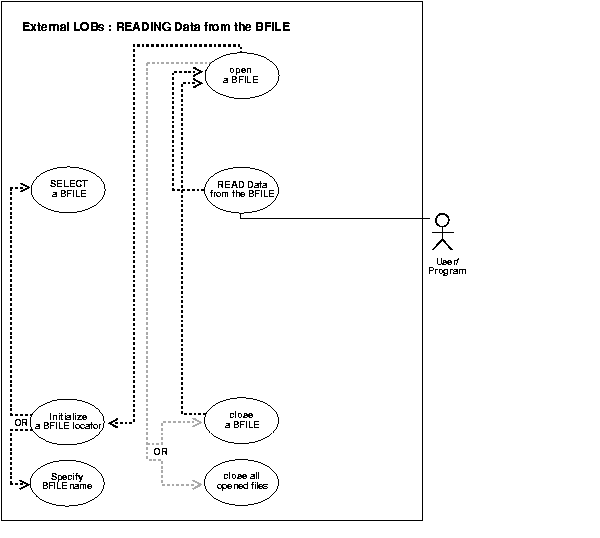
| See Also:
Table 12-1, "Use Case Model: External LOBs (BFILEs)", for all basic operations of Internal Temporary LOBs |
This procedure describes how to read data from a BFILE.
When reading the LOB value, it is not an error to try to read beyond the end of the LOB. This means that you can specify an input amount of 4 GByte -1 regardless of the starting offset and the amount of data in the LOB. Hence, you do not need to incur a round-trip to the server to call OCILobGetLength() to find out the length of the LOB value in order to determine the amount to read.
For example, assume that the length of a LOB is 5,000 bytes and you want to read the entire LOB value starting at offset 1,000. Also assume that you do not know the current length of the LOB value. Here is the OCI read call, excluding the initialization of all parameters:
#define MAX_LOB_SIZE 4294967295 ub4 amount = MAX_LOB_SIZE; ub4 offset = 1000; OCILobRead(svchp, errhp, locp, &amount, offset, bufp, bufl, 0, 0, 0, 0)
|
Note: The most efficient way to read large amounts of LOB data is to use |
See Chapter 3, "LOB Support in Different Programmatic Environments" for a list of available functions in each programmatic environment. Use the following syntax references for each programmatic environment:
The following examples read a photograph into ad_graphic from a BFILE in 'ADPHOTO_DIR'.
Examples are provided in these six programmatic environments:
/* Reading data from a BFILE. [Example script: 4002.sql] */ /* Procedure readBFILE_proc is not part of DBMS_LOB package: */ CREATE OR REPLACE PROCEDURE readBFILE_proc IS File_loc BFILE := BFILENAME('ADPHOTO_DIR', 'keyboard_photo_3060_11001'); Amount INTEGER := 32767; Position INTEGER := 1; Buffer RAW(32767); BEGIN /* Select the LOB: */ SELECT ad_graphic INTO File_loc FROM print_media WHERE Product_ID = 3060 AND ad-Id = 11001; /* Open the BFILE: */ DBMS_LOB.OPEN(File_loc, DBMS_LOB.LOB_READONLY); /* Read data: */ DBMS_LOB.READ(File_loc, Amount, Position, Buffer); /* Close the BFILE: */ DBMS_LOB.CLOSE(File_loc); END;
/* Reading data from a BFILE. [Example script: 4003.c] */ /* Select the lob/bfile from the Print_media table */ void selectLob(Lob_loc, errhp, svchp, stmthp) OCILobLocator *Lob_loc; OCIError *errhp; OCISvcCtx *svchp; OCIStmt *stmthp; { OCIDefine *dfnhp, *dfnhp2; text *selstmt = (text *) "SELECT ad_graphic FROM Print_media WHERE product_id=3106 AND ad_id = 13001"; /* Prepare the SQL select statement */ checkerr (errhp, OCIStmtPrepare(stmthp, errhp, selstmt, (ub4) strlen((char *) selstmt), (ub4) OCI_NTV_SYNTAX, (ub4)OCI_DEFAULT)); /* Call define for the bfile column */ checkerr (errhp, OCIDefineByPos(stmthp, &dfnhp, errhp, 1, (dvoid *)&Lob_loc, 0 , SQLT_BFILE, (dvoid *)0, (ub2 *)0, (ub2 *)0, OCI_DEFAULT) || OCIDefineByPos(stmthp, &dfnhp2, errhp, 2, (dvoid *)&Lob_loc, 0 , SQLT_BFILE, (dvoid *)0, (ub2 *)0, (ub2 *)0, OCI_DEFAULT)); /* Execute the SQL select statement */ checkerr (errhp, OCIStmtExecute(svchp, stmthp, errhp, (ub4) 1, (ub4) 0, (CONST OCISnapshot*) 0, (OCISnapshot*) 0, (ub4) OCI_DEFAULT)); } #define MAXBUFLEN 32767 void BfileRead(envhp, errhp, svchp, stmthp) OCIEnv *envhp; OCIError *errhp; OCISvcCtx *svchp; OCIStmt *stmthp; { OCILobLocator *bfile_loc; ub1 bufp[MAXBUFLEN]; ub4 buflen, amt, offset; ub4 retval; /* Allocate the locator descriptor */ (void) OCIDescriptorAlloc((dvoid *) envhp, (dvoid **) &bfile_loc, (ub4) OCI_DTYPE_FILE, (size_t) 0, (dvoid **) 0); /* Select the bfile */ selectLob(bfile_loc, errhp, svchp, stmthp); checkerr(errhp, OCILobFileOpen(svchp, errhp, bfile_loc, OCI_FILE_READONLY)); /* This example will READ the entire contents of a BFILE piecewise into a buffer using a standard polling method, processing each buffer piece after every READ operation until the entire BFILE has been read. */ /* Setting amt = 0 will read till the end of LOB*/ amt = 0; buflen = sizeof(bufp); /* Process the data in pieces */ offset = 1; memset(bufp, '\0', MAXBUFLEN); retval = OCILobRead(svchp, errhp, bfile_loc, &amt, offset, (dvoid *) bufp, buflen, (dvoid *)0, (sb4 (*)(dvoid *, dvoid *, ub4, ub1)) 0, (ub2) 0, (ub1) SQLCS_IMPLICIT); /* Closing the BFILE is mandatory if you have opened it */ checkerr (errhp, OCILobFileClose(svchp, errhp, bfile_loc)); /* Free the locator descriptor */ OCIDescriptorFree((dvoid *)bfile_loc, (ub4)OCI_DTYPE_FILE); }
* Reading data from a BFILE. [Example script: 4004.pco] IDENTIFICATION DIVISION. PROGRAM-ID. READ-BFILE. ENVIRONMENT DIVISION. DATA DIVISION. WORKING-STORAGE SECTION. 01 BFILE1 SQL-BFILE. 01 BUFFER2 PIC X(5) VARYING. 01 AMT PIC S9(9) COMP. 01 OFFSET PIC S9(9) COMP VALUE 1. EXEC SQL INCLUDE SQLCA END-EXEC. EXEC SQL VAR BUFFER2 IS LONG RAW(5) END-EXEC. PROCEDURE DIVISION. READ-BFILE. * Allocate and initialize the CLOB locator EXEC SQL ALLOCATE :BFILE1 END-EXEC. EXEC SQL WHENEVER NOT FOUND GOTO END-OF-BFILE END-EXEC. EXEC SQL SELECT AD_GRAPHIC INTO :BFILE1 FROM PRINT_MEDIA M WHERE M.PRODUCT_ID = 3106 AND AD_ID = 13001 END-EXEC. * Open the BFILE EXEC SQL LOB OPEN :BFILE1 READ ONLY END-EXEC. * Initiate polling read MOVE 0 TO AMT. EXEC SQL LOB READ :AMT FROM :BFILE1 INTO :BUFFER2 END-EXEC. * * Display the data here. * * Close and free the locator EXEC SQL WHENEVER NOT FOUND CONTINUE END-EXEC. EXEC SQL LOB CLOSE :BFILE1 END-EXEC. END-OF-BFILE. EXEC SQL WHENEVER NOT FOUND CONTINUE END-EXEC. EXEC SQL FREE :BFILE1 END-EXEC.
/* Reading data from BFILE. [Example script: 4005.pc] */ #include <oci.h> #include <stdio.h> #include <sqlca.h> void Sample_Error() { EXEC SQL WHENEVER SQLERROR CONTINUE; printf("%.*s\n", sqlca.sqlerrm.sqlerrml, sqlca.sqlerrm.sqlerrmc); EXEC SQL ROLLBACK WORK RELEASE; exit(1); } #define BufferLength 4096 void readBFILE_proc() { OCIBFileLocator *Lob_loc; /* Amount and BufferLength are equal so only one READ is necessary: */ int Amount = BufferLength; char Buffer[BufferLength]; /* Datatype Equivalencing is Mandatory for this Datatype: */ EXEC SQL VAR Buffer IS RAW(BufferLength); EXEC SQL WHENEVER SQLERROR DO Sample_Error(); EXEC SQL ALLOCATE :Lob_loc; EXEC SQL SELECT ad_graphic INTO :Lob_loc FROM Print_media WHERE Product_ID = 2056; /* Open the BFILE: */ EXEC SQL LOB OPEN :Lob_loc READ ONLY; EXEC SQL WHENEVER NOT FOUND CONTINUE; /* Read data: */ EXEC SQL LOB READ :Amount FROM :Lob_loc INTO :Buffer; printf("Read %d bytes\n", Amount); /* Close the BFILE: */ EXEC SQL LOB CLOSE :Lob_loc; EXEC SQL FREE :Lob_loc; } void main() { char *samp = "samp/samp"; EXEC SQL CONNECT :samp; readBFILE_proc(); EXEC SQL ROLLBACK WORK RELEASE; }
' Reading data from a BFILE [Example script: 4007.txt] Dim MySession As OraSession Dim OraDb As OraDatabase Dim OraDyn As OraDynaset, OraAdGraphic As OraBfile, amount_read%, chunksize%, chunk As Variant Set MySession = CreateObject("OracleInProcServer.XOraSession") Set OraDb = MySession.OpenDatabase("pmschema", "pm/pm", 0&) chunksize = 32767 Set OraDyn = OraDb.CreateDynaset("select * from Print_media", ORADYN_DEFAULT) Set OraAdGraphic = OraDyn.Fields("ad_graphic").Value OraAdGraphic.offset = 1 OraAdGraphic.PollingAmount = OraAdGraphic.Size 'Read entire BFILE contents 'Open the Bfile for reading: OraAdGraphic.Open amount_read = OraAdGraphic.Read(chunk, chunksize) While OraAdGraphic.Status = ORALOB_NEED_DATA amount_read = OraAdGraphic.Read(chunk, chunksize) Wend OraAdGraphic.Close
// Reading data from a BFILE. [Example script: 4008.java] import java.io.InputStream; import java.io.OutputStream; // Core JDBC classes: import java.sql.DriverManager; import java.sql.Connection; import java.sql.Statement; import java.sql.PreparedStatement; import java.sql.ResultSet; import java.sql.SQLException; // Oracle Specific JDBC classes: import oracle.sql.*; import oracle.jdbc.driver.*; public class Ex4_53 { public static void main (String args []) throws Exception { // Load the Oracle JDBC driver: DriverManager.registerDriver(new oracle.jdbc.driver.OracleDriver()); // Connect to the database: Connection conn = DriverManager.getConnection ("jdbc:oracle:oci8:@", "samp", "samp"); conn.setAutoCommit (false); // Create a Statement Statement stmt = conn.createStatement (); try { BFILE src_lob = null; ResultSet rset = null; Boolean result = null; InputStream in = null; byte buf[] = new byte[1000]; int length = 0; boolean alreadyDisplayed = false; rset = stmt.executeQuery ( "SELECT ad_graphic FROM Print_media WHERE product_id = 3106 AND ad_id = 13001"); if (rset.next()) { src_lob = ((OracleResultSet)rset).getBFILE (1); } // Open the BFILE: src_lob.openFile(); // Get a handle to stream the data from the BFILE: in = src_lob.getBinaryStream(); // This loop fills the buf iteratively, retrieving data // from the InputStream: while ((in != null) && ((length = in.read(buf)) != -1)) { // the data has already been read into buf // We will only display the first CHUNK in this example: if (! alreadyDisplayed) { System.out.println("Bytes read in: " + Integer.toString(length)); System.out.println(new String(buf)); alreadyDisplayed = true; } } // Close the stream, BFILE, statement and connection: in.close(); src_lob.closeFile(); stmt.close(); conn.commit(); conn.close(); } catch (SQLException e) { e.printStackTrace(); } } }
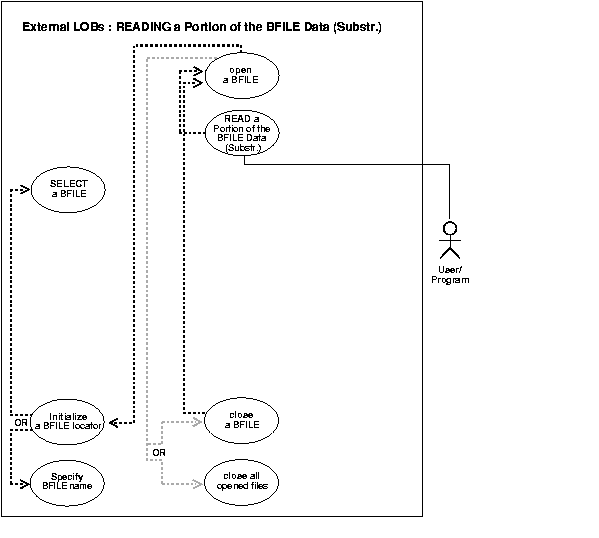
| See Also:
Table 12-1, "Use Case Model: External LOBs (BFILEs)", for all basic operations of Internal Temporary LOBs |
This procedure describes how to read portion of BFILE data (substr).
Not applicable.
See Chapter 3, "LOB Support in Different Programmatic Environments" for a list of available functions in each programmatic environment. Use the following syntax references for each programmatic environment:
The following examples read a graphic image into ad_graphic from BFILE 'ADPHOTO_DIR'.
Examples are provided in these five programmatic environments:
/* Reading portion of a BFILE data using substr. [Example script: 4009.sql] */ /* Procedure substringBFILE_proc is not part of DBMS_LOB package: */ CREATE OR REPLACE PROCEDURE substringBFILE_proc IS File_loc BFILE; Position INTEGER := 1; Buffer RAW(32767); BEGIN /* Select the LOB: */ SELECT PMtab.ad_graphic INTO File_loc FROM Print_media PMtab WHERE PMtab.product_id = 3060 AND PMtab.ad_id = 11001; /* Open the BFILE: */ DBMS_LOB.OPEN(File_loc, DBMS_LOB.LOB_READONLY); Buffer := DBMS_LOB.SUBSTR(File_loc, 255, Position); /* Close the BFILE: */ DBMS_LOB.CLOSE(File_loc); END;
* Reading portion of a BFILE data using substr. [Example script: 4010.pco] IDENTIFICATION DIVISION. PROGRAM-ID. BFILE-SUBSTR. ENVIRONMENT DIVISION. DATA DIVISION. WORKING-STORAGE SECTION. 01 BFILE1 SQL-BFILE. 01 BUFFER2 PIC X(32767) VARYING. 01 AMT PIC S9(9) COMP. 01 POS PIC S9(9) COMP VALUE 1024. 01 OFFSET PIC S9(9) COMP VALUE 1. EXEC SQL INCLUDE SQLCA END-EXEC. EXEC SQL VAR BUFFER2 IS VARRAW(32767) END-EXEC. PROCEDURE DIVISION. BFILE-SUBSTR. * Allocate and initialize the CLOB locator: EXEC SQL ALLOCATE :BFILE1 END-EXEC. EXEC SQL WHENEVER NOT FOUND GOTO END-OF-BFILE END-EXEC. EXEC SQL SELECT PTAB.AD_GRAPHIC INTO :BFILE1 FROM PRINT_MEDIA PTAB WHERE PTAB.PRODUCT_ID = 3106 AND PTAB.AD_ ID = 13001 END-EXEC. * Open the BFILE for READ ONLY: EXEC SQL LOB OPEN :BFILE1 READ ONLY END-EXEC. * Execute PL/SQL to use its SUBSTR functionality: MOVE 32767 TO AMT. EXEC SQL EXECUTE BEGIN :BUFFER2 := DBMS_LOB.SUBSTR(:BFILE1,:AMT,:POS); END; END-EXEC. * Close and free the locators: EXEC SQL LOB CLOSE :BFILE1 END-EXEC. END-OF-BFILE. EXEC SQL WHENEVER NOT FOUND CONTINUE END-EXEC. EXEC SQL FREE :BFILE1 END-EXEC.
/* Reading portion of a BFILE data using substr. [Example script: 4011.pc] Pro*C/C++ lacks an equivalent embedded SQL form for the DBMS_LOB.SUBSTR() function. However, Pro*C/C++ can interoperate with PL/SQL using anonymous PL/SQL blocks embedded in a Pro*C/C++ program as this example shows: */ #include <oci.h> #include <stdio.h> #include <sqlca.h> void Sample_Error() { EXEC SQL WHENEVER SQLERROR CONTINUE; printf("%.*s\n", sqlca.sqlerrm.sqlerrml, sqlca.sqlerrm.sqlerrmc); EXEC SQL ROLLBACK WORK RELEASE; exit(1); } #define BufferLength 256 void substringBFILE_proc() { OCIBFileLocator *Lob_loc; int Position = 1; char Buffer[BufferLength]; EXEC SQL VAR Buffer IS RAW(BufferLength); EXEC SQL WHENEVER SQLERROR DO Sample_Error(); EXEC SQL ALLOCATE :Lob_loc; EXEC SQL SELECT PMtab.ad_graphic INTO :Lob_loc FROM Print_media PMtab WHERE PMtab.product_id = 2056 AND PMTab.ad_id = 12001; /* Open the BFILE: */ EXEC SQL LOB OPEN :Lob_loc READ ONLY; /* Invoke SUBSTR() from within an anonymous PL/SQL block: */ EXEC SQL EXECUTE BEGIN :Buffer := DBMS_LOB.SUBSTR(:Lob_loc, 256, :Position); END; END-EXEC; /* Close the BFILE: */ EXEC SQL LOB CLOSE :Lob_loc; EXEC SQL FREE :Lob_loc; } void main() { char *samp = "samp/samp"; EXEC SQL CONNECT :samp; substringBFILE_proc(); EXEC SQL ROLLBACK WORK RELEASE; }
' Reading portion of a BFILE data using substr. [Example script: 4013.txt] Dim MySession As OraSession Dim OraDb As OraDatabase Dim OraDyn As OraDynaset, OraAdGraphic As OraBfile, amount_read%, chunksize%, chunk Set MySession = CreateObject("OracleInProcServer.XOraSession") Set OraDb = MySession.OpenDatabase("pmschema", "pm/pm", 0&) chunk_size = 32767 Set OraDyn = OraDb.CreateDynaset("select * from Print_media", ORADYN_DEFAULT) Set OraAdGraphic = OraDyn.Fields("ad_graphic").Value OraMusic.PollingAmount = OraAdGraphic.Size 'Read entire BFILE contents OraAdGraphic.offset = 255 'Read from the 255th position 'Open the Bfile for reading: OraAdGraphic.Open amount_read = OraAdGraphic.Read(chunk, chunk_size) 'chunk returned is a variant of type byte array If amount_read <> chunk_size Then 'Do error processing Else 'Process the data End If
// Reading portion of a BFILE data using substr. [Example script: 4014.java] import java.io.OutputStream; // Core JDBC classes: import java.sql.DriverManager; import java.sql.Connection; import java.sql.Statement; import java.sql.PreparedStatement; import java.sql.ResultSet; import java.sql.SQLException; // Oracle Specific JDBC classes: import oracle.sql.*; import oracle.jdbc.driver.*; public class Ex4_62 { public static void main (String args []) throws Exception { // Load the Oracle JDBC driver: DriverManager.registerDriver(new oracle.jdbc.driver.OracleDriver()); // Connect to the database: Connection conn = DriverManager.getConnection ("jdbc:oracle:oci8:@", "samp", "samp"); conn.setAutoCommit (false); // Create a Statement: Statement stmt = conn.createStatement (); try { BFILE src_lob = null; ResultSet rset = null; InputStream in = null; byte buf[] = new byte[1000]; int length = 0; rset = stmt.executeQuery ( "SELECT ad_graphic FROM Print_media WHERE product_id = 3106 AND ad_id = 13001"); if (rset.next()) { src_lob = ((OracleResultSet)rset).getBFILE (1); } // Open the BFILE: src_lob.openFile(); // Get a handle to stream the data from the BFILE in = src_lob.getBinaryStream(); if (in != null) { // request 255 bytes into buf, starting from offset 1. // length = # bytes actually returned from stream: length = in.read(buf, 1, 255); System.out.println("Bytes read in: " + Integer.toString(length)); // Process the buf: System.out.println(new String(buf)); } // Close the stream, BFILE, statement and connection: in.close(); src_lob.closeFile(); stmt.close(); conn.commit(); conn.close(); } catch (SQLException e) { e.printStackTrace(); } } }
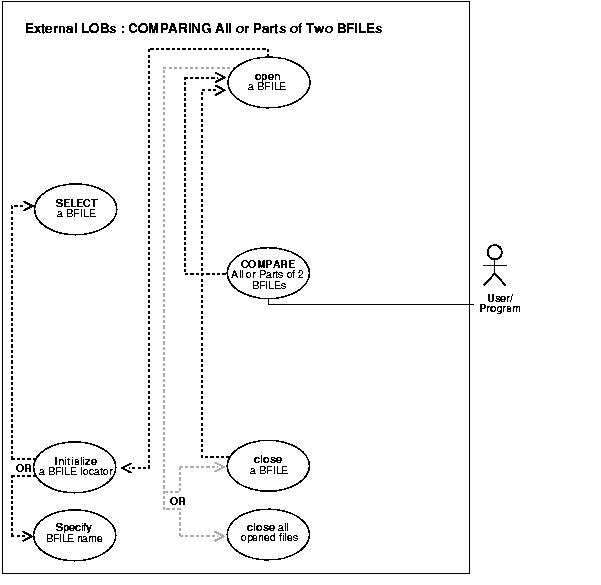
| See Also:
Table 12-1, "Use Case Model: External LOBs (BFILEs)", for all basic operations of Internal Temporary LOBs |
This procedure describes how to compare all or parts of two BFILES.
Not applicable.
See Chapter 3, "LOB Support in Different Programmatic Environments" for a list of available functions in each programmatic environment. Use the following syntax references for each programmatic environment:
The following examples determine whether a photograph in file, 'ADPHOTO_DIR', has already been used as a specific ad_graphic by comparing each data entity bit by bit.
|
Note:
|
Examples are provided in these five programmatic environments:
/* Comparing all or parts of two BFILES. [Example script: 4015.sql] */ /* Procedure instringBFILE_proc is not part of DBMS_LOB package: */ CREATE OR REPLACE PROCEDURE instringBFILE_proc IS File_loc BFILE; Pattern RAW(32767); Position INTEGER; BEGIN /* Select the LOB: */ SELECT PMtab.ad_graphic INTO File_loc FROM THE(SELECT PMtab.textdoc_ntab FROM Print_media PMtab WHERE Product_ID = 3060 AND ad_id = 11001) PMtab WHERE Segment = 1; /* Open the BFILE: */ DBMS_LOB.OPEN(File_loc, DBMS_LOB.LOB_READONLY); /* Initialize the pattern for which to search, find the 2nd occurrence of the pattern starting from the beginning of the BFILE: */ Position := DBMS_LOB.INSTR(File_loc, Pattern, 1, 2); /* Close the BFILE: */ DBMS_LOB.CLOSE(File_loc); END;
* Comparing all or parts of two BFILES. [Example script: 4016.pco] IDENTIFICATION DIVISION. PROGRAM-ID. BFILE-COMPARE. ENVIRONMENT DIVISION. DATA DIVISION. WORKING-STORAGE SECTION. 01 USERID PIC X(11) VALUES "SAMP/SAMP". 01 BFILE1 SQL-BFILE. 01 BFILE2 SQL-BFILE. 01 RET PIC S9(9) COMP. 01 AMT PIC S9(9) COMP. 01 DIR-ALIAS PIC X(30) VARYING. 01 FNAME PIC X(20) VARYING. 01 ORASLNRD PIC 9(4). EXEC SQL INCLUDE SQLCA END-EXEC. EXEC ORACLE OPTION (ORACA=YES) END-EXEC. EXEC SQL INCLUDE ORACA END-EXEC. PROCEDURE DIVISION. BFIlE-COMPARE. EXEC SQL WHENEVER SQLERROR DO PERFORM SQL-ERROR END-EXEC. EXEC SQL CONNECT :USERID END-EXEC. * Allocate and initialize the BLOB locators: EXEC SQL ALLOCATE :BFILE1 END-EXEC. EXEC SQL ALLOCATE :BFILE2 END-EXEC. * Set up the directory and file information: MOVE "ADGRAPHIC_DIR" TO DIR-ALIAS-ARR. MOVE 9 TO DIR-ALIAS-LEN. MOVE "keyboard_graphic_3106_13001" TO FNAME-ARR. MOVE 17 TO FNAME-LEN. EXEC SQL LOB FILE SET :BFILE1 DIRECTORY = :DIR-ALIAS, FILENAME = :FNAME END-EXEC. EXEC SQL WHENEVER NOT FOUND GOTO END-OF-BFILE END-EXEC. EXEC SQL SELECT AD_GRAPHIC INTO :BFILE2 FROM PRINT_MEDIA WHERE PRODUCT_ID = 3106 AND ad_id = 13001 END-EXEC. * Open the BLOBs for READ ONLY: EXEC SQL LOB OPEN :BFILE1 READ ONLY END-EXEC. EXEC SQL LOB OPEN :BFILE2 READ ONLY END-EXEC. * Execute PL/SQL to get COMPARE functionality: MOVE 5 TO AMT. EXEC SQL EXECUTE BEGIN :RET := DBMS_LOB.COMPARE(:BFILE1,:BFILE2, :AMT,1,1); END; END-EXEC. IF RET = 0 * Logic for equal BFILEs goes here DISPLAY "BFILES are equal" ELSE * Logic for unequal BFILEs goes here DISPLAY "BFILEs are not equal" END-IF. EXEC SQL LOB CLOSE :BFILE1 END-EXEC. EXEC SQL LOB CLOSE :BFILE2 END-EXEC. END-OF-BFILE. EXEC SQL WHENEVER NOT FOUND CONTINUE END-EXEC. EXEC SQL FREE :BFILE1 END-EXEC. EXEC SQL FREE :BFILE2 END-EXEC. STOP RUN. SQL-ERROR. EXEC SQL WHENEVER SQLERROR CONTINUE END-EXEC. MOVE ORASLNR TO ORASLNRD. DISPLAY " ". DISPLAY "ORACLE ERROR DETECTED ON LINE ", ORASLNRD, ":". DISPLAY " ". DISPLAY SQLERRMC. EXEC SQL ROLLBACK WORK RELEASE END-EXEC. STOP RUN.
/* Comparing all or parts of two BFILES. [Example script: 4017.pc] Pro*C/C++ lacks an equivalent embedded SQL form for the DBMS_LOB.COMPARE() function. Like the DBMS_LOB.SUBSTR() function, however, Pro*C/C++ can invoke DBMS_LOB.COMPARE() in an anonymous PL/SQL block as shown here: */ #include <oci.h> #include <stdio.h> #include <sqlca.h> void Sample_Error() { EXEC SQL WHENEVER SQLERROR CONTINUE; printf("%.*s\n", sqlca.sqlerrm.sqlerrml, sqlca.sqlerrm.sqlerrmc); EXEC SQL ROLLBACK WORK RELEASE; exit(1); } void compareBFILEs_proc() { OCIBFileLocator *Lob_loc1, *Lob_loc2; int Retval = 1; char *Dir1 = "GRAPHIC_DIR", *Name1 = "mousepad_2056"; EXEC SQL WHENEVER SQLERROR DO Sample_Error(); EXEC SQL ALLOCATE :Lob_loc1; EXEC SQL LOB FILE SET :Lob_loc1 DIRECTORY = :Dir1, FILENAME = :Name1; EXEC SQL ALLOCATE :Lob_loc2; EXEC SQL SELECT Photo INTO :Lob_loc2 FROM Print_media WHERE Product_ID = 2056; /* Open the BFILEs: */ EXEC SQL LOB OPEN :Lob_loc1 READ ONLY; EXEC SQL LOB OPEN :Lob_loc2 READ ONLY; /* Compare the BFILEs in PL/SQL using DBMS_LOB.COMPARE() */ EXEC SQL EXECUTE BEGIN :Retval := DBMS_LOB.COMPARE( :Lob_loc2, :Lob_loc1, DBMS_LOB.LOBMAXSIZE, 1, 1); END; END-EXEC; /* Close the BFILEs: */ EXEC SQL LOB CLOSE :Lob_loc1; EXEC SQL LOB CLOSE :Lob_loc2; if (0 == Retval) printf("BFILEs are the same\n"); else printf("BFILEs are not the same\n"); /* Release resources used by the locators: */ EXEC SQL FREE :Lob_loc1; EXEC SQL FREE :Lob_loc2; } void main() { char *samp = "samp/samp"; EXEC SQL CONNECT :samp; compareBFILEs_proc(); EXEC SQL ROLLBACK WORK RELEASE; }
'Comparing all or parts of two BFILES. [Example script: 4018.txt] 'The PL/SQL packages and the tables mentioned here are not part of the 'standard OO4O installation: Dim MySession As OraSession Dim OraDb As OraDatabase Dim OraDyn As OraDynaset, OraAdGraphic As OraBfile, OraMyAdGraphic As OraBfile, OraSql As OraSqlStmt Set MySession = CreateObject("OracleInProcServer.XOraSession") Set OraDb = MySession.OpenDatabase("pmschema", "pm/pm", 0&) OraDb.Connection.BeginTrans Set OraParameters = OraDb.Parameters OraParameters.Add "id", 3106, ORAPARM_INPUT 'Define out parameter of BFILE type: OraParameters.Add "MyAdGraphic", Null, ORAPARM_OUTPUT OraParameters("MyAdGraphic").ServerType = ORATYPE_BFILE Set OraSql = OraDb.CreateSql( "BEGIN SELECT ad_graphic INTO :MyAdGraphic FROM Print_media WHERE product_ id = :id; END;", ORASQL_FAILEXEC) Set OraMyAdGraphic = OraParameters("MyAdGraphic").Value 'Create dynaset: Set OraDyn = OraDb.CreateDynaset( "SELECT * FROM Print_media WHERE product_id = 3106", ORADYN_DEFAULT) Set OraAdGraphic = OraDyn.Fields("ad_graphic").Value 'Open the Bfile for reading: OraAdGraphic.Open OraMyAdGraphic.Open If OraAdGraphic.Compare(OraMyAdGraphic) Then 'Process the data Else 'Do error processing End If OraDb.Connection.CommitTrans
// Comparing all or parts of two BFILES. [Example script: 4019.java] import java.io.InputStream; import java.io.OutputStream; // Core JDBC classes: import java.sql.DriverManager; import java.sql.Connection; import java.sql.Types; import java.sql.Statement; import java.sql.PreparedStatement; import java.sql.ResultSet; import java.sql.SQLException; // Oracle Specific JDBC classes: import oracle.sql.*; import oracle.jdbc.driver.*; public class Ex4_66 { static final int MAXBUFSIZE = 32767; public static void main (String args []) throws Exception { // Load the Oracle JDBC driver: DriverManager.registerDriver(new oracle.jdbc.driver.OracleDriver()); // Connect to the database: Connection conn = DriverManager.getConnection ("jdbc:oracle:oci8:@", "samp", "samp"); // It's faster when auto commit is off: conn.setAutoCommit (false); // Create a Statement: Statement stmt = conn.createStatement (); try { BFILE lob_loc1 = null; BFILE lob_loc2 = null; ResultSet rset = null; rset = stmt.executeQuery ( "SELECT ad_graphic FROM Print_media WHERE product_id = 3106"); if (rset.next()) { lob_loc1 = ((OracleResultSet)rset).getBFILE (1); } rset = stmt.executeQuery ( "SELECT BFILENAME('AD_GRAPHIC', 'keyboard_3106') FROM DUAL"); if (rset.next()) { lob_loc2 = ((OracleResultSet)rset).getBFILE (1); } lob_loc1.openFile (); lob_loc2.openFile (); if (lob_loc1.length() > lob_loc2.length()) System.out.println("Looking for LOB2 inside LOB1. result = " + lob_loc1.position(lob_loc2, 1)); else System.out.println("Looking for LOB1 inside LOB2. result = " + lob_loc2.position(lob_loc1, 1)); stmt.close(); conn.commit(); conn.close(); } catch (SQLException e) { e.printStackTrace(); } } }
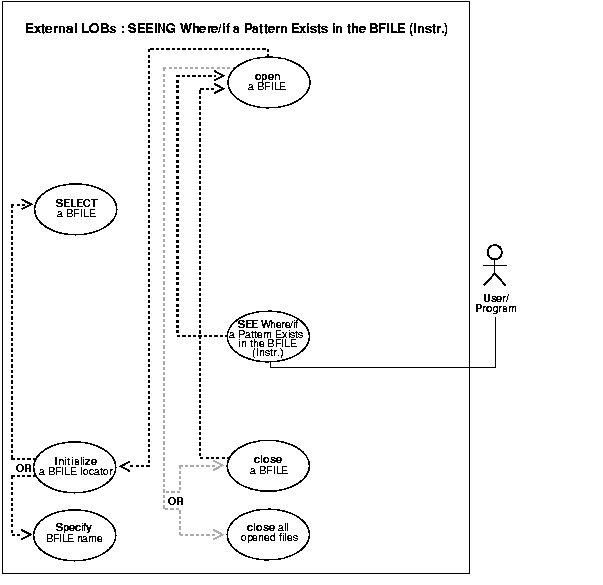
| See Also:
Table 12-1, "Use Case Model: External LOBs (BFILEs)", for all basic operations of Internal Temporary LOBs |
This procedure describes how to see if a pattern exists (instr) in the BFILE.
Not applicable.
See Chapter 3, "LOB Support in Different Programmatic Environments" for a list of available functions in each programmatic environment. Use the following syntax references for each programmatic environment:
The following examples search for the occurrence of a pattern in an ad_graphic image.
These examples are provided in the following four programmatic environments:
/* Checking if a pattern exists in a BFILE using instr [Example script: 4030.sql] /* Procedure compareBFILEs_proc is not part of DBMS_LOB package: */ CREATE OR REPLACE PROCEDURE compareBFILEs_proc IS /* Initialize the BFILE locator: */ File_loc1 BFILE := BFILENAME('ADPHOTO_DIR', 'keyboard_photo_3060_ 11001'); File_loc2 BFILE; Retval INTEGER; BEGIN /* Select the LOB: */ SELECT ad_graphic INTO File_loc2 FROM print_media WHERE Product_ID = 3060 AND ad_id = 11001; /* Open the BFILEs: */ DBMS_LOB.OPEN(File_loc1, DBMS_LOB.LOB_READONLY); DBMS_LOB.OPEN(File_loc2, DBMS_LOB.LOB_READONLY); Retval := DBMS_LOB.COMPARE(File_loc2, File_loc1, DBMS_LOB.LOBMAXSIZE, 1, 1); /* Close the BFILEs: */ DBMS_LOB.CLOSE(File_loc1); DBMS_LOB.CLOSE(File_loc2); END;
* Checking if a pattern exists in a BFILE using instr [Example script: 4021.pco] IDENTIFICATION DIVISION. PROGRAM-ID. BFILE-INSTR. ENVIRONMENT DIVISION. DATA DIVISION. WORKING-STORAGE SECTION. 01 USERID PIC X(11) VALUES "SAMP/SAMP". 01 BFILE1 SQL-BFILE. * The length of pattern was chosen arbitrarily: 01 PATTERN PIC X(4) VALUE "2424". EXEC SQL VAR PATTERN IS RAW(4) END-EXEC. 01 POS PIC S9(9) COMP. 01 ORASLNRD PIC 9(4). EXEC SQL INCLUDE SQLCA END-EXEC. EXEC ORACLE OPTION (ORACA=YES) END-EXEC. EXEC SQL INCLUDE ORACA END-EXEC. PROCEDURE DIVISION. BFILE-INSTR. EXEC SQL WHENEVER SQLERROR DO PERFORM SQL-ERROR END-EXEC. EXEC SQL CONNECT :USERID END-EXEC. * Allocate and initialize the BFILE locator: EXEC SQL ALLOCATE :BFILE1 END-EXEC. EXEC SQL WHENEVER NOT FOUND GOTO END-OF-BFILE END-EXEC. EXEC SQL SELECT AD_GRAPHIC INTO :BFILE1 FROM PRINT_MEDIA WHERE PRODUCT_ID = 3106 AND AD_ID = 13001 END-EXEC. * Open the CLOB for READ ONLY: EXEC SQL LOB OPEN :BFILE1 READ ONLY END-EXEC. * Execute PL/SQL to get INSTR functionality: EXEC SQL EXECUTE BEGIN :POS := DBMS_LOB.INSTR(:BFILE1,:PATTERN, 1, 2); END; END-EXEC. IF POS = 0 * Logic for pattern not found here DISPLAY "Pattern is not found." ELSE * Pos contains position where pattern is found DISPLAY "Pattern is found." END-IF. * Close and free the LOB: EXEC SQL LOB CLOSE :BFILE1 END-EXEC. END-OF-BFILE. EXEC SQL WHENEVER NOT FOUND CONTINUE END-EXEC. EXEC SQL FREE :BFILE1 END-EXEC. EXEC SQL ROLLBACK WORK RELEASE END-EXEC. STOP RUN. SQL-ERROR. EXEC SQL WHENEVER SQLERROR CONTINUE END-EXEC. MOVE ORASLNR TO ORASLNRD. DISPLAY " ". DISPLAY "ORACLE ERROR DETECTED ON LINE ", ORASLNRD, ":". DISPLAY " ". DISPLAY SQLERRMC. EXEC SQL ROLLBACK WORK RELEASE END-EXEC. STOP RUN.
/* Checking if a pattern exists in a BFILE using instr [Example script: 4022.pc] Pro*C lacks an equivalent embedded SQL form of the DBMS_LOB.INSTR() function. However, like SUBSTR() and COMPARE(), Pro*C/C++ can call DBMS_LOB.INSTR() from within an anonymous PL/SQL block as shown here: */ #include <sql2oci.h> #include <stdio.h> #include <string.h> #include <sqlca.h> void Sample_Error() { EXEC SQL WHENEVER SQLERROR CONTINUE; printf("%.*s\n", sqlca.sqlerrm.sqlerrml, sqlca.sqlerrm.sqlerrmc); EXEC SQL ROLLBACK WORK RELEASE; exit(1); } #define PatternSize 5 void instringBFILE_proc() { OCIBFileLocator *Lob_loc; unsigned int Position = 0; int Product_id = 2056, Segment = 1; char Pattern[PatternSize]; /* Datatype Equivalencing is Mandatory for this Datatype: */ EXEC SQL VAR Pattern IS RAW(PatternSize); EXEC SQL WHENEVER SQLERROR DO Sample_Error(); EXEC SQL ALLOCATE :Lob_loc; /* Use Dynamic SQL to retrieve the BFILE Locator: */ EXEC SQL PREPARE S FROM 'SELECT Intab.ad_graphic \ FROM TABLE(SELECT PMtab.textdoc_ntab FROM Print_media PMtab \ WHERE product_id = :cid) PMtab \ WHERE PMtab.Segment = :seg'; EXEC SQL DECLARE C CURSOR FOR S; EXEC SQL OPEN C USING :Product_ID, :Segment; EXEC SQL FETCH C INTO :Lob_loc; EXEC SQL CLOSE C; /* Open the BFILE: */ EXEC SQL LOB OPEN :Lob_loc READ ONLY; memset((void *)Pattern, 0, PatternSize); /* Find the first occurrance of the pattern starting from the beginning of the BFILE using PL/SQL: */ EXEC SQL EXECUTE BEGIN :Position := DBMS_LOB.INSTR(:Lob_loc, :Pattern, 1, 1); END; END-EXEC; /* Close the BFILE: */ EXEC SQL LOB CLOSE :Lob_loc; if (0 == Position) printf("Pattern not found\n"); else printf("The pattern occurs at %d\n", Position); EXEC SQL FREE :Lob_loc; } void main() { char *samp = "samp/samp"; EXEC SQL CONNECT :samp; instringBFILE_proc(); EXEC SQL ROLLBACK WORK RELEASE; }
// Checking if a pattern exists in a BFILE using instr [Example script: 4024.java] import java.io.OutputStream; // Core JDBC classes: import java.sql.DriverManager; import java.sql.Connection; import java.sql.Types; import java.sql.Statement; import java.sql.PreparedStatement; import java.sql.ResultSet; import java.sql.SQLException; // Oracle Specific JDBC classes: import oracle.sql.*; import oracle.jdbc.driver.*; public class Ex4_70 { static final int MAXBUFSIZE = 32767; public static void main (String args []) throws Exception { // Load the Oracle JDBC driver: DriverManager.registerDriver(new oracle.jdbc.driver.OracleDriver()); // Connect to the database: Connection conn = DriverManager.getConnection ("jdbc:oracle:oci8:@", "samp", "samp"); // It's faster when auto commit is off: conn.setAutoCommit (false); // Create a Statement: Statement stmt = conn.createStatement (); try { BFILE lob_loc = null; // Pattern to look for within the BFILE: String pattern = new String("children"); ResultSet rset = stmt.executeQuery ( "SELECT ad_graphic FROM Print_media WHERE product_id = 3106 AND ad_id = 13001"); if (rset.next()) { lob_loc = ((OracleResultSet)rset).getBFILE (1); } // Open the LOB: lob_loc.openFile(); // Search for the location of pattern string in the BFILE, // starting at offset 1: long result = lob_loc.position(pattern.getBytes(), 1); System.out.println( "Results of Pattern Comparison : " + Long.toString(result)); // Close the LOB: lob_loc.closeFile(); stmt.close(); conn.commit(); conn.close(); } catch (SQLException e) { e.printStackTrace(); } } }
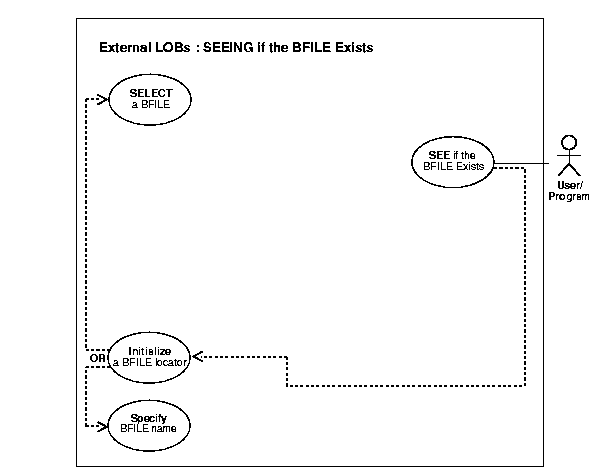
| See Also:
Table 12-1, "Use Case Model: External LOBs (BFILEs)", for all basic operations of Internal Temporary LOBs |
This procedure describes how to see if a BFILE exists.
Not applicable.
See Chapter 3, "LOB Support in Different Programmatic Environments" for a list of available functions in each programmatic environment. Use the following syntax references for each programmatic environment:
This example queries whether a BFILE that is associated with Recording.
The examples are provided in the following six programmatic environments:
/* Checking if a BFILE exists [Example script: 4025.sql] */ /* Procedure seeIfExistsBFILE_proc is not part of DBMS_LOB package: */ CREATE OR REPLACE PROCEDURE seeIfExistsBFILE_proc IS File_loc BFILE; BEGIN /* Select the LOB: */ SELECT Intab.ad_graphic INTO File_loc FROM THE(SELECT PMtab.textdoc_ntab FROM Print_media PMtab WHERE PMtab.product_id = 3060 AND ad_id = 11001) PMtab WHERE PMtab.Segment = 1; /* See If the BFILE exists: */ IF (DBMS_LOB.FILEEXISTS(File_loc) != 0) THEN DBMS_OUTPUT.PUT_LINE('Processing given that the BFILE exists'); ELSE DBMS_OUTPUT.PUT_LINE('Processing given that the BFILE does not exist'); END IF; EXCEPTION WHEN OTHERS THEN DBMS_OUTPUT.PUT_LINE('Operation failed'); END;
/* Checking if a BFILE exists [Example script: 4026.c] */ /* Select the lob/bfile from the Print_media table */ void selectLob(Lob_loc, errhp, svchp, stmthp) OCILobLocator *Lob_loc; OCIError *errhp; OCISvcCtx *svchp; OCIStmt *stmthp; { OCIDefine *dfnhp, *dfnhp2; text *selstmt = (text *) "SELECT ad_graphic FROM Print_media \ WHERE product_id = 3106 AND ad_id = 13001"; /* Prepare the SQL select statement */ checkerr (errhp, OCIStmtPrepare(stmthp, errhp, selstmt, (ub4) strlen((char *) selstmt), (ub4) OCI_NTV_SYNTAX, (ub4)OCI_DEFAULT)); /* Call define for the bfile column */ checkerr (errhp, OCIDefineByPos(stmthp, &dfnhp, errhp, 1, (dvoid *)&Lob_loc, 0 , SQLT_BFILE, (dvoid *)0, (ub2 *)0, (ub2 *)0, OCI_DEFAULT) || OCIDefineByPos(stmthp, &dfnhp2, errhp, 2, (dvoid *)&Lob_loc, 0 , SQLT_BFILE, (dvoid *)0, (ub2 *)0, (ub2 *)0, OCI_DEFAULT)); /* Execute the SQL select statement */ checkerr (errhp, OCIStmtExecute(svchp, stmthp, errhp, (ub4) 1, (ub4) 0, (CONST OCISnapshot*) 0, (OCISnapshot*) 0, (ub4) OCI_DEFAULT)); } void BfileExists(envhp, errhp, svchp, stmthp) OCIEnv *envhp; OCIError *errhp; OCISvcCtx *svchp; OCIStmt *stmthp; { OCILobLocator *bfile_loc; boolean is_exist; /* Allocate the locator descriptor */ (void) OCIDescriptorAlloc((dvoid *) envhp, (dvoid **) &bfile_loc, (ub4) OCI_DTYPE_FILE, (size_t) 0, (dvoid **) 0); /* Select the bfile */ selectLob(bfile_loc, errhp, svchp, stmthp); checkerr (errhp, OCILobFileExists(svchp, errhp, bfile_loc, &is_exist)); if (is_exist == TRUE) { printf("File exists\n"); } else { printf("File does not exist\n"); } /* Free the locator descriptor */ OCIDescriptorFree((dvoid *)bfile_loc, (ub4)OCI_DTYPE_FILE); }
* Checking if a BFILE exists. [Example script: 4027.pco] IDENTIFICATION DIVISION. PROGRAM-ID. BFILE-EXISTS. ENVIRONMENT DIVISION. DATA DIVISION. WORKING-STORAGE SECTION. 01 USERID PIC X(11) VALUES "SAMP/SAMP". 01 BFILE1 SQL-BFILE. 01 FEXISTS PIC S9(9) COMP. 01 ORASLNRD PIC 9(4). EXEC SQL INCLUDE SQLCA END-EXEC. EXEC ORACLE OPTION (ORACA=YES) END-EXEC. EXEC SQL INCLUDE ORACA END-EXEC. PROCEDURE DIVISION. BFILE-EXISTS. EXEC SQL WHENEVER SQLERROR DO PERFORM SQL-ERROR END-EXEC. EXEC SQL CONNECT :USERID END-EXEC. * Allocate and initialize the BFILE locator: EXEC SQL ALLOCATE :BFILE1 END-EXEC. EXEC SQL WHENEVER NOT FOUND GOTO END-OF-BFILE END-EXEC. EXEC SQL SELECT AD_GRAPHIC INTO :BFILE1 FROM PRINT_MEDIA WHERE PRODUCT_ID = 3106 AND AD_ID = 13001 END-EXEC. EXEC SQL LOB DESCRIBE :BFILE1 GET FILEEXISTS INTO :FEXISTS END-EXEC. IF FEXISTS = 1 * Logic for file exists here DISPLAY "File exists" ELSE * Logic for file does not exist here DISPLAY "File does not exist" END-IF. END-OF-BFILE. EXEC SQL WHENEVER NOT FOUND CONTINUE END-EXEC. EXEC SQL FREE :BFILE1 END-EXEC. EXEC SQL ROLLBACK WORK RELEASE END-EXEC. STOP RUN. SQL-ERROR. EXEC SQL WHENEVER SQLERROR CONTINUE END-EXEC. MOVE ORASLNR TO ORASLNRD. DISPLAY " ". DISPLAY "ORACLE ERROR DETECTED ON LINE ", ORASLNRD, ":". DISPLAY " ". DISPLAY SQLERRMC. EXEC SQL ROLLBACK WORK RELEASE END-EXEC. STOP RUN.
/* Checking if a BFILE exists. [Example script: 4028.pc] */ #include <oci.h> #include <stdio.h> #include <sqlca.h> void Sample_Error() { EXEC SQL WHENEVER SQLERROR CONTINUE; printf("%.*s\n", sqlca.sqlerrm.sqlerrml, sqlca.sqlerrm.sqlerrmc); EXEC SQL ROLLBACK WORK RELEASE; exit(1); } void seeIfBFILEExists_proc() { OCIBFileLocator *Lob_loc; unsigned int Exists = 0; EXEC SQL WHENEVER SQLERROR DO Sample_Error(); EXEC SQL ALLOCATE :Lob_loc; EXEC SQL SELECT PMtab.ad_graphic INTO :Lob_loc FROM Print_media PMtab WHERE PMtab.Product_ID = 2056 AND PMtab.ad_id = 12001; /* See if the BFILE Exists: */ EXEC SQL LOB DESCRIBE :Lob_loc GET FILEEXISTS INTO :Exists; printf("BFILE %s exist\n", Exists ? "does" : "does not"); EXEC SQL FREE :Lob_loc; } void main() { char *samp = "samp/samp"; EXEC SQL CONNECT :samp; seeIfBFILEExists_proc(); EXEC SQL ROLLBACK WORK RELEASE; }
'Checking if a BFILE exists. [Example script: 4030.txt] 'The PL/SQL packages and the tables mentioned here are not part of the 'standard OO4O installation: Dim MySession As OraSession Dim OraDb As OraDatabase Dim OraAdGraphic As OraBfile, OraSql As OraSqlStmt Set MySession = CreateObject("OracleInProcServer.XOraSession") Set OraDb = MySession.OpenDatabase("pmschema", "pm/pm", 0&) OraDb.Connection.BeginTrans Set OraParameters = OraDb.Parameters OraParameters.Add "id", 2056, ORAPARM_INPUT 'Define out parameter of BFILE type: OraParameters.Add "MyAdGraphic", Null, ORAPARM_OUTPUT OraParameters("MyAdGraphic").ServerType = ORATYPE_BFILE Set OraSql = OraDb.CreateSql( "BEGIN SELECT ad_graphic INTO :MyAdGraphic FROM Print_media WHERE product_id = :id; END;", ORASQL_FAILEXEC) Set OraAdGraphic = OraParameters("MyAdGraphic").Value If OraAdGraphic.Exists Then 'Process the data Else 'Do error processing End If OraDb.Connection.CommitTrans
// Checking if a BFILE exists. [Example script: 4031.java] import java.io.InputStream; import java.io.OutputStream; // Core JDBC classes: import java.sql.DriverManager; import java.sql.Connection; import java.sql.Types; import java.sql.Statement; import java.sql.PreparedStatement; import java.sql.ResultSet; import java.sql.SQLException; // Oracle Specific JDBC classes: import oracle.sql.*; import oracle.jdbc.driver.*; public class Ex4_74 { static final int MAXBUFSIZE = 32767; public static void main (String args []) throws Exception { // Load the Oracle JDBC driver: DriverManager.registerDriver(new oracle.jdbc.driver.OracleDriver()); // Connect to the database: Connection conn = DriverManager.getConnection ("jdbc:oracle:oci8:@", "samp", "samp"); // It's faster when auto commit is off: conn.setAutoCommit (false); // Create a Statement Statement stmt = conn.createStatement (); try { BFILE lob_loc = null; ResultSet rset = stmt.executeQuery ( "SELECT ad_graphic FROM Print_media WHERE product_id = 3106 AND ad_id = 13001"); if (rset.next()) { lob_loc = ((OracleResultSet)rset).getBFILE (1); } // See if the BFILE exists: System.out.println("Result from fileExists(): " + lob_loc.fileExists()); // Return the length of the BFILE: long length = lob_loc.length(); System.out.println("Length of BFILE: " + length); // Get the directory alias for this BFILE: System.out.println("Directory alias: " + lob_loc.getDirAlias()); // Get the file name for this BFILE: System.out.println("File name: " + lob_loc.getName()); stmt.close(); conn.commit(); conn.close(); } catch (SQLException e) { e.printStackTrace(); } } }
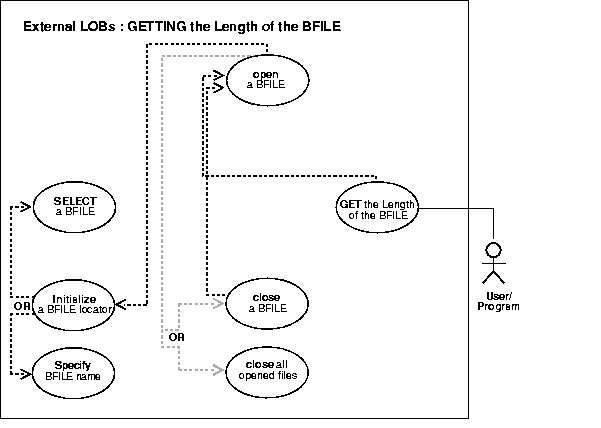
| See Also:
Table 12-1, "Use Case Model: External LOBs (BFILEs)", for all basic operations of Internal Temporary LOBs |
This procedure describes how to get the length of a BFILE.
Not applicable.
See Chapter 3, "LOB Support in Different Programmatic Environments" for a list of available functions in each programmatic environment. Use the following syntax references for each programmatic environment:
This example gets the length of a BFILE that is associated with ad_graphic.
The examples are provided in six programmatic environments:
/* Getting the length of a BFILE. [Example script: 4032.sql] /* Procedure getLengthBFILE_proc is not part of DBMS_LOB package: */ CREATE OR REPLACE PROCEDURE getLengthBFILE_proc IS File_loc BFILE; Length INTEGER; BEGIN /* Initialize the BFILE locator by selecting the LOB: */ SELECT PMtab.ad_graphic INTO File_loc FROM Print_media PMtab WHERE PMtab.product_id = 3060 AND PMtab.ad_id = 11001; /* Open the BFILE: */ DBMS_LOB.OPEN(File_loc, DBMS_LOB.LOB_READONLY); /* Get the length of the LOB: */ Length := DBMS_LOB.GETLENGTH(File_loc); IF Length IS NULL THEN DBMS_OUTPUT.PUT_LINE('BFILE is null.'); ELSE DBMS_OUTPUT.PUT_LINE('The length is ' || length); END IF; /* Close the BFILE: */ DBMS_LOB.CLOSE(File_loc); END;
/* Getting the length of a BFILE. [Example script: 4033.c] */ /* Select the lob/bfile from table Print_media */ void selectLob(Lob_loc, errhp, svchp, stmthp) OCILobLocator *Lob_loc; OCIError *errhp; OCISvcCtx *svchp; OCIStmt *stmthp; { OCIDefine *dfnhp, *dfnhp2; text *selstmt = (text *) "SELECT ad_graphic FROM Print_media \ WHERE product_id = 3106 AND ad_id = 13001"; /* Prepare the SQL select statement */ checkerr (errhp, OCIStmtPrepare(stmthp, errhp, selstmt, (ub4) strlen((char *) selstmt), (ub4) OCI_NTV_SYNTAX, (ub4)OCI_DEFAULT)); /* Call define for the bfile column */ checkerr (errhp, OCIDefineByPos(stmthp, &dfnhp, errhp, 1, (dvoid *)&Lob_loc, 0 , SQLT_BFILE, (dvoid *)0, (ub2 *)0, (ub2 *)0, OCI_DEFAULT) || OCIDefineByPos(stmthp, &dfnhp2, errhp, 2, (dvoid *)&Lob_loc, 0 , SQLT_BFILE, (dvoid *)0, (ub2 *)0, (ub2 *)0, OCI_DEFAULT)); /* Execute the SQL select statement */ checkerr (errhp, OCIStmtExecute(svchp, stmthp, errhp, (ub4) 1, (ub4) 0, (CONST OCISnapshot*) 0, (OCISnapshot*) 0, (ub4) OCI_DEFAULT)); } void BfileLength(envhp, errhp, svchp, stmthp) OCIEnv *envhp; OCIError *errhp; OCISvcCtx *svchp; OCIStmt *stmthp; { OCILobLocator *bfile_loc; ub4 len; /* Allocate the locator descriptor */ (void) OCIDescriptorAlloc((dvoid *) envhp, (dvoid **) &bfile_loc, (ub4) OCI_DTYPE_FILE, (size_t) 0, (dvoid **) 0); /* Select the bfile */ selectLob(bfile_loc, errhp, svchp, stmthp); checkerr (errhp, OCILobFileOpen(svchp, errhp, bfile_loc, (ub1) OCI_FILE_READONLY)); checkerr (errhp, OCILobGetLength(svchp, errhp, bfile_loc, &len)); printf("Length of bfile = %d\n", len); checkerr (errhp, OCILobFileClose(svchp, errhp, bfile_loc)); /* Free the locator descriptor */ OCIDescriptorFree((dvoid *)bfile_loc, (ub4)OCI_DTYPE_FILE); }
* Getting the length of a BFILE. [Example script: 4034.pco] IDENTIFICATION DIVISION. PROGRAM-ID. BFILE-LENGTH. ENVIRONMENT DIVISION. DATA DIVISION. WORKING-STORAGE SECTION. 01 USERID PIC X(11) VALUES "SAMP/SAMP". 01 BFILE1 SQL-BFILE. 01 LEN PIC S9(9) COMP. 01 D-LEN PIC 9(4). 01 ORASLNRD PIC 9(4). EXEC SQL INCLUDE SQLCA END-EXEC. EXEC ORACLE OPTION (ORACA=YES) END-EXEC. EXEC SQL INCLUDE ORACA END-EXEC. PROCEDURE DIVISION. BFILE-LENGTH. EXEC SQL WHENEVER SQLERROR DO PERFORM SQL-ERROR END-EXEC. EXEC SQL CONNECT :USERID END-EXEC. * Allocate and initialize the BFILE locator: EXEC SQL ALLOCATE :BFILE1 END-EXEC. EXEC SQL WHENEVER NOT FOUND GOTO END-OF-BFILE END-EXEC. EXEC SQL SELECT AD_GRAPHIC INTO :BFILE1 FROM PRINT_MEDIA WHERE PRODUCT_ID = 3106 END-EXEC. * Use LOB DESCRIBE to get length of lob: EXEC SQL LOB DESCRIBE :BFILE1 GET LENGTH INTO :LEN END-EXEC. MOVE LEN TO D-LEN. DISPLAY "Length of BFILE is ", D-LEN. END-OF-BFILE. EXEC SQL WHENEVER NOT FOUND CONTINUE END-EXEC. EXEC SQL FREE :BFILE1 END-EXEC. STOP RUN. SQL-ERROR. EXEC SQL WHENEVER SQLERROR CONTINUE END-EXEC. MOVE ORASLNR TO ORASLNRD. DISPLAY " ". DISPLAY "ORACLE ERROR DETECTED ON LINE ", ORASLNRD, ":". DISPLAY " ". DISPLAY SQLERRMC. EXEC SQL ROLLBACK WORK RELEASE END-EXEC. STOP RUN.
/* Getting the length of a BFILE. [Example script: 4035.pc] */ #include <oci.h> #include <stdio.h> #include <sqlca.h> void Sample_Error() { EXEC SQL WHENEVER SQLERROR CONTINUE; printf("%.*s\n", sqlca.sqlerrm.sqlerrml, sqlca.sqlerrm.sqlerrmc); EXEC SQL ROLLBACK WORK RELEASE; exit(1); } void getLengthBFILE_proc() { OCIBFileLocator *Lob_loc; unsigned int Length = 0; EXEC SQL WHENEVER SQLERROR DO Sample_Error(); EXEC SQL ALLOCATE :Lob_loc; EXEC SQL SELECT PMtab.ad_graphic INTO :Lob_loc FROM Print_media PMtab WHERE PMtab.product_id = 3060 AND ad_id = 11001; /* Open the BFILE: */ EXEC SQL LOB OPEN :Lob_loc READ ONLY; /* Get the Length: */ EXEC SQL LOB DESCRIBE :Lob_loc GET LENGTH INTO :Length; /* If the BFILE is NULL or unitialized, then Length is Undefined: */ printf("Length is %d bytes\n", Length); /* Close the BFILE: */ EXEC SQL LOB CLOSE :Lob_loc; EXEC SQL FREE :Lob_loc; } void main() { char *samp = "samp/samp"; EXEC SQL CONNECT :samp; getLengthBFILE_proc(); EXEC SQL ROLLBACK WORK RELEASE; }
'Getting the length of a BFILE. [Example script: 4037.txt] 'The PL/SQL packages and the tables mentioned here are not part of the ' 'standard OO4O installation: Dim MySession As OraSession Dim OraDb As OraDatabase Set MySession = CreateObject("OracleInProcServer.XOraSession") Set OraDb = MySession.OpenDatabase("pmschema", "pm/pm", 0&) OraDb.Connection.BeginTrans Set OraParameters = OraDb.Parameters OraParameters.Add "id", 2056, ORAPARM_INPUT 'Define out parameter of BFILE type: OraParameters.Add "AdGraphic", Null, ORAPARM_OUTPUT OraParameters("MyAdGraphic").ServerType = ORATYPE_BFILE Set OraSql = OraDb.CreateSql( "BEGIN SELECT ad_graphic INTO :MyAdGraphic FROM Print_media WHERE product_ id = :id; END;", ORASQL_FAILEXEC) Set OraAdGraphic = OraParameters("MyAdGraphic").Value If OraAdGraphic.Size = 0 Then MsgBox "BFile size is 0" Else MsgBox "BFile size is " & OraAdGraphic.Size End If OraDb.Connection.CommitTrans
// Getting the length of a BFILE. [Example script: 4038.java] import java.io.InputStream; import java.io.OutputStream; // Core JDBC classes: import java.sql.DriverManager; import java.sql.Connection; import java.sql.Types; import java.sql.Statement; import java.sql.PreparedStatement; import java.sql.ResultSet; import java.sql.SQLException; // Oracle Specific JDBC classes: import oracle.sql.*; import oracle.jdbc.driver.*; public class Ex4_74 { static final int MAXBUFSIZE = 32767; public static void main (String args []) throws Exception { // Load the Oracle JDBC driver: DriverManager.registerDriver(new oracle.jdbc.driver.OracleDriver()); // Connect to the database: Connection conn = DriverManager.getConnection ("jdbc:oracle:oci8:@", "samp", "samp"); // It's faster when auto commit is off: conn.setAutoCommit (false); // Create a Statement: Statement stmt = conn.createStatement (); try { BFILE lob_loc = null; ResultSet rset = stmt.executeQuery ( "SELECT ad_graphic FROM Print_media WHERE product_id = 3106 AND ad_id = 13001"); if (rset.next()) { lob_loc = ((OracleResultSet)rset).getBFILE (1); } // See if the BFILE exists: System.out.println("Result from fileExists(): " + lob_loc.fileExists()); // Return the length of the BFILE: long length = lob_loc.length(); System.out.println("Length of BFILE: " + length); // Get the directory alias for this BFILE: System.out.println("Directory alias: " + lob_loc.getDirAlias()); // Get the file name for this BFILE: System.out.println("File name: " + lob_loc.getName()); stmt.close(); conn.commit(); conn.close(); } catch (SQLException e) { e.printStackTrace(); } } }
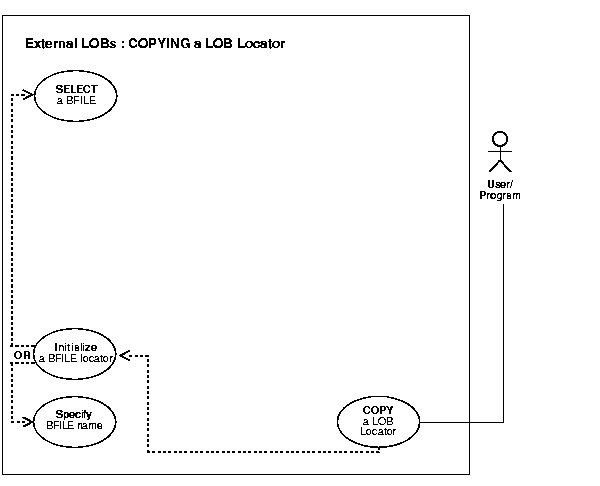
| See Also:
Table 12-1, "Use Case Model: External LOBs (BFILEs)", for all basic operations of Internal Temporary LOBs |
This procedure describes how to copy a LOB locator for a BFILE.
Not applicable.
See Chapter 3, "LOB Support in Different Programmatic Environments" for a list of available functions in each programmatic environment. Use the following syntax references for each programmatic environment:
This example assigns one BFILE locator to another related to ad_graphic.
The examples are provided in the following five programmatic environments:
|
Note: Assigning one BFILE to another using PL/SQL entails using the "=" sign. This is discussed in more detail with regard to "Read Consistent Locators" in Chapter 5, "Large Objects: Advanced Topics". |
/* Copying a LOB locator for a BFILE. [Example script: 4039.sql] */ /* Procedure BFILEAssign_proc is not part of DBMS_LOB package: */ CREATE OR REPLACE PROCEDURE BFILEAssign_proc IS File_loc1 BFILE; File_loc2 BFILE; BEGIN SELECT Photo INTO File_loc1 FROM print_media WHERE Product_ID = 3060 AND ad_id = 11001 FOR UPDATE; /* Assign File_loc1 to File_loc2 so that they both refer to the same operating system file: */ File_loc2 := File_loc1; /* Now you can read the bfile from either File_loc1 or File_loc2. */ END;
/* Copying a LOB locator for a BFILE. [Example script: 4040.c] */ /* Select the lob/bfile from the Print_media table */ void selectLob(Lob_loc, errhp, svchp, stmthp) OCILobLocator *Lob_loc; OCIError *errhp; OCISvcCtx *svchp; OCIStmt *stmthp; { OCIDefine *dfnhp, *dfnhp2; text *selstmt = (text *) "SELECT ad_graphic FROM Print_media \ WHERE product_id = 3106 AND ad_id = 13001"; /* Prepare the SQL select statement */ checkerr (errhp, OCIStmtPrepare(stmthp, errhp, selstmt, (ub4) strlen((char *) selstmt), (ub4) OCI_NTV_SYNTAX, (ub4)OCI_DEFAULT)); /* Call define for the bfile column */ checkerr (errhp, OCIDefineByPos(stmthp, &dfnhp, errhp, 1, (dvoid *)&Lob_loc, 0 , SQLT_BFILE, (dvoid *)0, (ub2 *)0, (ub2 *)0, OCI_DEFAULT) || OCIDefineByPos(stmthp, &dfnhp2, errhp, 2, (dvoid *)&Lob_loc, 0 , SQLT_BFILE, (dvoid *)0, (ub2 *)0, (ub2 *)0, OCI_DEFAULT)); /* Execute the SQL select statement */ checkerr (errhp, OCIStmtExecute(svchp, stmthp, errhp, (ub4) 1, (ub4) 0, (CONST OCISnapshot*) 0, (OCISnapshot*) 0, (ub4) OCI_DEFAULT)); } void BfileAssign(envhp, errhp, svchp, stmthp) OCIEnv *envhp; OCIError *errhp; OCISvcCtx *svchp; OCIStmt *stmthp; { OCILobLocator *src_loc; OCILobLocator *dest_loc; /* Allocate the locator descriptors */ (void) OCIDescriptorAlloc((dvoid *) envhp, (dvoid **) &src_loc, (ub4) OCI_DTYPE_FILE, (size_t) 0, (dvoid **) 0); (void) OCIDescriptorAlloc((dvoid *) envhp, (dvoid **) &dest_loc, (ub4) OCI_DTYPE_FILE, (size_t) 0, (dvoid **) 0); /* Select the bfile */ selectLob(src_loc, errhp, svchp, stmthp); checkerr(errhp, OCILobLocatorAssign(svchp, errhp, src_loc, &dest_loc)); /* Free the locator descriptor */ OCIDescriptorFree((dvoid *)src_loc, (ub4)OCI_DTYPE_FILE); OCIDescriptorFree((dvoid *)dest_loc, (ub4)OCI_DTYPE_FILE); }
* Copying a LOB locator for a BFILE. [Example script: 4041.pco] IDENTIFICATION DIVISION. PROGRAM-ID. BFILE-COPY-LOCATOR. ENVIRONMENT DIVISION. DATA DIVISION. WORKING-STORAGE SECTION. 01 USERID PIC X(11) VALUES "SAMP/SAMP". 01 BFILE1 SQL-BFILE. 01 BFILE2 SQL-BFILE. 01 ORASLNRD PIC 9(4). EXEC SQL INCLUDE SQLCA END-EXEC. EXEC ORACLE OPTION (ORACA=YES) END-EXEC. EXEC SQL INCLUDE ORACA END-EXEC. PROCEDURE DIVISION. BILFE-COPY-LOCATOR. EXEC SQL WHENEVER SQLERROR DO PERFORM SQL-ERROR END-EXEC. EXEC SQL CONNECT :USERID END-EXEC. * Allocate and initialize the BFILE locator: EXEC SQL ALLOCATE :BFILE1 END-EXEC. EXEC SQL ALLOCATE :BFILE2 END-EXEC. EXEC SQL WHENEVER NOT FOUND GOTO END-OF-BFILE END-EXEC. EXEC SQL SELECT AD_GRAPHIC INTO :BFILE1 FROM PRINT_MEDIA WHERE PRODUCT_ID = 3106 AND AD_ID = 13001 END-EXEC. EXEC SQLLOB ASSIGN :BFILE1 TO :BFILE2 END-EXEC. END-OF-BFILE. EXEC SQL WHENEVER NOT FOUND CONTINUE END-EXEC. EXEC SQL FREE :BFILE1 END-EXEC. EXEC SQL FREE :BFILE2 END-EXEC. STOP RUN. SQL-ERROR. EXEC SQL WHENEVER SQLERROR CONTINUE END-EXEC. MOVE ORASLNR TO ORASLNRD. DISPLAY " ". DISPLAY "ORACLE ERROR DETECTED ON LINE ", ORASLNRD, ":". DISPLAY " ". DISPLAY SQLERRMC. EXEC SQL ROLLBACK WORK RELEASE END-EXEC. STOP RUN.
/* Copying a LOB locator for a BFILE. [Example script: 4042.pc] */ #include <oci.h> #include <stdio.h> #include <sqlca.h> void Sample_Error() { EXEC SQL WHENEVER SQLERROR CONTINUE; printf("%.*s\n", sqlca.sqlerrm.sqlerrml, sqlca.sqlerrm.sqlerrmc); EXEC SQL ROLLBACK WORK RELEASE; exit(1); } void BFILEAssign_proc() { OCIBFileLocator *Lob_loc1, *Lob_loc2; EXEC SQL WHENEVER SQLERROR DO Sample_Error(); EXEC SQL ALLOCATE :Lob_loc1; EXEC SQL ALLOCATE :Lob_loc2; EXEC SQL SELECT ad_graphic INTO :Lob_loc1 FROM Print_media WHERE product_id = 2056 AND ad_id = 12001; /* Assign Lob_loc1 to Lob_loc2 so that they both refer to the same operating system file: */ EXEC SQL LOB ASSIGN :Lob_loc1 TO :Lob_loc2; /* Now you can read the BFILE from either Lob_loc1 or Lob_loc2 */ } void main() { char *samp = "samp/samp"; EXEC SQL CONNECT :samp; BFILEAssign_proc(); EXEC SQL ROLLBACK WORK RELEASE; }
// Copying a LOB locator for a BFILE. [Example script: 4044.java] import java.sql.DriverManager; import java.sql.Connection; import java.sql.Types; import java.sql.Statement; import java.sql.PreparedStatement; import java.sql.ResultSet; import java.sql.SQLException; // Oracle Specific JDBC classes: import oracle.sql.*; import oracle.jdbc.driver.*; public class Ex4_81 { public static void main (String args []) throws Exception { // Load the Oracle JDBC driver: DriverManager.registerDriver(new oracle.jdbc.driver.OracleDriver()); // Connect to the database: Connection conn = DriverManager.getConnection ("jdbc:oracle:oci8:@", "samp", "samp"); // It's faster when auto commit is off: conn.setAutoCommit (false); // Create a Statement: Statement stmt = conn.createStatement (); try { BFILE lob_loc1 = null; BFILE lob_loc2 = null; ResultSet rset = stmt.executeQuery ( "SELECT ad_graphic FROM Print_media WHERE product_id = 3106 AND ad_id = 13001"); if (rset.next()) { lob_loc1 = ((OracleResultSet)rset).getBFILE (1); } // Assign lob_loc1 to lob_loc2 so that they both refer // to the same operating system file. // Now the BFILE can be read through either of the locators: lob_loc2 = lob_loc1; stmt.close(); conn.commit(); conn.close(); } //catch (SQLException e) catch (Exception e) { e.printStackTrace(); } } }
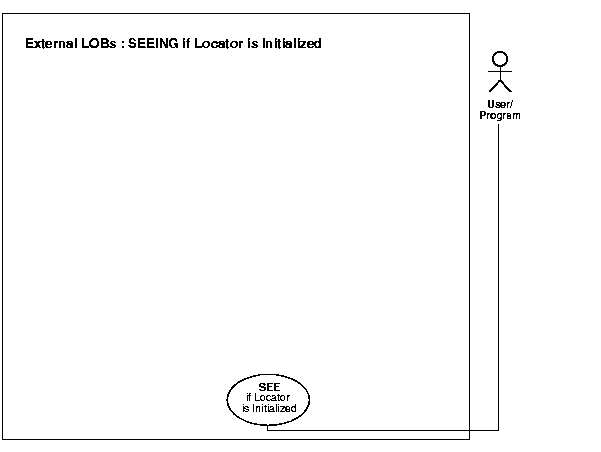
| See Also:
Table 12-1, "Use Case Model: External LOBs (BFILEs)", for all basic operations of Internal Temporary LOBs |
This procedure describes how to determine if a BFILE LOB locator is initialized.
On the client side, before you call any OCILob* interfaces (such as OCILobWrite), or any programmatic environments that use OCILob* interfaces, first initialize the LOB locator, using a SELECT, for example.
If your application requires a locator to be passed from one function to another, you may want to verify that the locator has already been initialized. If the locator is not initialized, you could design your application either to return an error or to perform the SELECT before calling the OCILob* interface.
See Chapter 3, "LOB Support in Different Programmatic Environments" for a list of available functions in each programmatic environment. Use the following syntax references for each programmatic environment:
Not applicable.
The examples are provided in the following programmatic environments:
/* Determining if a LOB locator for a BFILE is initialized. [Example script: 4045.c]*/ /* Select the lob/bfile from the Print_media table */ void selectLob(Lob_loc, errhp, svchp, stmthp) OCILobLocator *Lob_loc; OCIError *errhp; OCISvcCtx *svchp; OCIStmt *stmthp; { OCIDefine *dfnhp, *dfnhp2; text *selstmt = (text *) "SELECT ad_graphic FROM Print_media \ WHERE product_id = 3106 AND ad_id = 13001"; /* Prepare the SQL select statement */ checkerr (errhp, OCIStmtPrepare(stmthp, errhp, selstmt, (ub4) strlen((char *) selstmt), (ub4) OCI_NTV_SYNTAX, (ub4)OCI_DEFAULT)); /* Call define for the bfile column */ checkerr (errhp, OCIDefineByPos(stmthp, &dfnhp, errhp, 1, (dvoid *)&Lob_loc, 0 , SQLT_BFILE, (dvoid *)0, (ub2 *)0, (ub2 *)0, OCI_DEFAULT) || OCIDefineByPos(stmthp, &dfnhp2, errhp, 2, (dvoid *)&Lob_loc, 0 , SQLT_BFILE, (dvoid *)0, (ub2 *)0, (ub2 *)0, OCI_DEFAULT)); /* Execute the SQL select statement */ checkerr (errhp, OCIStmtExecute(svchp, stmthp, errhp, (ub4) 1, (ub4) 0, (CONST OCISnapshot*) 0, (OCISnapshot*) 0, (ub4) OCI_DEFAULT)); } void BfileIsInit(envhp, errhp, svchp, stmthp) OCIEnv *envhp; OCIError *errhp; OCISvcCtx *svchp; OCIStmt *stmthp; { OCILobLocator *bfile_loc; boolean is_init; /* Allocate the locator descriptors */ (void) OCIDescriptorAlloc((dvoid *) envhp, (dvoid **) &bfile_loc, (ub4) OCI_DTYPE_FILE, (size_t) 0, (dvoid **) 0); /* Select the bfile */ selectLob(bfile_loc, errhp, svchp, stmthp); checkerr(errhp, OCILobLocatorIsInit(envhp, errhp, bfile_loc, &is_init)); if (is_init == TRUE) { printf("Locator is initialized\n"); } else { printf("Locator is not initialized\n"); } /* Free the locator descriptor */ OCIDescriptorFree((dvoid *)bfile_loc, (ub4)OCI_DTYPE_FILE); }
/* Determining if a LOB locator for a BFILE is initialized. [Example script: 4046.pc] Pro*C/C++ has no form of embedded SQL statement to determine if a BFILE locator is initialized. Locators in Pro*C/C++ are initialized when they are allocated with the EXEC SQL ALLOCATE statement. However, an example can be written that uses embedded SQL and the OCI as shown here: */ #include <sql2oci.h> #include <stdio.h> #include <sqlca.h> void Sample_Error() { EXEC SQL WHENEVER SQLERROR CONTINUE; printf("%.*s\n", sqlca.sqlerrm.sqlerrml, sqlca.sqlerrm.sqlerrmc); EXEC SQL ROLLBACK WORK RELEASE; exit(1); } void BFILELocatorIsInit_proc() { OCIBFileLocator *Lob_loc; OCIEnv *oeh; OCIError *err; boolean isInitialized = 0; EXEC SQL WHENEVER SQLERROR DO Sample_Error(); EXEC SQL ALLOCATE :Lob_loc; EXEC SQL SELECT Mtab.ad_graphic INTO :Lob_loc FROM Print_media PMtab WHERE PMtab.product_id = 2056 AND ad_id = 12001; /* Get the OCI Environment Handle using a SQLLIB Routine: */ (void) SQLEnvGet(SQL_SINGLE_RCTX, &oeh); /* Allocate the OCI Error Handle: */ (void) OCIHandleAlloc((dvoid *)oeh, (dvoid **)&err, (ub4)OCI_HTYPE_ERROR, (ub4)0, (dvoid **)0); /* Use the OCI to determine if the locator is Initialized: */ (void) OCILobLocatorIsInit(oeh, err, Lob_loc, &isInitialized); if (isInitialized) printf("Locator is initialized\n"); else printf("Locator is not initialized\n"); /* Note that in this example, the locator is initialized: */ /* Deallocate the OCI Error Handle: */ (void) OCIHandleFree(err, OCI_HTYPE_ERROR); /* Release resources held by the locator: */ EXEC SQL FREE :Lob_loc; } void main() { char *samp = "samp/samp"; EXEC SQL CONNECT :samp; BFILELocatorIsInit_proc(); EXEC SQL ROLLBACK WORK RELEASE; }
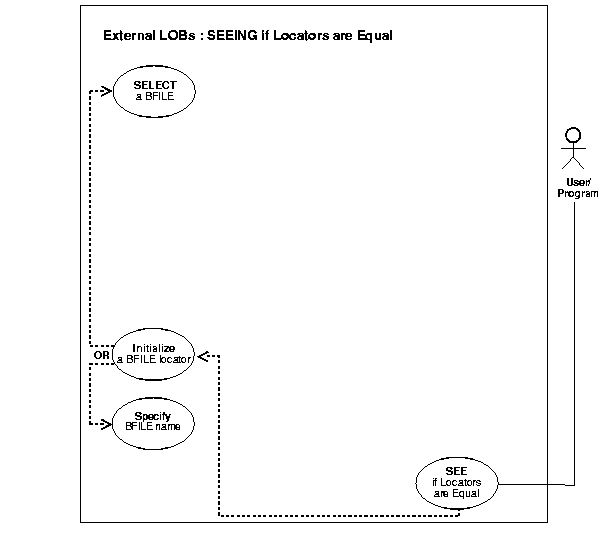
| See Also:
Table 12-1, "Use Case Model: External LOBs (BFILEs)", for all basic operations of Internal Temporary LOBs |
This procedure describes how to see if one BFILE LOB locator is equal to another.
Not applicable.
See Chapter 3, "LOB Support in Different Programmatic Environments" for a list of available functions in each programmatic environment. Use the following syntax references for each programmatic environment:
If two locators are equal, this means that they refer to the same version of the LOB data (see "Read Consistent Locators" in Chapter 5, "Large Objects: Advanced Topics").
The examples are provided in the following three programmatic environments:
/* Determining if one LOB locator for a BFILE is equal to another */ /* [Example script: 4047.c] */ /* Select the lob/bfile from the Print_media table */ void selectLob(Lob_loc, errhp, svchp, stmthp) OCILobLocator *Lob_loc; OCIError *errhp; OCISvcCtx *svchp; OCIStmt *stmthp; { OCIDefine *dfnhp, *dfnhp2; text *selstmt = (text *) "SELECT ad_graphic FROM Print_media \ WHERE product_id = 3106 AND ad_id = 13001"; /* Prepare the SQL select statement */ checkerr (errhp, OCIStmtPrepare(stmthp, errhp, selstmt, (ub4) strlen((char *) selstmt), (ub4) OCI_NTV_SYNTAX, (ub4)OCI_DEFAULT)); /* Call define for the bfile column */ checkerr (errhp, OCIDefineByPos(stmthp, &dfnhp, errhp, 1, (dvoid *)&Lob_loc, 0 , SQLT_BFILE, (dvoid *)0, (ub2 *)0, (ub2 *)0, OCI_DEFAULT) || OCIDefineByPos(stmthp, &dfnhp2, errhp, 2, (dvoid *)&Lob_loc, 0 , SQLT_BFILE, (dvoid *)0, (ub2 *)0, (ub2 *)0, OCI_DEFAULT)); /* Execute the SQL select statement */ checkerr (errhp, OCIStmtExecute(svchp, stmthp, errhp, (ub4) 1, (ub4) 0, (CONST OCISnapshot*) 0, (OCISnapshot*) 0, (ub4) OCI_DEFAULT)); } void BfileIsEqual(envhp, errhp, svchp, stmthp) OCIEnv *envhp; OCIError *errhp; OCISvcCtx *svchp; OCIStmt *stmthp; { OCILobLocator *bfile_loc1; OCILobLocator *bfile_loc2; boolean is_equal; /* Allocate the locator descriptors */ (void) OCIDescriptorAlloc((dvoid *) envhp, (dvoid **) &bfile_loc1, (ub4) OCI_DTYPE_FILE, (size_t) 0, (dvoid **) 0); (void) OCIDescriptorAlloc((dvoid *) envhp, (dvoid **) &bfile_loc2, (ub4) OCI_DTYPE_FILE, (size_t) 0, (dvoid **) 0); /* Select the bfile */ selectLob(bfile_loc1, errhp, svchp, stmthp); checkerr(errhp, OCILobLocatorAssign(svchp, errhp, bfile_loc1, &bfile_loc2)); checkerr(errhp, OCILobIsEqual(envhp, bfile_loc1, bfile_loc2, &is_equal)); if (is_equal == TRUE) { printf("Locators are equal\n"); } else { printf("Locators are not equal\n"); } /* Free the locator descriptor */ OCIDescriptorFree((dvoid *)bfile_loc1, (ub4)OCI_DTYPE_FILE); OCIDescriptorFree((dvoid *)bfile_loc2, (ub4)OCI_DTYPE_FILE); }
/* Determining if one LOB locator for a BFILE is equal to another */ [Example script: 4048.pc] Pro*C/C++ does not provide a mechanism to test the equality of two locators However, by using the OCI directly, two locators can be compared to determine whether or not they are equal as this example demonstrates: */ #include <sql2oci.h> #include <stdio.h> #include <sqlca.h> void Sample_Error() { EXEC SQL WHENEVER SQLERROR CONTINUE; printf("%.*s\n", sqlca.sqlerrm.sqlerrml, sqlca.sqlerrm.sqlerrmc); EXEC SQL ROLLBACK WORK RELEASE; exit(1); } void BFILELocatorIsEqual_proc() { OCIBFileLocator *Lob_loc1, *Lob_loc2; OCIEnv *oeh; boolean isEqual = 0; EXEC SQL WHENEVER SQLERROR DO Sample_Error(); EXEC SQL ALLOCATE :Lob_loc1; EXEC SQL ALLOCATE :Lob_loc2; EXEC SQL SELECT ad_graphic INTO :Lob_loc1 FROM Print_media WHERE product_id = 2056 AND ad_id = 12001; EXEC SQL LOB ASSIGN :Lob_loc1 TO :Lob_loc2; /* Now you can read the BFILE from either Lob_loc1 or Lob_loc2 */ /* Get the OCI Environment Handle using a SQLLIB Routine: */ (void) SQLEnvGet(SQL_SINGLE_RCTX, &oeh); /* Call OCI to see if the two locators are Equal: */ (void) OCILobIsEqual(oeh, Lob_loc1, Lob_loc2, &isEqual); if (isEqual) printf("Locators are equal\n"); else printf("Locators are not equal\n"); /* Note that in this example, the LOB locators will be Equal: */ EXEC SQL FREE :Lob_loc1; EXEC SQL FREE :Lob_loc2; } void main() { char *samp = "samp/samp"; EXEC SQL CONNECT :samp; BFILELocatorIsEqual_proc(); EXEC SQL ROLLBACK WORK RELEASE; }
// Determining if one LOB locator for a BFILE is equal to another // [Example script: 4050.java] import java.sql.Connection; import java.sql.Types; import java.sql.Statement; import java.sql.PreparedStatement; import java.sql.ResultSet; import java.sql.SQLException; // Oracle Specific JDBC classes: import oracle.sql.*; import oracle.jdbc.driver.*; public class Ex4_89 { public static void main (String args []) throws Exception { // Load the Oracle JDBC driver: DriverManager.registerDriver(new oracle.jdbc.driver.OracleDriver()); // Connect to the database: Connection conn = DriverManager.getConnection ("jdbc:oracle:oci8:@", "samp", "samp"); // It's faster when auto commit is off: conn.setAutoCommit (false); // Create a Statement: Statement stmt = conn.createStatement (); try { BFILE lob_loc1 = null; BFILE lob_loc2 = null; ResultSet rset = stmt.executeQuery ( "SELECT ad_graphic FROM Print_media WHERE product_id = 3106 AND ad_id = 13001"); if (rset.next()) { lob_loc1 = ((OracleResultSet)rset).getBFILE (1); } // Set both LOBS to reference the same BFILE: lob_loc2 = lob_loc1; // Note that in this example, the Locators will be equal: if (lob_loc1.equals(lob_loc2)) { // The Locators are equal: System.out.println("The BFILEs are equal"); } else { // The Locators are different: System.out.println("The BFILEs are NOT equal"); } stmt.close(); conn.commit(); conn.close(); } catch (SQLException e) { e.printStackTrace(); } } }
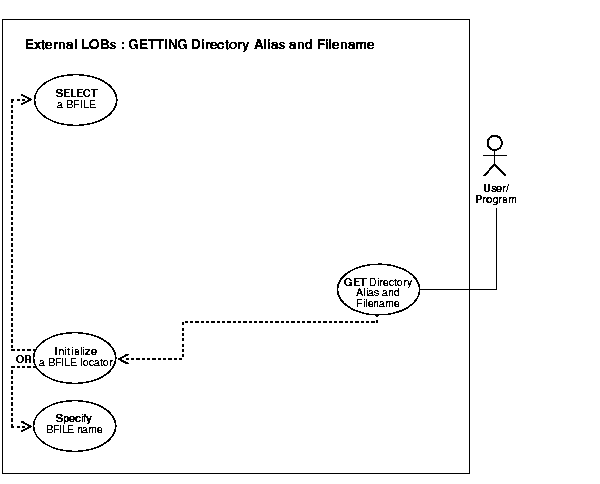
| See Also:
Table 12-1, "Use Case Model: External LOBs (BFILEs)", for all basic operations of Internal Temporary LOBs |
This procedure describes how to get DIRECTORY alias and filename.
Not applicable.
See Chapter 3, "LOB Support in Different Programmatic Environments" for a list of available functions in each programmatic environment. Use the following syntax references for each programmatic environment:
This example retrieves the DIRECTORY alias and filename related to the BFILE, ad_graphic.
The examples are provided in the following six programmatic environments:
/* Getting the directory alias and filename [Example script: 4051.sql] */ CREATE OR REPLACE PROCEDURE getNameBFILE_proc IS File_loc BFILE; DirAlias_name VARCHAR2(30); File_name VARCHAR2(40); BEGIN SELECT ad_graphic INTO File_loc FROM Print_media WHERE product_id = 3060 AND ad_id = 11001; DBMS_LOB.FILEGETNAME(File_loc, DirAlias_name, File_name); /* do some processing based on the directory alias and file names */ END;
/* Getting the directory alias and filename [Example script: 4052.c] */ /* Select the lob/bfile from the Print_media table */ void selectLob(Lob_loc, errhp, svchp, stmthp) OCILobLocator *Lob_loc; OCIError *errhp; OCISvcCtx *svchp; OCIStmt *stmthp; { OCIDefine *dfnhp, *dfnhp2; text *selstmt = (text *) "SELECT ad_graphic FROM Print_media \ WHERE product_id = 3106"; /* Prepare the SQL select statement */ checkerr (errhp, OCIStmtPrepare(stmthp, errhp, selstmt, (ub4) strlen((char *) selstmt), (ub4) OCI_NTV_SYNTAX, (ub4)OCI_DEFAULT)); /* Call define for the bfile column */ checkerr (errhp, OCIDefineByPos(stmthp, &dfnhp, errhp, 1, (dvoid *)&Lob_loc, 0 , SQLT_BFILE, (dvoid *)0, (ub2 *)0, (ub2 *)0, OCI_DEFAULT) || OCIDefineByPos(stmthp, &dfnhp2, errhp, 2, (dvoid *)&Lob_loc, 0 , SQLT_BFILE, (dvoid *)0, (ub2 *)0, (ub2 *)0, OCI_DEFAULT)); /* Execute the SQL select statement */ checkerr (errhp, OCIStmtExecute(svchp, stmthp, errhp, (ub4) 1, (ub4) 0, (CONST OCISnapshot*) 0, (OCISnapshot*) 0, (ub4) OCI_DEFAULT)); } void BfileGetDirFile(envhp, errhp, svchp, stmthp) OCIEnv *envhp; OCIError *errhp; OCISvcCtx *svchp; OCIStmt *stmthp; { OCILobLocator *bfile_loc; OraText dir_alias[32] = NULL; OraText filename[256] = NULL; ub2 d_length = 32; ub2 f_length = 256; /* Allocate the locator descriptors */ (void) OCIDescriptorAlloc((dvoid *) envhp, (dvoid **) &bfile_loc, (ub4) OCI_DTYPE_FILE, (size_t) 0, (dvoid **) 0); /* Select the bfile */ selectLob(bfile_loc, errhp, svchp, stmthp); checkerr(errhp, OCILobFileGetName(envhp, errhp, bfile_loc, dir_alias, &d_length, filename, &f_length)); printf("Directory Alias : [%s]\n", dir_alias); printf("File name : [%s]\n", filename); /* Free the locator descriptor */ OCIDescriptorFree((dvoid *)bfile_loc, (ub4)OCI_DTYPE_FILE); }
d * Getting the directory alias and filename [Example script: 4053.pco] IDENTIFICATION DIVISION. PROGRAM-ID. BFILE-DIR-ALIAS. ENVIRONMENT DIVISION. DATA DIVISION. WORKING-STORAGE SECTION. 01 USERID PIC X(11) VALUES "SAMP/SAMP". 01 BFILE1 SQL-BFILE. 01 DIR-ALIAS PIC X(30) VARYING. 01 FNAME PIC X(30) VARYING. 01 ORASLNRD PIC 9(4). EXEC SQL INCLUDE SQLCA END-EXEC. EXEC ORACLE OPTION (ORACA=YES) END-EXEC. EXEC SQL INCLUDE ORACA END-EXEC. PROCEDURE DIVISION. BFILE-DIR-ALIAS. EXEC SQL WHENEVER SQLERROR DO PERFORM SQL-ERROR END-EXEC. EXEC SQL CONNECT :USERID END-EXEC. * Allocate and initialize the BFILE locator: EXEC SQL ALLOCATE :BFILE1 END-EXEC. EXEC SQL WHENEVER NOT FOUND GOTO END-OF-BFILE END-EXEC. * Populate the BFILE locator: EXEC SQL SELECT AD_GRAPHIC INTO :BFILE1 FROM PRINT_MEDIA WHERE PRODUCT_ID = 3106 AND AD_ID = 13001 END-EXEC. * Use the LOB DESCRIBE functionality to get * the directory alias and the filename: EXEC SQL LOB DESCRIBE :BFILE1 GET DIRECTORY, FILENAME INTO :DIR-ALIAS, :FNAME END-EXEC. DISPLAY "DIRECTORY: ", DIR-ALIAS-ARR, "FNAME: ", FNAME-ARR. END-OF-BFILE. EXEC SQL WHENEVER NOT FOUND CONTINUE END-EXEC. EXEC SQL FREE :BFILE1 END-EXEC. STOP RUN. SQL-ERROR. EXEC SQL WHENEVER SQLERROR CONTINUE END-EXEC. MOVE ORASLNR TO ORASLNRD. DISPLAY " ". DISPLAY "ORACLE ERROR DETECTED ON LINE ", ORASLNRD, ":". DISPLAY " ". DISPLAY SQLERRMC. EXEC SQL ROLLBACK WORK RELEASE END-EXEC. STOP RUN.
/* Getting the directory alias and filename [Example script: 4054.pc] */ #include <oci.h> #include <stdio.h> #include <sqlca.h> void Sample_Error() { EXEC SQL WHENEVER SQLERROR CONTINUE; printf("%.*s\n", sqlca.sqlerrm.sqlerrml, sqlca.sqlerrm.sqlerrmc); EXEC SQL ROLLBACK WORK RELEASE; exit(1); } void getBFILEDirectoryAndFilename_proc() { OCIBFileLocator *Lob_loc; char Directory[31], Filename[255]; /* Datatype Equivalencing is Optional: */ EXEC SQL VAR Directory IS STRING; EXEC SQL VAR Filename IS STRING; EXEC SQL WHENEVER SQLERROR DO Sample_Error(); EXEC SQL ALLOCATE :Lob_loc; /* Select the BFILE: */ EXEC SQL SELECT ad_graphic INTO :Lob_loc FROM print_media WHERE product_id = 2056 AND ad_id = 12001; /* Open the BFILE: */ EXEC SQL LOB OPEN :Lob_loc READ ONLY; /* Get the Directory Alias and Filename: */ EXEC SQL LOB DESCRIBE :Lob_loc GET DIRECTORY, FILENAME INTO :Directory, :Filename; /* Close the BFILE: */ EXEC SQL LOB CLOSE :Lob_loc; printf("Directory Alias: %s\n", Directory); printf("Filename: %s\n", Filename); /* Release resources held by the locator: */ EXEC SQL FREE :Lob_loc; } void main() { char *samp = "samp/samp"; EXEC SQL CONNECT :samp; getBFILEDirectoryAndFilename_proc(); EXEC SQL ROLLBACK WORK RELEASE; }
'Getting the directory alias and filename [Example script: 4056.txt] 'The PL/SQL packages and tables mentioned here are not part of the 'standard OO4O installation: Dim MySession As OraSession Dim OraDb As OraDatabase Dim OraAdGraphic1 As OraBfile, OraSql As OraSqlStmt Set MySession = CreateObject("OracleInProcServer.XOraSession") Set OraDb = MySession.OpenDatabase("pmschema", "pm/pm", 0&) OraDb.Connection.BeginTrans Set OraParameters = OraDb.Parameters OraParameters.Add "id", 2056, ORAPARM_INPUT 'Define out parameter of BFILE type: OraParameters.Add "MyAdGraphic", Null, ORAPARM_OUTPUT OraParameters("MyAdGraphic").ServerType = ORATYPE_BFILE Set OraSql = OraDb.CreateSql( "BEGIN SELECT ad_graphic INTO :MyAdGraphic FROM Print_media WHERE product_id = :id; END;", ORASQL_FAILEXEC) Set OraAdGraphic1 = OraParameters("MyAdGraphic").Value 'Get Directory alias and filename: MsgBox " Directory alias is " & OraAdGraphic1.DirectoryName & " Filename is " & OraAdGraphic1.filename OraDb.Connection.CommitTrans
// Getting the directory alias and filename [Example script: 4057.java] import java.io.InputStream; import java.io.OutputStream; // Core JDBC classes: import java.sql.DriverManager; import java.sql.Connection; import java.sql.Types; import java.sql.Statement; import java.sql.PreparedStatement; import java.sql.ResultSet; import java.sql.SQLException; // Oracle Specific JDBC classes: import oracle.sql.*; import oracle.jdbc.driver.*; public class Ex4_74 { static final int MAXBUFSIZE = 32767; public static void main (String args []) throws Exception { // Load the Oracle JDBC driver: DriverManager.registerDriver(new oracle.jdbc.driver.OracleDriver()); // Connect to the database: Connection conn = DriverManager.getConnection ("jdbc:oracle:oci8:@", "samp", "samp"); // It's faster when auto commit is off: conn.setAutoCommit (false); // Create a Statement: Statement stmt = conn.createStatement (); try { BFILE lob_loc = null; ResultSet rset = stmt.executeQuery ( "SELECT ad_graphic FROM Print_media WHERE product_id = 3106 AND ad_id = 13001"); if (rset.next()) { lob_loc = ((OracleResultSet)rset).getBFILE (1); } // See if the BFILE exists: System.out.println("Result from fileExists(): " + lob_loc.fileExists()); // Return the length of the BFILE: long length = lob_loc.length(); System.out.println("Length of BFILE: " + length); // Get the directory alias for this BFILE: System.out.println("Directory alias: " + lob_loc.getDirAlias()); // Get the file name for this BFILE: System.out.println("File name: " + lob_loc.getName()); stmt.close(); conn.commit(); conn.close(); } catch (SQLException e) { e.printStackTrace(); } } }
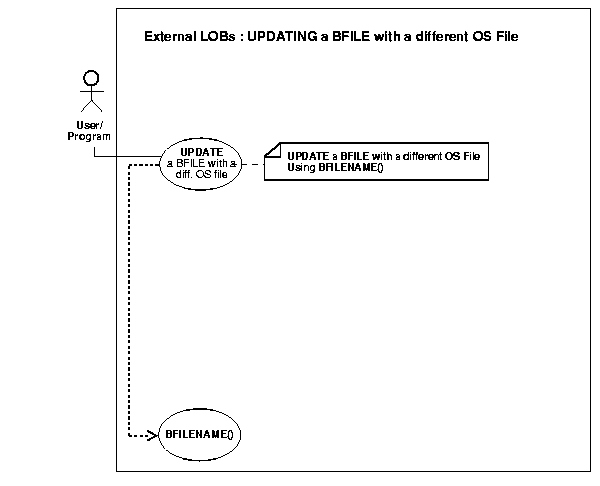
The BFILENAME() function can be called as part of SQL INSERT or UPDATE to initialize a BFILE column or attribute for a particular row by associating it with a physical file in the server's file system.
The DIRECTORY object represented by the directory_alias parameter to this function need not already be defined using SQL DDL before the BFILENAME() function is called in SQL DML or a PL/SQL program. However, the directory object and operating system file must exist by the time you actually use the BFILE locator (for example, as having been used as a parameter to an operation such as OCILobFileOpen(), DBMS_LOB.FILEOPEN(), OCILobOpen(), or DBMS_LOB.OPEN()).
Note that BFILENAME() does not validate privileges on this DIRECTORY object, or check if the physical directory that the DIRECTORY object represents actually exists. These checks are performed only during file access using the BFILE locator that was initialized by the BFILENAME() function.
You can use BFILENAME() as part of a SQL INSERT and UPDATE statement to initialize a BFILE column. You can also use it to initialize a BFILE locator variable in a PL/SQL program, and use that locator for file operations. However, if the corresponding directory alias or filename does not exist, then PL/SQL DBMS_LOB routines that use this variable will generate errors.
The directory_alias parameter in the BFILENAME() function must be specified taking case-sensitivity of the directory name into consideration.
FUNCTION BFILENAME(directory_alias IN VARCHAR2, filename IN VARCHAR2) RETURN BFILE;
| See Also:
"DIRECTORY Name Specification" for information about the use of uppercase letters in the directory name, and |
Use the following syntax references:
This example updates the Print_media table by means of the BFILENAME function.
The example is provided in SQL syntax and applies to all programmatic environments:
/* Updating a BFILE using BFILENAME() [Example script: 4059.sql] */ UPDATE Print_media SET ad_graphic = BFILENAME('ADGRAPHIC_DIR', 'keyboard_graphic_3106_13001') WHERE product_id = 3106 AND ad_id = 13001;
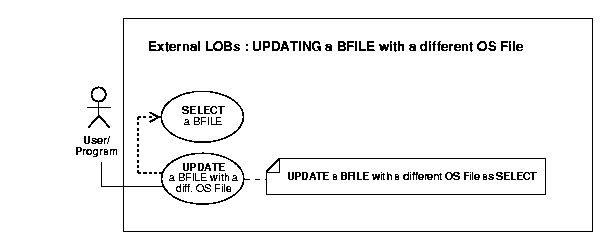
This procedure describes how to UPDATE a BFILE by selecting a BFILE from another table.
There is no copy function for BFILEs, so you have to use UPDATE as SELECT if you want to copy a BFILE from one location to another. Because BFILEs use reference semantics instead of copy semantics, only the BFILE locator is copied from one row to another row. This means that you cannot make a copy of an external LOB value without issuing an operating system command to copy the operating system file.
Use the following syntax references:
This example updates the table, Voiceover_tab by selecting from the archival storage table, VoiceoverLib_tab./
The example is provided in SQL and applies to all programmatic environments:
UPDATE Adheader_tab SET (header_name, creation_date, header_text, logo) = (SELECT * FROM AdheaderLib_tab AHtab WHERE AHtab.creation_date = '08/08/2001');
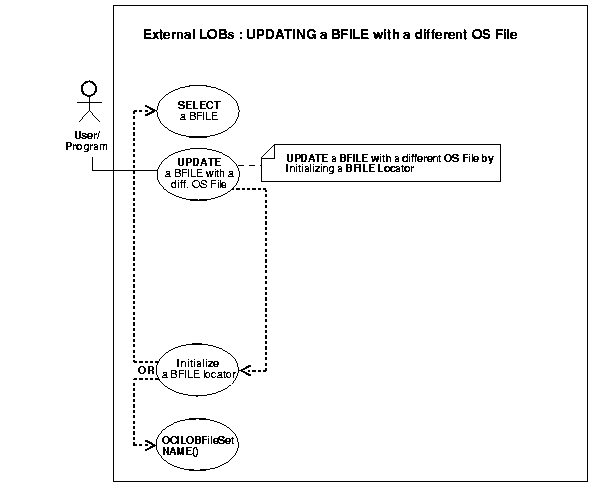
This procedure describes how to UPDATE a BFILE by initializing a BFILE locator.
You must initialize the BFILE locator bind variable to a directory alias and filename before issuing the update statement.
See Chapter 3, "LOB Support in Different Programmatic Environments" for a list of available functions in each programmatic environment. Use the following syntax references for each programmatic environment:
Not applicable.
The examples are provided in six programmatic environments:
/* Updating a BFILE by initializing a BFILE locator. [Example script:4061.sql] Procedure updateUseBindVariable_proc is not part of DBMS_LOB package: */ CREATE OR REPLACE PROCEDURE updateUseBindVariable_proc (File_loc BFILE) IS BEGIN UPDATE Print_media SET ad_graphic = File_loc WHERE product_id = 3060 AND ad_id = 11001; END; DECLARE File_loc BFILE; BEGIN SELECT ad_graphic INTO File_loc FROM Print_media WHERE product_id = 3060 AND ad_id = 11001; updateUseBindVariable_proc (File_loc); COMMIT; END;
/* Updating a BFILE by initializing a BFILE locator. [Example script: 4062.c] */ void BfileUpdate(envhp, errhp, svchp, stmthp) OCIEnv *envhp; OCIError *errhp; OCISvcCtx *svchp; OCIStmt *stmthp; { OCILobLocator *Lob_loc; OCIBind *bndhp, *bndhp2; text *updstmt = (text *) "UPDATE Print_media SET ad_graphic = :Lob_loc WHERE product_id = 3106 AND ad_id = 13001"; OraText *Dir = (OraText *)"ADGRAPHIC_DIR", *Name = (OraText *)"keyboard_graphic_3106_13001"; /* Prepare the SQL statement: */ checkerr (errhp, OCIStmtPrepare(stmthp, errhp, updstmt, (ub4) strlen((char *) updstmt), (ub4) OCI_NTV_SYNTAX, (ub4)OCI_DEFAULT)); /* Allocate Locator resources: */ (void) OCIDescriptorAlloc((dvoid *) envhp, (dvoid **) &Lob_loc, (ub4)OCI_DTYPE_FILE, (size_t) 0, (dvoid **) 0); checkerr (errhp, OCILobFileSetName(envhp, errhp, &Lob_loc, Dir, (ub2)strlen((char *)Dir), Name,(ub2)strlen((char *)Name))); checkerr (errhp, OCIBindByPos(stmthp, &bndhp, errhp, (ub4) 1, (dvoid *) &Lob_loc, (sb4) 0, SQLT_BFILE, (dvoid *) 0, (ub2 *)0, (ub2 *)0, (ub4) 0, (ub4 *) 0, (ub4) OCI_DEFAULT) || OCIBindByPos(stmthp, &bndhp2, errhp, (ub4) 2, (dvoid *) &Lob_loc, (sb4) 0, SQLT_BFILE, (dvoid *) 0, (ub2 *)0, (ub2 *)0, (ub4) 0, (ub4 *) 0, (ub4) OCI_DEFAULT) ); /* Execute the SQL statement: */ checkerr (errhp, OCIStmtExecute(svchp, stmthp, errhp, (ub4) 1, (ub4) 0, (CONST OCISnapshot*) 0, (OCISnapshot*) 0, (ub4) OCI_DEFAULT)); /* Free LOB resources: */ OCIDescriptorFree((dvoid *) Lob_loc, (ub4) OCI_DTYPE_FILE); }
* Updating a BFILE by initializing a BFILE locator. [Example script: 4063.pco] IDENTIFICATION DIVISION. PROGRAM-ID. BFILE-UPDATE. ENVIRONMENT DIVISION. DATA DIVISION. WORKING-STORAGE SECTION. 01 USERID PIC X(11) VALUES "SAMP/SAMP". 01 BFILE1 SQL-BFILE. 01 BFILE-IND PIC S9(4) COMP. 01 DIR-ALIAS PIC X(30) VARYING. 01 FNAME PIC X(30) VARYING. 01 ORASLNRD PIC 9(4). EXEC SQL INCLUDE SQLCA END-EXEC. EXEC ORACLE OPTION (ORACA=YES) END-EXEC. EXEC SQL INCLUDE ORACA END-EXEC. PROCEDURE DIVISION. BFILE-UPDATE. EXEC SQL WHENEVER SQLERROR DO PERFORM SQL-ERROR END-EXEC. EXEC SQL CONNECT :USERID END-EXEC. * Allocate and initialize the BFILE locator: EXEC SQL ALLOCATE :BFILE1 END-EXEC. * Populate the BFILE: EXEC SQL WHENEVER NOT FOUND GOTO END-OF-BFILE END-EXEC. EXEC ORACLE OPTION (SELECT_ERROR=NO) END-EXEC. EXEC SQL SELECT AD_GRAPHIC INTO :BFILE1:BFILE-IND FROM PRINT_MEDIA WHERE PRODUCT_ID = 3060 AND AD_ID = 13001 END-EXEC. * Make graphic associated with product_id=3106 same as product_id=3060 * and ad_id = 13001: EXEC SQL UPDATE PRINT_MEDIA SET AD_GRAPHIC = :BFILE1:BFILE-IND WHERE PRODUCT_ID = 3106 AND AD_ID = 13001 END-EXEC. * Free the BFILE: END-OF-BFILE. EXEC SQL WHENEVER NOT FOUND CONTINUE END-EXEC. EXEC SQL FREE :BFILE1 END-EXEC. EXEC SQL ROLLBACK WORK RELEASE END-EXEC. STOP RUN. SQL-ERROR. EXEC SQL WHENEVER SQLERROR CONTINUE END-EXEC. MOVE ORASLNR TO ORASLNRD. DISPLAY " ". DISPLAY "ORACLE ERROR DETECTED ON LINE ", ORASLNRD, ":". DISPLAY " ". DISPLAY SQLERRMC. EXEC SQL ROLLBACK WORK RELEASE END-EXEC. STOP RUN.
/* Updating a BFILE by initializing a BFILE locator. [Example script: 4064.pc] */ #include <oci.h> #include <stdio.h> #include <sqlca.h> void Sample_Error() { EXEC SQL WHENEVER SQLERROR CONTINUE; printf("%.*s\n", sqlca.sqlerrm.sqlerrml, sqlca.sqlerrm.sqlerrmc); EXEC SQL ROLLBACK WORK RELEASE; exit(1); } void updateUseBindVariable_proc(Lob_loc) OCIBFileLocator *Lob_loc; { EXEC SQL WHENEVER SQLERROR DO Sample_Error(); EXEC SQL UPDATE Print_media SET ad_graphic = :Lob_loc WHERE product_ID = 2056 AND ad_id = 12001; } void updateBFILE_proc() { OCIBFileLocator *Lob_loc; EXEC SQL ALLOCATE :Lob_loc; EXEC SQL SELECT ad_graphic INTO :Lob_loc FROM Print_media WHERE product_id = 2056 AND ad_id 12001; updateUseBindVariable_proc(Lob_loc); EXEC SQL FREE :Lob_loc; } void main() { char *samp = "samp/samp"; EXEC SQL CONNECT :samp; updateBFILE_proc(); EXEC SQL ROLLBACK WORK RELEASE; }
'Updating a BFILE by initializing a BFILE locator. [Example script:4066.txt] Dim MySession As OraSession Dim OraDb As OraDatabase Dim OraParameters As OraParameters, OraAdGraphic As OraBfile Set MySession = CreateObject("OracleInProcServer.XOraSession") Set OraDb = MySession.OpenDatabase("pmschema", "pm/pm", 0&) OraDb.Connection.BeginTrans Set OraParameters = OraDb.Parameters 'Define in out parameter of BFILE type: OraParameters.Add "MyAdGraphic", Null, ORAPARM_BOTH, ORATYPE_BFILE 'Define out parameter of BFILE type: OraDb.ExecuteSQL ( "BEGIN SELECT ad_graphic INTO :MyAdGraphic FROM Print_media WHERE product_id = 2056 AND ad_id = 12001; END;") 'Update the ad_graphic BFile for product_id=2056 AND ad_id = 12001 to product_id=2268 AND ad_id = 21001: OraDb.ExecuteSQL ( "UPDATE Print_media SET ad_graphic = :MyAdGraphic WHERE product_id = 2268 AND ad_id = 21001") 'Get Directory alias and filename 'MsgBox " Directory alias is " & OraAdGraphic1.DirectoryName & " Filename is " & OraAdGraphic1.filename OraDb.Connection.CommitTrans
// Updating a BFILE by initializing a BFILE locator. [Example script: 4067.java] import java.io.InputStream; import java.io.OutputStream; // Core JDBC classes: import java.sql.DriverManager; import java.sql.Connection; import java.sql.Statement; import java.sql.PreparedStatement; import java.sql.ResultSet; import java.sql.SQLException; // Oracle Specific JDBC classes: import oracle.sql.*; import oracle.jdbc.driver.*; public class Ex4_100 { public static void main (String args []) throws Exception { // Load the Oracle JDBC driver: DriverManager.registerDriver(new oracle.jdbc.driver.OracleDriver()); // Connect to the database: Connection conn = DriverManager.getConnection ("jdbc:oracle:oci8:@", "samp", "samp"); conn.setAutoCommit (false); // Create a Statement: Statement stmt = conn.createStatement (); try { BFILE src_lob = null; ResultSet rset = null; OraclePreparedStatement pstmt = null; rset = stmt.executeQuery ( "SELECT ad_graphic FROM Print_media WHERE product_id = 3106 AND ad_id = 13001"); if (rset.next()) { src_lob = ((OracleResultSet)rset).getBFILE (1); } // Prepare a CallableStatement to OPEN the LOB for READWRITE: pstmt = (OraclePreparedStatement) conn.prepareStatement ( "UPDATE Print_media SET ad_graphic = ? WHERE product_id = 3060 AND ad_id = 11001"); pstmt.setBFILE(1, src_lob); pstmt.execute(); //Close the statements and commit the transaction: stmt.close(); pstmt.close(); conn.commit(); conn.close(); } catch (SQLException e) { e.printStackTrace(); } } }
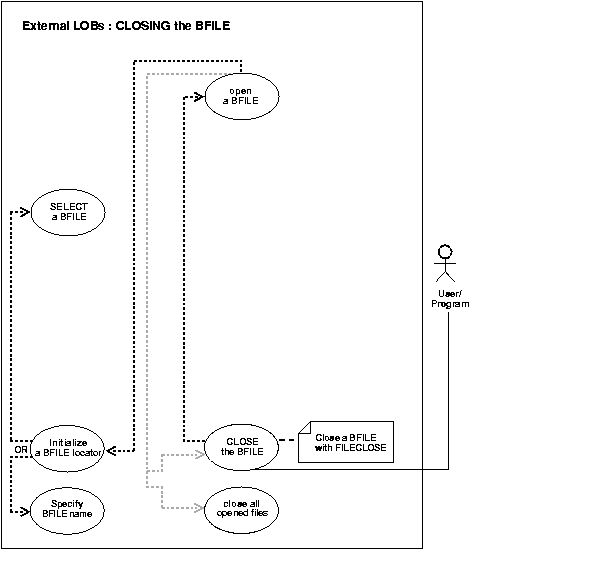
This procedure describes how to close a BFILE with FILECLOSE.
Although closing a BFILE with FILECLOSE is still supported, we strongly recommend that you use CLOSE instead. Doing so facilitates future extensibility.
See Chapter 3, "LOB Support in Different Programmatic Environments" for a list of available functions in each programmatic environment. Use the following syntax references for each programmatic environment:
This example closes a BFILE in ADPHOTO_DIR.
/* Closing a BFILE with FILECLOSE. [Example script: 4068.sql] Procedure closeBFILE_procOne is not part of DBMS_LOB package: */ CREATE OR REPLACE PROCEDURE closeBFILE_procOne IS File_loc BFILE := BFILENAME('ADPHOTO_DIR', 'keyboard_photo_3060_11001'); BEGIN DBMS_LOB.FILEOPEN(File_loc, DBMS_LOB.FILE_READONLY); /* ...Do some processing. */ DBMS_LOB.FILECLOSE(File_loc); END;
/* Closing a BFILE with FILECLOSE. [Example script: 4069.c] */ void BfileFileClose(envhp, errhp, svchp, stmthp) OCIEnv *envhp; OCIError *errhp; OCISvcCtx *svchp; OCIStmt *stmthp; { OCILobLocator *bfile_loc; /* Allocate the locator descriptors */ (void) OCIDescriptorAlloc((dvoid *) envhp, (dvoid **) &bfile_loc, (ub4) OCI_DTYPE_FILE, (size_t) 0, (dvoid **) 0); checkerr(errhp, OCILobFileSetName(envhp, errhp, &bfile_loc, (OraText *) "ADGRAPHIC_DIR", (ub2) strlen("ADGRAPHIC_ DIR"), (OraText *) "keyboard_graphic_3106_13001", (ub2) strlen("keyboard_graphic_3106_13001"))); checkerr(errhp, OCILobFileOpen(svchp, errhp, bfile_loc, (ub1) OCI_FILE_READONLY)); checkerr(errhp, OCILobFileClose(svchp, errhp, bfile_loc)); /* Free the locator descriptor */ OCIDescriptorFree((dvoid *)bfile_loc, (ub4)OCI_DTYPE_FILE); }
// Closing a BFILE with FILECLOSE. [Example script: 4071.java] import java.io.InputStream; import java.io.OutputStream; // Core JDBC classes: import java.sql.DriverManager; import java.sql.Connection; import java.sql.Statement; import java.sql.PreparedStatement; import java.sql.ResultSet; import java.sql.SQLException; // Oracle Specific JDBC classes: import oracle.sql.*; import oracle.jdbc.driver.*; public class Ex4_45 { public static void main (String args []) throws Exception { // Load the Oracle JDBC driver: DriverManager.registerDriver(new oracle.jdbc.driver.OracleDriver()); // Connect to the database: Connection conn = DriverManager.getConnection ("jdbc:oracle:oci8:@", "samp", "samp"); conn.setAutoCommit (false); // Create a Statement: Statement stmt = conn.createStatement (); try { BFILE src_lob = null; ResultSet rset = null; boolean result = false; rset = stmt.executeQuery ( "SELECT BFILENAME('ADGRAPHIC_DIR','keyboard_graphic_3106_11001') FROM DUAL"); if (rset.next()) { src_lob = ((OracleResultSet)rset).getBFILE (1); } result = src_lob.isFileOpen(); System.out.println( "result of fileIsOpen() before opening file : " + result); src_lob.openFile(); result = src_lob.isFileOpen(); System.out.println( "result of fileIsOpen() after opening file : " + result); // Close the BFILE, statement and connection: src_lob.closeFile(); stmt.close(); conn.commit(); conn.close(); } catch (SQLException e) { e.printStackTrace(); } } }
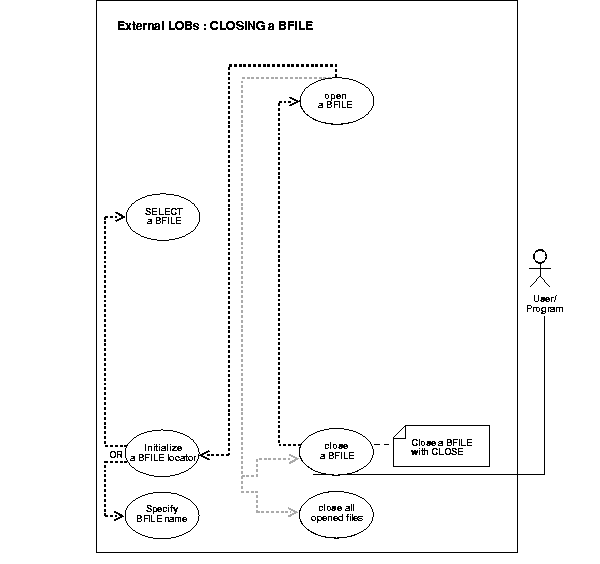
This procedure describes how to close a BFILE with CLOSE.
Use CLOSE in conjunction with OPEN.
See Chapter 3, "LOB Support in Different Programmatic Environments" for a list of available functions in each programmatic environment. Use the following syntax references for each programmatic environment:
These examples close a BFILE in ADGRAPHIC_DIR.
/* Closing a BFILE with CLOSE. [Example script: 4072.sql] Procedure closeBFILE_procTwo is not part of DBMS_LOB package: */ CREATE OR REPLACE PROCEDURE closeBFILE_procTwo IS File_loc BFILE := BFILENAME('ADGRAPHIC_DIR','keyboard_graphic_3060_11001'); BEGIN DBMS_LOB.OPEN(File_loc, DBMS_LOB.LOB_READONLY); /* ...Do some processing. */ DBMS_LOB.CLOSE(File_loc); END;
/* Closing a BFILE with CLOSE. [Example script: 4073.c] */ void BfileClose(envhp, errhp, svchp, stmthp) OCIEnv *envhp; OCIError *errhp; OCISvcCtx *svchp; OCIStmt *stmthp; { OCILobLocator *bfile_loc; /* Allocate the locator descriptors */ (void) OCIDescriptorAlloc((dvoid *) envhp, (dvoid **) &bfile_loc, (ub4) OCI_DTYPE_FILE, (size_t) 0, (dvoid **) 0); checkerr(errhp, OCILobFileSetName(envhp, errhp, &bfile_loc, (OraText *) "ADGRAPHIC_DIR", (ub2) strlen("ADGRAPHIC_DIR"), (OraText *) "keyboard_3106", (ub2) strlen("keyboard_3106"))); checkerr(errhp, OCILobOpen(svchp, errhp, bfile_loc, (ub1) OCI_LOB_READONLY)); checkerr(errhp, OCILobClose(svchp, errhp, bfile_loc)); /* Free the locator descriptor */ OCIDescriptorFree((dvoid *)bfile_loc, (ub4)OCI_DTYPE_FILE); }
* Closing a BFILE with CLOSE. [Example script: 4074.pco] IDENTIFICATION DIVISION. PROGRAM-ID. BFILE-CLOSE. ENVIRONMENT DIVISION. DATA DIVISION. WORKING-STORAGE SECTION. 01 USERID PIC X(11) VALUES "SAMP/SAMP". 01 BFILE1 SQL-BFILE. 01 DIR-ALIAS PIC X(30) VARYING. 01 FNAME PIC X(20) VARYING. 01 ORASLNRD PIC 9(4). EXEC SQL INCLUDE SQLCA END-EXEC. EXEC ORACLE OPTION (ORACA=YES) END-EXEC. EXEC SQL INCLUDE ORACA END-EXEC. PROCEDURE DIVISION. BFILE-CLOSE. EXEC SQL WHENEVER SQLERROR DO PERFORM SQL-ERROR END-EXEC. EXEC SQL CONNECT :USERID END-EXEC. * Allocate and initialize the BFILE locators: EXEC SQL ALLOCATE :BFILE1 END-EXEC. * Set up the directory and file information: MOVE "ADGRAPHIC_DIR" TO DIR-ALIAS-ARR. MOVE 9 TO DIR-ALIAS-LEN. MOVE "keyboard_graphic_3106_13001" TO FNAME-ARR. MOVE 13 TO FNAME-LEN. EXEC SQL LOB FILE SET :BFILE1 DIRECTORY = :DIR-ALIAS, FILENAME = :FNAME END-EXEC. EXEC SQL LOB OPEN :BFILE1 READ ONLY END-EXEC. * Close the LOB: EXEC SQL LOB CLOSE :BFILE1 END-EXEC. * And free the LOB locator: EXEC SQL FREE :BFILE1 END-EXEC. STOP RUN. SQL-ERROR. EXEC SQL WHENEVER SQLERROR CONTINUE END-EXEC. MOVE ORASLNR TO ORASLNRD. DISPLAY " ". DISPLAY "ORACLE ERROR DETECTED ON LINE ", ORASLNRD, ":". DISPLAY " ". DISPLAY SQLERRMC. EXEC SQL ROLLBACK WORK RELEASE END-EXEC. STOP RUN.
/* Closing a BFILE with CLOSE. [Example script: 4075.pc] Pro*C/C++ has only one form of CLOSE for BFILEs. Pro*C/C++ has no FILECLOSE statement. A simple CLOSE statement is used instead: */ #include <oci.h> #include <stdio.h> #include <sqlca.h> void Sample_Error() { EXEC SQL WHENEVER SQLERROR CONTINUE; printf("%.*s\n", sqlca.sqlerrm.sqlerrml, sqlca.sqlerrm.sqlerrmc); EXEC SQL ROLLBACK WORK RELEASE; exit(1); } void closeBFILE_proc() { OCIBFileLocator *Lob_loc; char *Dir = "ADGRAPHIC_DIR", *Name = "mousepad_graphic_2056_12001"; EXEC SQL WHENEVER SQLERROR DO Sample_Error(); EXEC SQL ALLOCATE :Lob_loc; EXEC SQL LOB FILE SET :Lob_loc DIRECTORY = :Dir, FILENAME = :Name; EXEC SQL LOB OPEN :Lob_loc READ ONLY; /* ... Do some processing */ EXEC SQL LOB CLOSE :Lob_loc; EXEC SQL FREE :Lob_loc; } void main() { char *samp = "samp/samp"; EXEC SQL CONNECT :samp; closeBFILE_proc(); EXEC SQL ROLLBACK WORK RELEASE; }
'Closing a BFILE with CLOSE. [Example script: 4076.txt Dim MySession As OraSession Dim OraDb As OraDatabase Dim OraDyn As OraDynaset, OraAdGraphic As OraBfile, amount_read%, chunksize%, chunk Set MySession = CreateObject("OracleInProcServer.XOraSession") Set OraDb = MySession.OpenDatabase("pmschema", "pm/pm", 0&) chunksize = 32767 Set OraDyn = OraDb.CreateDynaset("select * from Print_media", ORADYN_DEFAULT) Set OraAdGraphic = OraDyn.Fields("ad_graphic").Value If OraAdGraphic.IsOpen Then 'Process because the file is already open OraAdGraphic.Close End If
// Closing a BFILE with CLOSE. [Example script: 4077.java] import java.io.InputStream; import java.io.OutputStream; // Core JDBC classes: import java.sql.DriverManager; import java.sql.Connection; import java.sql.Statement; import java.sql.PreparedStatement; import java.sql.ResultSet; import java.sql.SQLException; // Oracle Specific JDBC classes: import oracle.sql.*; import oracle.jdbc.driver.*; public class Ex4_48 { public static void main (String args []) throws Exception { // Load the Oracle JDBC driver: DriverManager.registerDriver(new oracle.jdbc.driver.OracleDriver()); // Connect to the database: Connection conn = DriverManager.getConnection ("jdbc:oracle:oci8:@", "samp", "samp"); conn.setAutoCommit (false); // Create a Statement: Statement stmt = conn.createStatement (); try { BFILE src_lob = null; ResultSet rset = null; rset = stmt.executeQuery ( "SELECT BFILENAME('ADGRAPHIC_DIR', 'keyboard_graphic_3106_13001') FROM DUAL"); OracleCallableStatement cstmt = null; if (rset.next()) { src_lob = ((OracleResultSet)rset).getBFILE (1); cstmt = (OracleCallableStatement)conn.prepareCall ("begin dbms_lob.open (?,dbms_lob.lob_readonly); end;"); cstmt.registerOutParameter(1,OracleTypes.BFILE); cstmt.setBFILE (1, src_lob); cstmt.execute(); src_lob = cstmt.getBFILE(1); System.out.println ("the file is now open"); } // Close the BFILE, statement and connection: cstmt = (OracleCallableStatement) conn.prepareCall ("begin dbms_lob.close(?); end;"); cstmt.setBFILE(1,src_lob); cstmt.execute(); stmt.close(); conn.commit(); conn.close(); } catch (SQLException e) { e.printStackTrace(); } } }
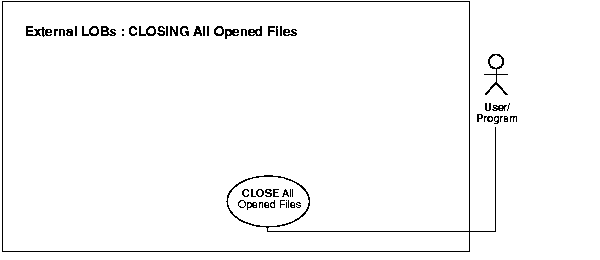
| See Also:
Table 12-1, "Use Case Model: External LOBs (BFILEs)", for all basic operations of Internal Temporary LOBs |
It is the user's responsibility to close any opened file(s) after normal or abnormal termination of a PL/SQL program block or OCI program. So, for instance, for every DBMS_LOB.FILEOPEN() or DBMS_LOB.OPEN() call on a BFILE, there must be a matching DBMS_LOB.FILECLOSE() or DBMS_LOB.CLOSE() call. You should close open files before the termination of a PL/SQL block or OCI program, and also in situations that have raised errors. The exception handler should make provision to close any files that were opened before the occurrence of the exception or abnormal termination.
If this is not done, Oracle considers these files unclosed.
This procedure describes how to close all BFILEs.
Not applicable.
See Chapter 3, "LOB Support in Different Programmatic Environments" for a list of available functions in each programmatic environment. Use the following syntax references for each programmatic environment:
Not applicable.
/* Closing all open BFILEs. [Example script: 4078.sql] Procedure closeAllOpenFilesBFILE_proc is not part of DBMS_LOB package: */ CREATE OR REPLACE PROCEDURE closeAllOpenFilesBFILE_proc IS BEGIN /* Close all open BFILEs: */ DBMS_LOB.FILECLOSEALL; END;
/* Closing all open BFILEs. [Example script: 4079.c] */ void BfileCloseAll(envhp, errhp, svchp, stmthp) OCIEnv *envhp; OCIError *errhp; OCISvcCtx *svchp; OCIStmt *stmthp; { OCILobLocator *bfile_loc1; OCILobLocator *bfile_loc2; /* Allocate the locator descriptors */ (void) OCIDescriptorAlloc((dvoid *) envhp, (dvoid **) &bfile_loc1, (ub4) OCI_DTYPE_FILE, (size_t) 0, (dvoid **) 0); (void) OCIDescriptorAlloc((dvoid *) envhp, (dvoid **) &bfile_loc2, (ub4) OCI_DTYPE_FILE, (size_t) 0, (dvoid **) 0); checkerr(errhp, OCILobFileSetName(envhp, errhp, &bfile_loc1, (OraText *) "ADGRAPHIC_DIR", (ub2) strlen("ADGRAPHIC_DIR"), (OraText *) "keyboard_graphic_3106_13001", (ub2) strlen("keyboard_graphic_3106_13001"))); checkerr(errhp, OCILobFileSetName(envhp, errhp, &bfile_loc2, (OraText *) "ADGRAPHIC_DIR", (ub2) strlen("ADGRAPHIC_DIR"), (OraText *) "monitor_graphic_3060_11001", (ub2) strlen("monitor_graphic_306_11001"))); checkerr(errhp, OCILobFileOpen(svchp, errhp, bfile_loc1, (ub1) OCI_LOB_READONLY)); checkerr(errhp, OCILobFileOpen(svchp, errhp, bfile_loc2, (ub1) OCI_LOB_READONLY)); checkerr(errhp, OCILobFileCloseAll(svchp, errhp)); /* Free the locator descriptor */ OCIDescriptorFree((dvoid *)bfile_loc1, (ub4)OCI_DTYPE_FILE); OCIDescriptorFree((dvoid *)bfile_loc2, (ub4)OCI_DTYPE_FILE); }
* Closing all open BFILEs. [Example script: 4080.pco] IDENTIFICATION DIVISION. PROGRAM-ID. BFILE-CLOSE-ALL. ENVIRONMENT DIVISION. DATA DIVISION. WORKING-STORAGE SECTION. 01 USERID PIC X(11) VALUES "SAMP/SAMP". 01 BFILE1 SQL-BFILE. 01 BFILE2 SQL-BFILE. 01 DIR-ALIAS1 PIC X(30) VARYING. 01 FNAME1 PIC X(20) VARYING. 01 DIR-ALIAS2 PIC X(30) VARYING. 01 FNAME2 PIC X(20) VARYING. 01 ORASLNRD PIC 9(4). EXEC SQL INCLUDE SQLCA END-EXEC. EXEC ORACLE OPTION (ORACA=YES) END-EXEC. EXEC SQL INCLUDE ORACA END-EXEC. PROCEDURE DIVISION. BFILE-CLOSE-ALL. EXEC SQL WHENEVER SQLERROR DO PERFORM SQL-ERROR END-EXEC. EXEC SQL CONNECT :USERID END-EXEC. * Allocate the BFILEs: EXEC SQL ALLOCATE :BFILE1 END-EXEC. EXEC SQL ALLOCATE :BFILE2 END-EXEC. * Set up the directory and file information: MOVE "ADGRAPHIC_DIR" TO DIR-ALIAS1-ARR. MOVE 9 TO DIR-ALIAS1-LEN. MOVE "keyboard_graphic_3106_13001" TO FNAME1-ARR. MOVE 16 TO FNAME1-LEN. EXEC SQL LOB FILE SET :BFILE1 DIRECTORY = :DIR-ALIAS1, FILENAME = :FNAME1 END-EXEC. EXEC SQL LOB OPEN :BFILE1 READ ONLY END-EXEC. * Set up the directory and file information: MOVE "ADGRAPHIC_DIR" TO DIR-ALIAS2-ARR. MOVE 9 TO DIR-ALIAS2-LEN. MOVE "mousepad_graphic_2056_12001" TO FNAME2-ARR. MOVE 13 TO FNAME2-LEN. EXEC SQL LOB FILE SET :BFILE2 DIRECTORY = :DIR-ALIAS2, FILENAME = :FNAME2 END-EXEC. EXEC SQL LOB OPEN :BFILE2 READ ONLY END-EXEC. * Close both BFILE1 and BFILE2: EXEC SQL LOB FILE CLOSE ALL END-EXEC. STOP RUN. SQL-ERROR. EXEC SQL WHENEVER SQLERROR CONTINUE END-EXEC. MOVE ORASLNR TO ORASLNRD. DISPLAY " ". DISPLAY "ORACLE ERROR DETECTED ON LINE ", ORASLNRD, ":". DISPLAY " ". DISPLAY SQLERRMC. EXEC SQL ROLLBACK WORK RELEASE END-EXEC. STOP RUN.
/* Closing all open BFILEs. [Example script: 4081.pc] */ #include <oci.h> #include <stdio.h> #include <sqlca.h> void Sample_Error() { EXEC SQL WHENEVER SQLERROR CONTINUE; printf("%.*s\n", sqlca.sqlerrm.sqlerrml, sqlca.sqlerrm.sqlerrmc); EXEC SQL ROLLBACK WORK RELEASE; exit(1); } void closeAllOpenBFILEs_proc() { OCIBFileLocator *Lob_loc1, *Lob_loc2; EXEC SQL WHENEVER SQLERROR DO Sample_Error(); EXEC SQL ALLOCATE :Lob_loc1; EXEC SQL ALLOCATE :Lob_loc2; /* Populate the Locators: */ EXEC SQL SELECT ad_graphic INTO :Lob_loc1 FROM Print_media WHERE product_id = 2056 AND ad_id = 12001; EXEC SQL SELECT Mtab.ad_graphic INTO Lob_loc2 FROM Print_media PMtab WHERE PMtab.product_id = 3060 AND ad_id = 11001; /* Open both BFILEs: */ EXEC SQL LOB OPEN :Lob_loc1 READ ONLY; EXEC SQL LOB OPEN :Lob_loc2 READ ONLY; /* Close all open BFILEs: */ EXEC SQL LOB FILE CLOSE ALL; /* Free resources held by the Locators: */ EXEC SQL FREE :Lob_loc1; EXEC SQL FREE :Lob_loc2; } void main() { char *samp = "samp/samp"; EXEC SQL CONNECT :samp; closeAllOpenBFILEs_proc(); EXEC SQL ROLLBACK WORK RELEASE; }
'Closing all open BFILEs. [Example script: 4083.txt] Dim OraParameters as OraParameters, OraAdGraphic as OraBFile OraConnection.BeginTrans Set OraParameters = OraDatabase.Parameters 'Define in out parameter of BFILE type: OraParameters.Add "MyAdGraphic", Null,ORAPARAM_BOTH,ORATYPE_BFILE 'Select the ad graphic BFile for product_id 2268: OraDatabase.ExecuteSQL("Begin SELECT ad_graphic INTO :MyAdGraphic FROM Print_media WHERE product_id = 2268 AND ad_id = 21001; END; " ) 'Get the BFile ad_graphic column: set OraAdGraphic = OraParameters("MyAdGraphic").Value 'Open the OraAdGraphic: OraAdGraphic.Open 'Do some processing on OraAdGraphic 'Close all the BFILEs associated with OraAdGraphic: OraAdGraphic.CloseAll
// Closing all open BFILEs. [Example script: 4084.java] import java.io.InputStream; import java.io.OutputStream; // Core JDBC classes: import java.sql.DriverManager; import java.sql.Connection; import java.sql.Types; import java.sql.Statement; import java.sql.PreparedStatement; import java.sql.ResultSet; import java.sql.SQLException; // Oracle Specific JDBC classes: import oracle.sql.*; import oracle.jdbc.driver.*; public class Ex4_66 { static final int MAXBUFSIZE = 32767; public static void main (String args []) throws Exception { // Load the Oracle JDBC driver: DriverManager.registerDriver(new oracle.jdbc.driver.OracleDriver()); // Connect to the database: Connection conn = DriverManager.getConnection ("jdbc:oracle:oci8:@", "samp", "samp"); // It's faster when auto commit is off: conn.setAutoCommit (false); // Create a Statement: Statement stmt = conn.createStatement (); try { BFILE lob_loc1 = null; BFILE lob_loc2 = null; ResultSet rset = null; OracleCallableStatement cstmt = null; rset = stmt.executeQuery ( "SELECT ad_graphic FROM Print_media WHERE product_id = 3106 AND ad_id = 13001"); if (rset.next()) { lob_loc1 = ((OracleResultSet)rset).getBFILE (1); } rset = stmt.executeQuery ( "SELECT BFILENAME('ADGRAPHIC_DIR', 'keyboard_graphic_3106_13001') FROM DUAL"); if (rset.next()) { lob_loc2 = ((OracleResultSet)rset).getBFILE (1); } cstmt = (OracleCallableStatement) conn.prepareCall ( "BEGIN DBMS_LOB.FILEOPEN(?,DBMS_LOB.LOB_READONLY); END;"); // Open the first LOB: cstmt.setBFILE(1, lob_loc1); cstmt.execute(); cstmt = (OracleCallableStatement) conn.prepareCall ( "BEGIN DBMS_LOB.FILEOPEN(?,DBMS_LOB.LOB_READONLY); END;"); // Use the same CallableStatement to open the second LOB: cstmt.setBFILE(1, lob_loc2); cstmt.execute(); lob_loc1.openFile (); lob_loc2.openFile (); // Compare MAXBUFSIZE bytes starting at the first byte of // both lob_loc1 and lob_loc2: cstmt = (OracleCallableStatement) conn.prepareCall ( "BEGIN ? := DBMS_LOB.COMPARE(?, ?, ?, 1, 1); END;"); cstmt.registerOutParameter (1, Types.NUMERIC); cstmt.setBFILE(2, lob_loc1); cstmt.setBFILE(3, lob_loc2); cstmt.setInt(4, MAXBUFSIZE); cstmt.execute(); int result = cstmt.getInt(1); System.out.println("Comparison result: " + Integer.toString(result)); // Close all BFILEs: stmt.execute("BEGIN DBMS_LOB.FILECLOSEALL; END;"); stmt.close(); cstmt.close(); conn.commit(); conn.close(); } catch (SQLException e) { e.printStackTrace(); } } }
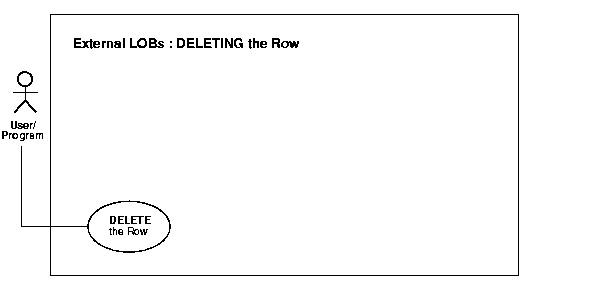
| See Also:
Table 12-1, "Use Case Model: External LOBs (BFILEs)", for all basic operations of Internal Temporary LOBs |
This procedure describes how to DELETE the row of a table containing a BFILE.
Unlike internal persistent LOBs, the LOB value in a BFILE does not get deleted by using SQL DDL or SQL DML commands -- only the BFILE locator is deleted. Deletion of a record containing a BFILE column amounts to de-linking that record from an existing file, not deleting the physical operating system file itself. An SQL DELETE statement on a particular row deletes the BFILE locator for the particular row, thereby removing the reference to the operating system file.
See the following syntax reference:
The following DELETE, DROP TABLE, or TRUNCATE TABLE statements delete the row, and hence the BFILE locator that refers to the advertisement graphic image for the product with product_id 3106 and ad_id 13001, but do not delete the operating system file for the graphic image.
The following examples are provided in SQL and apply to all programmatic environments:
/* Deleting the row of a table containing a BFILE [Example script: 4085.sql] */ DELETE FROM Print_media WHERE product_id = 3106 AND ad_id = 13001; DROP TABLE Multimedia_tab; TRUNCATE TABLE Multimedia_tab;
|
 Copyright © 1996, 2002 Oracle Corporation. All Rights Reserved. |
|